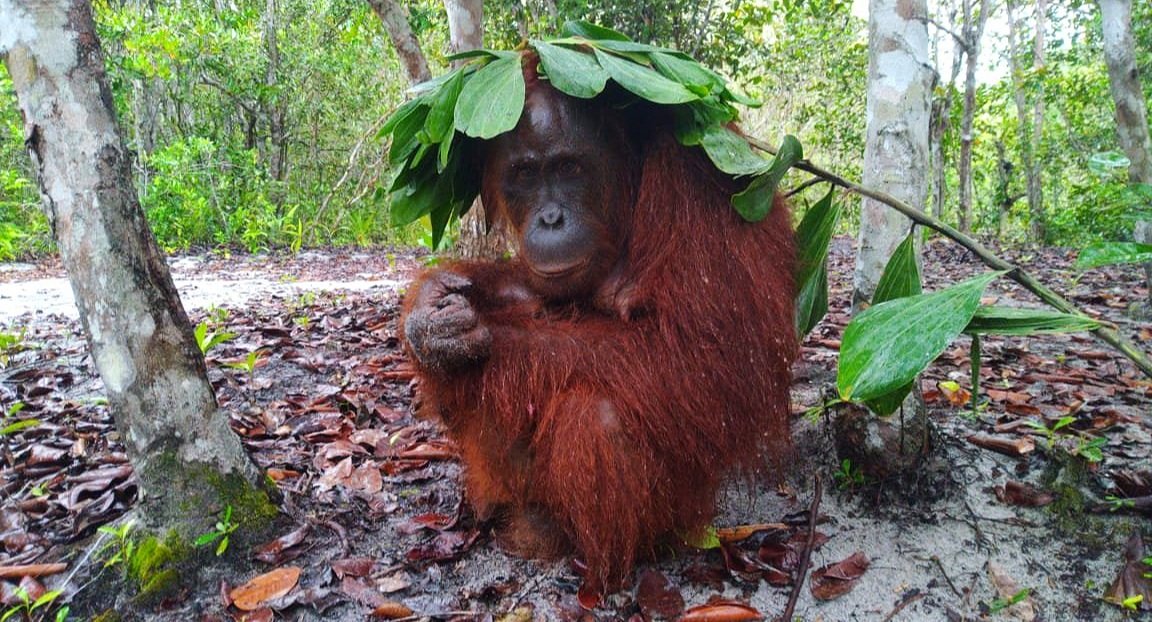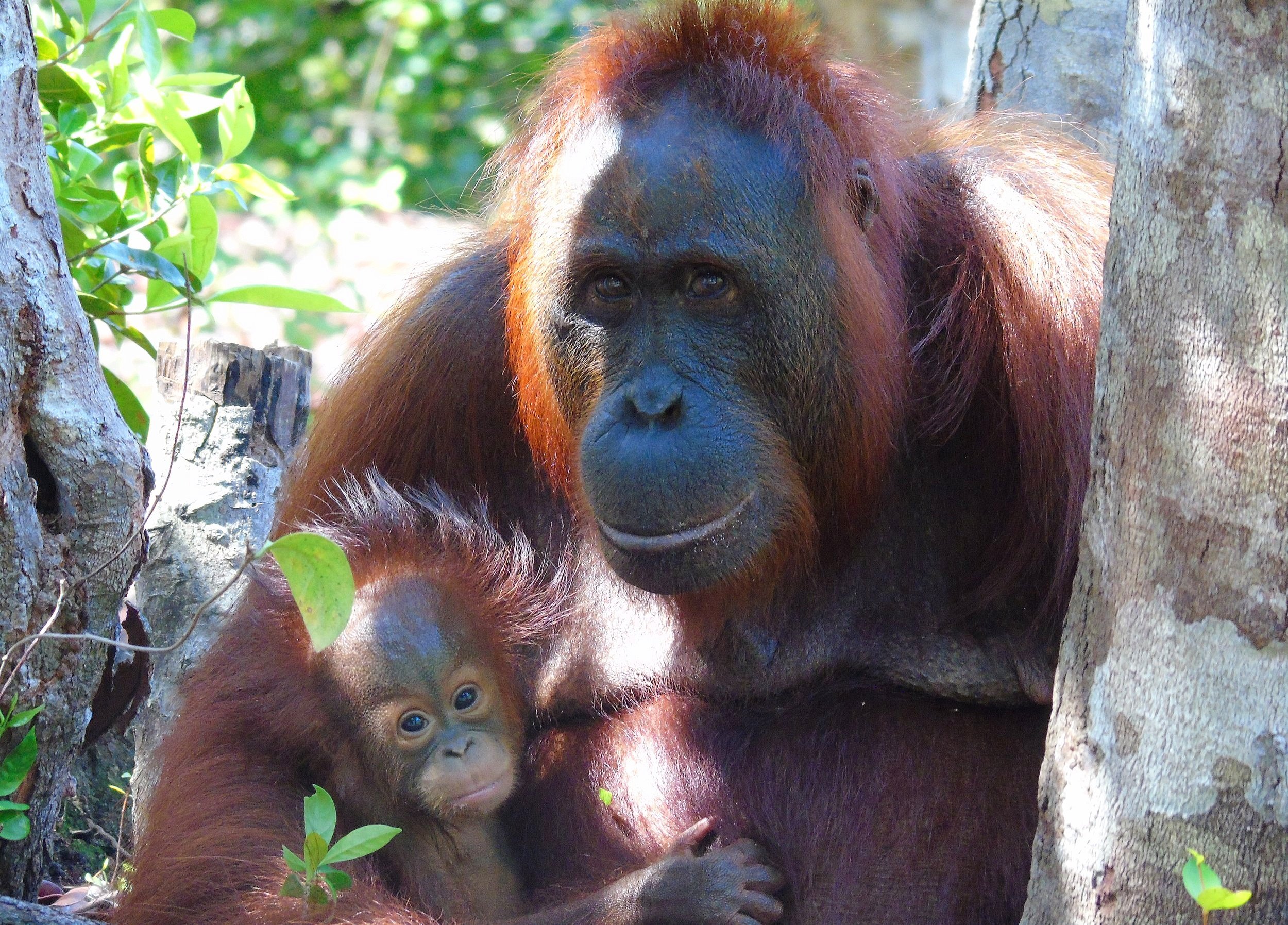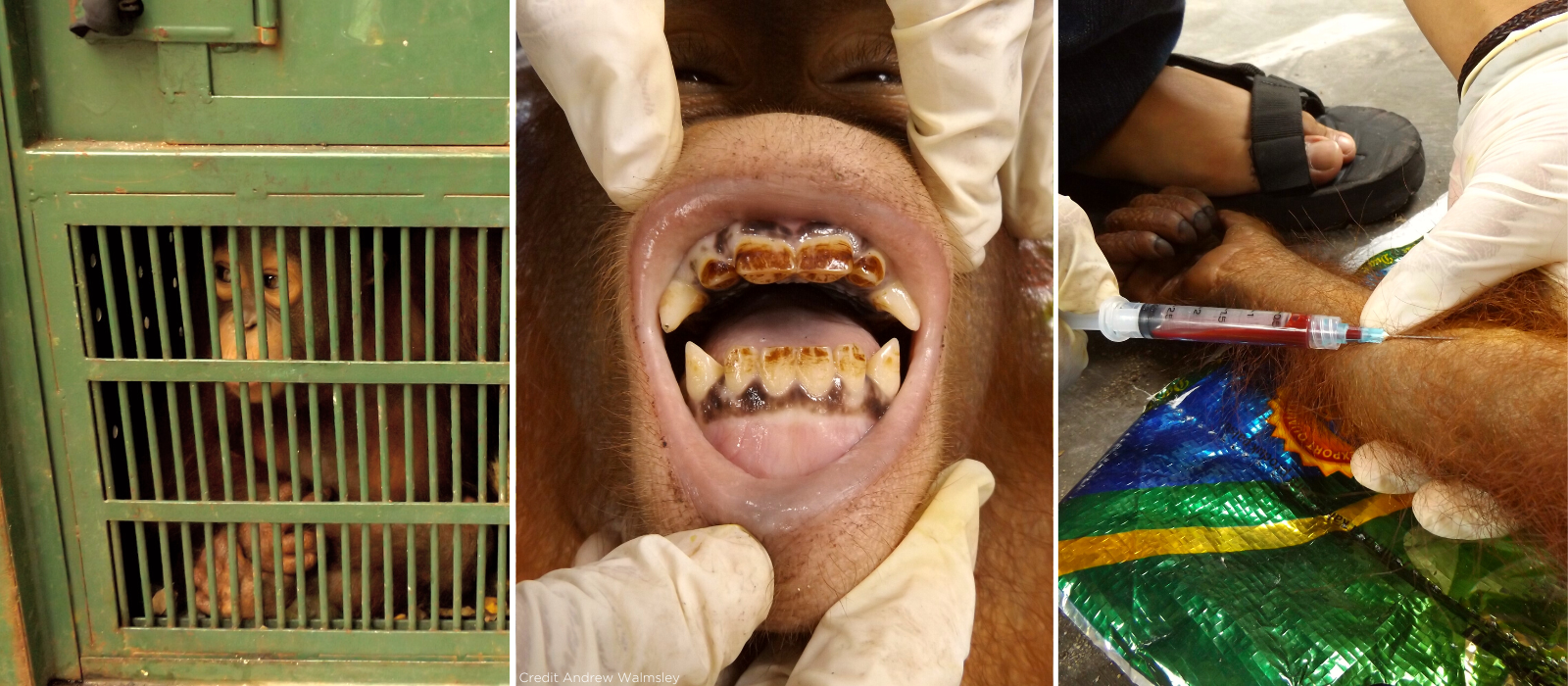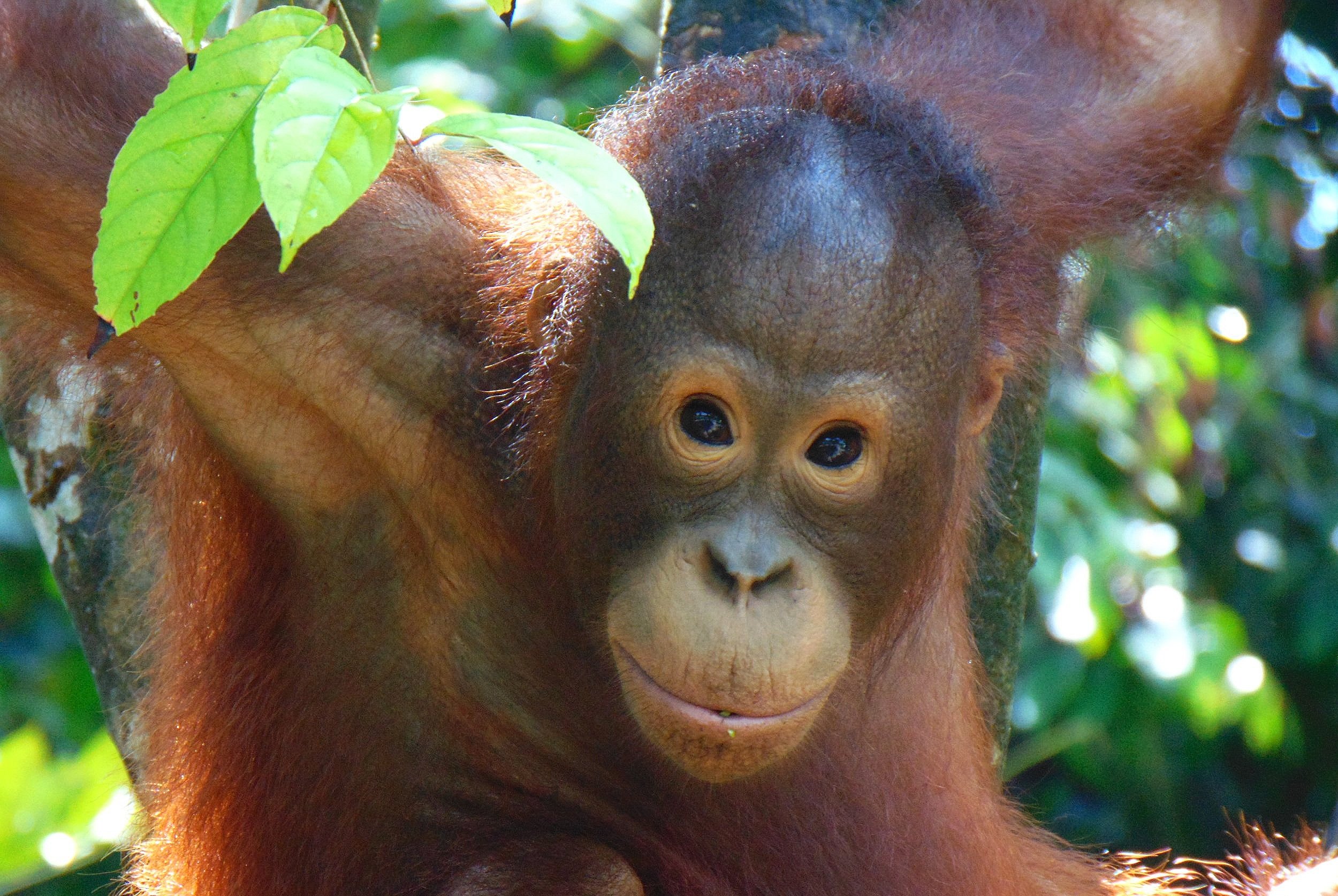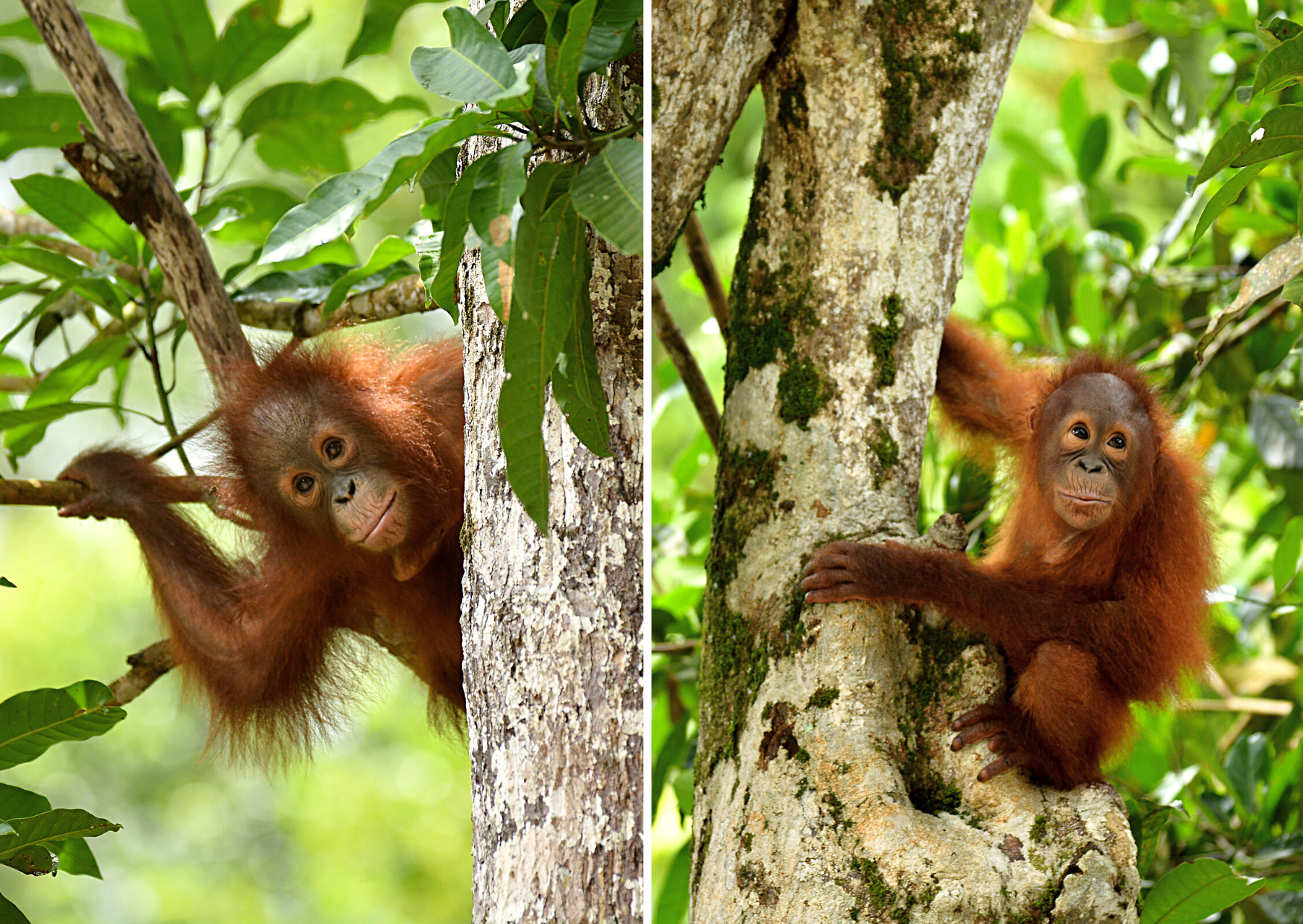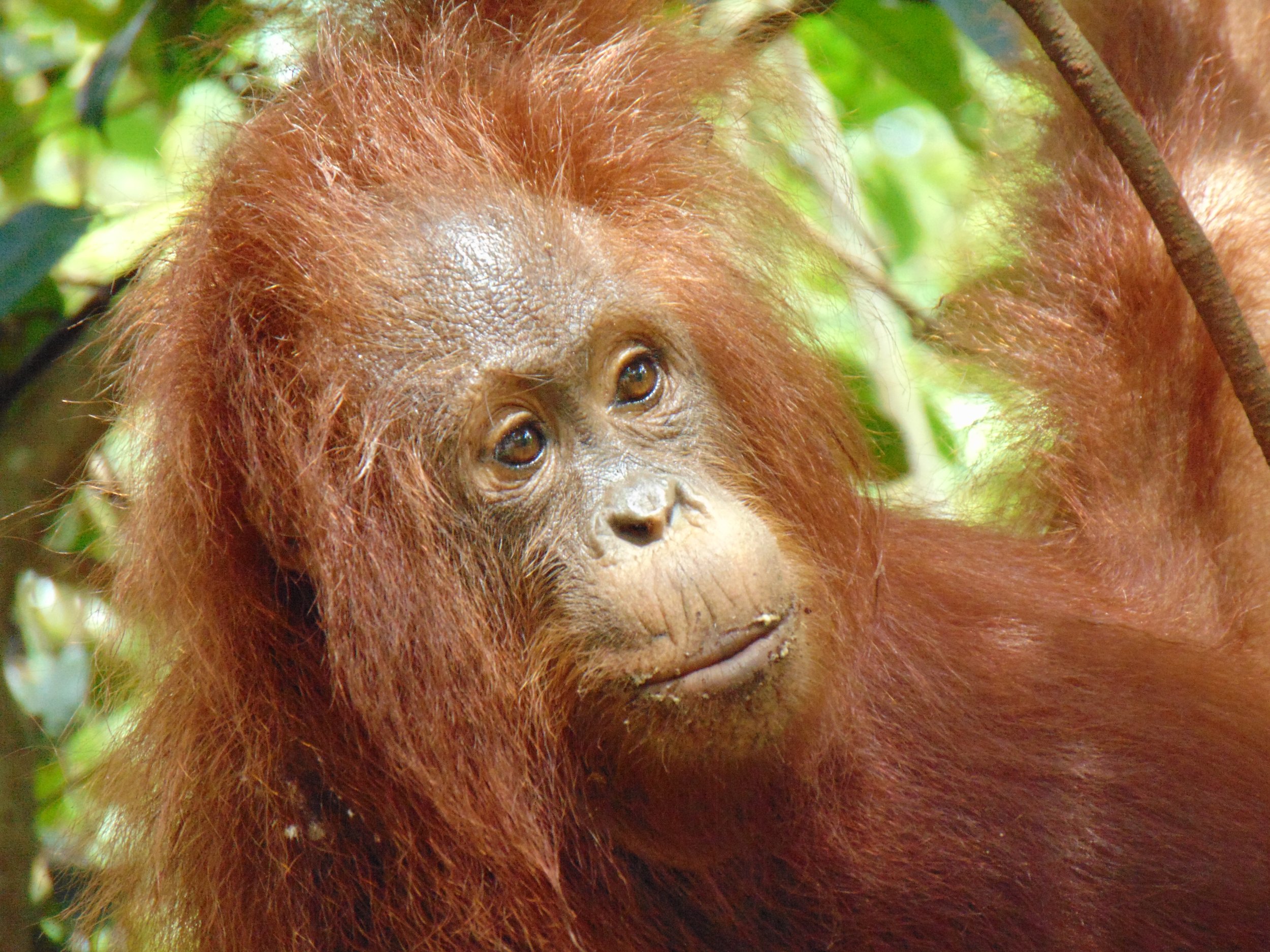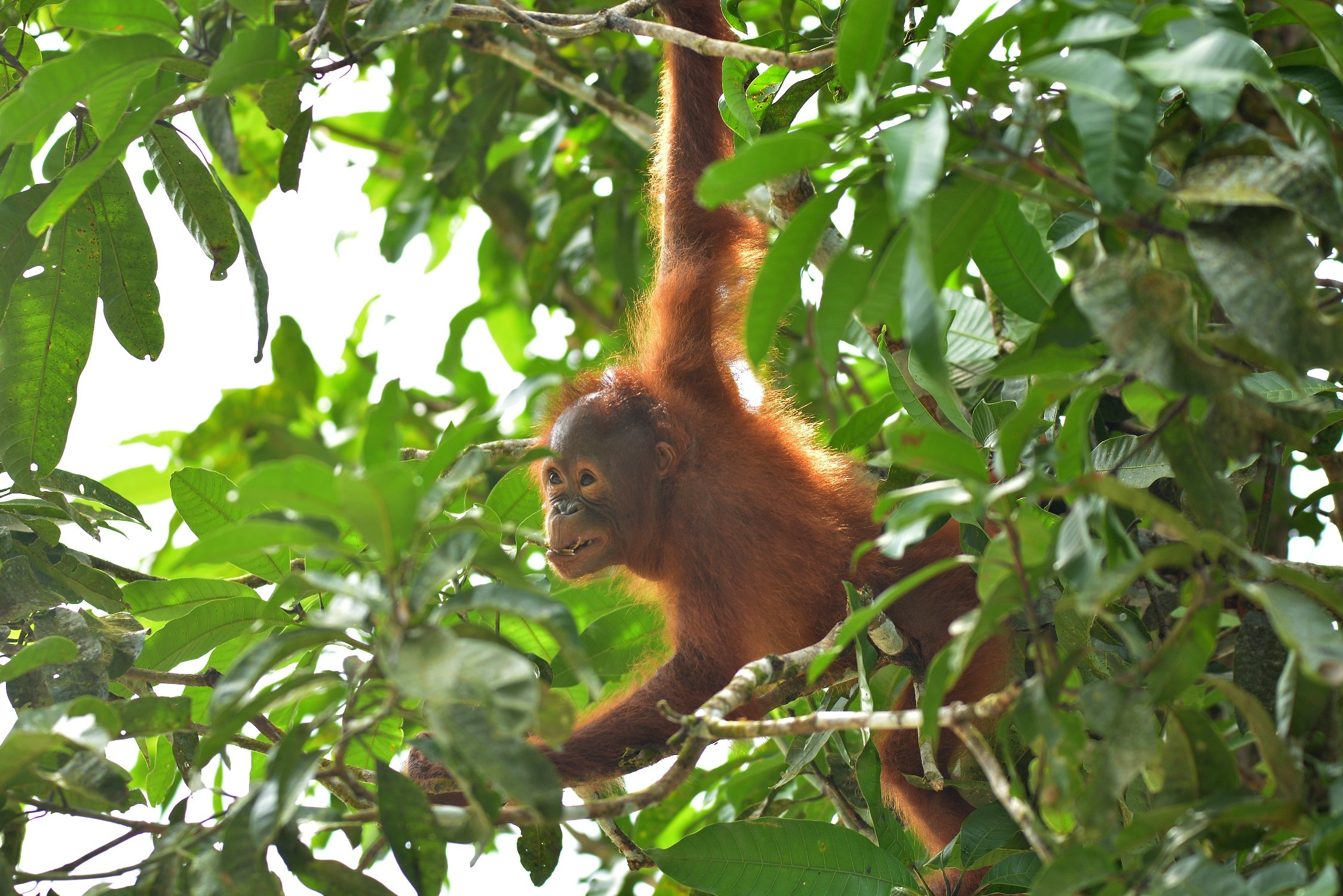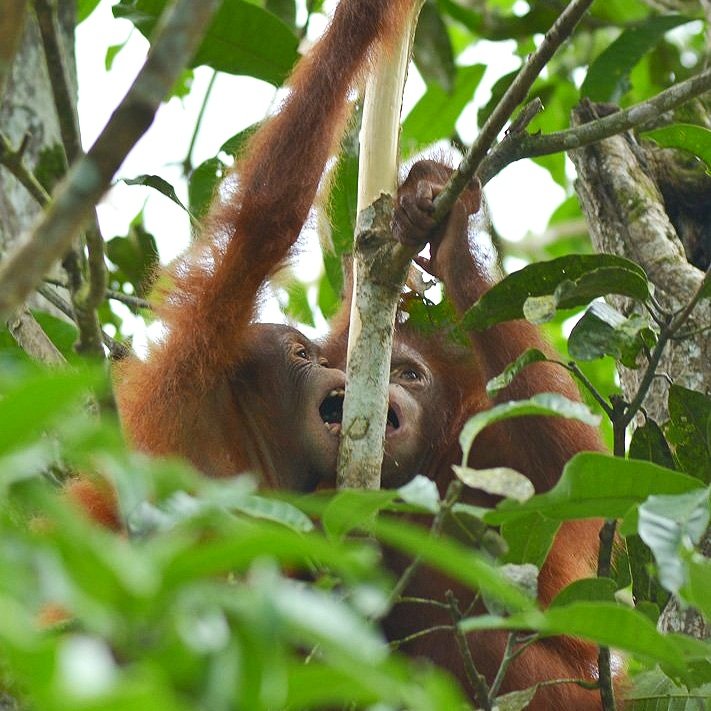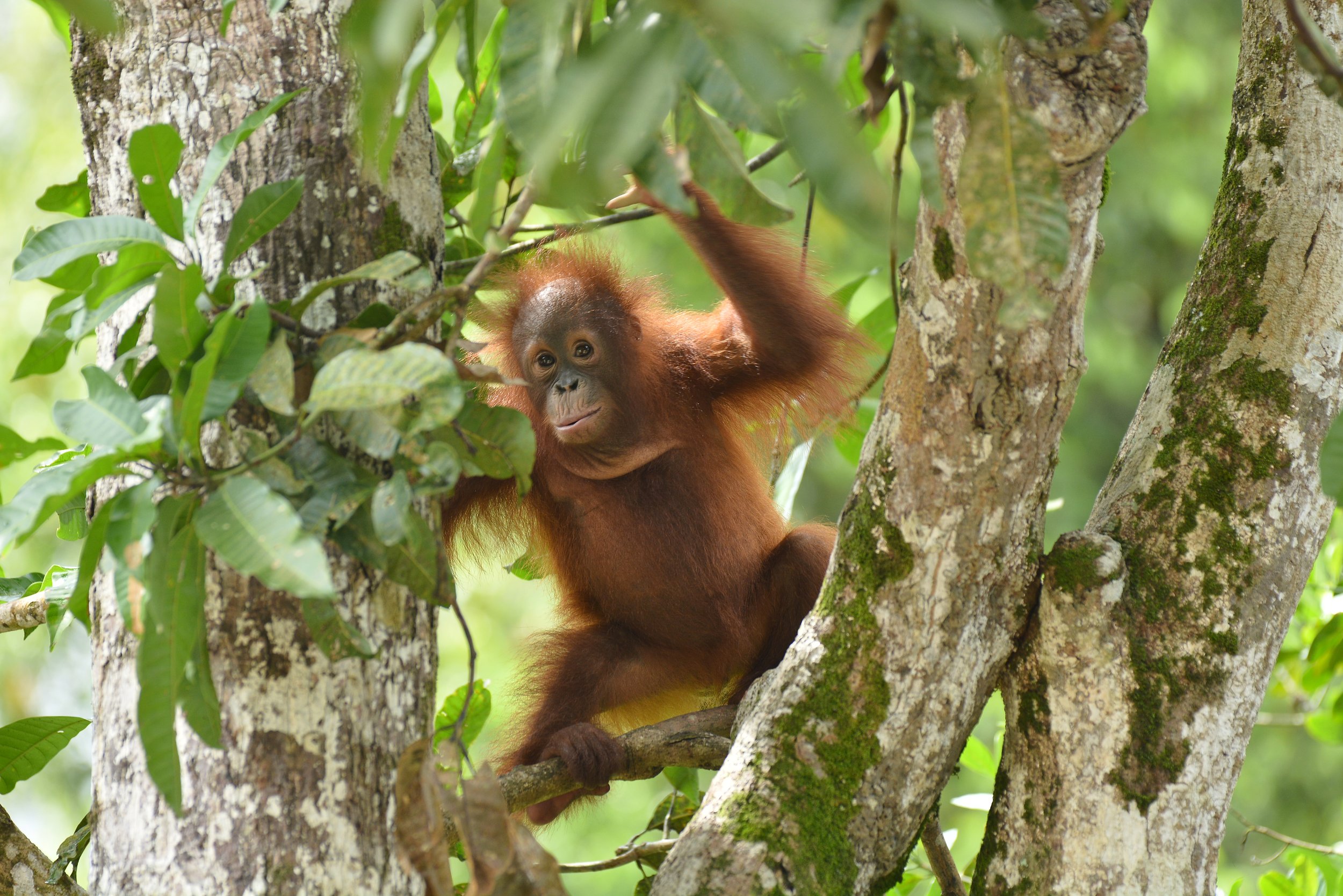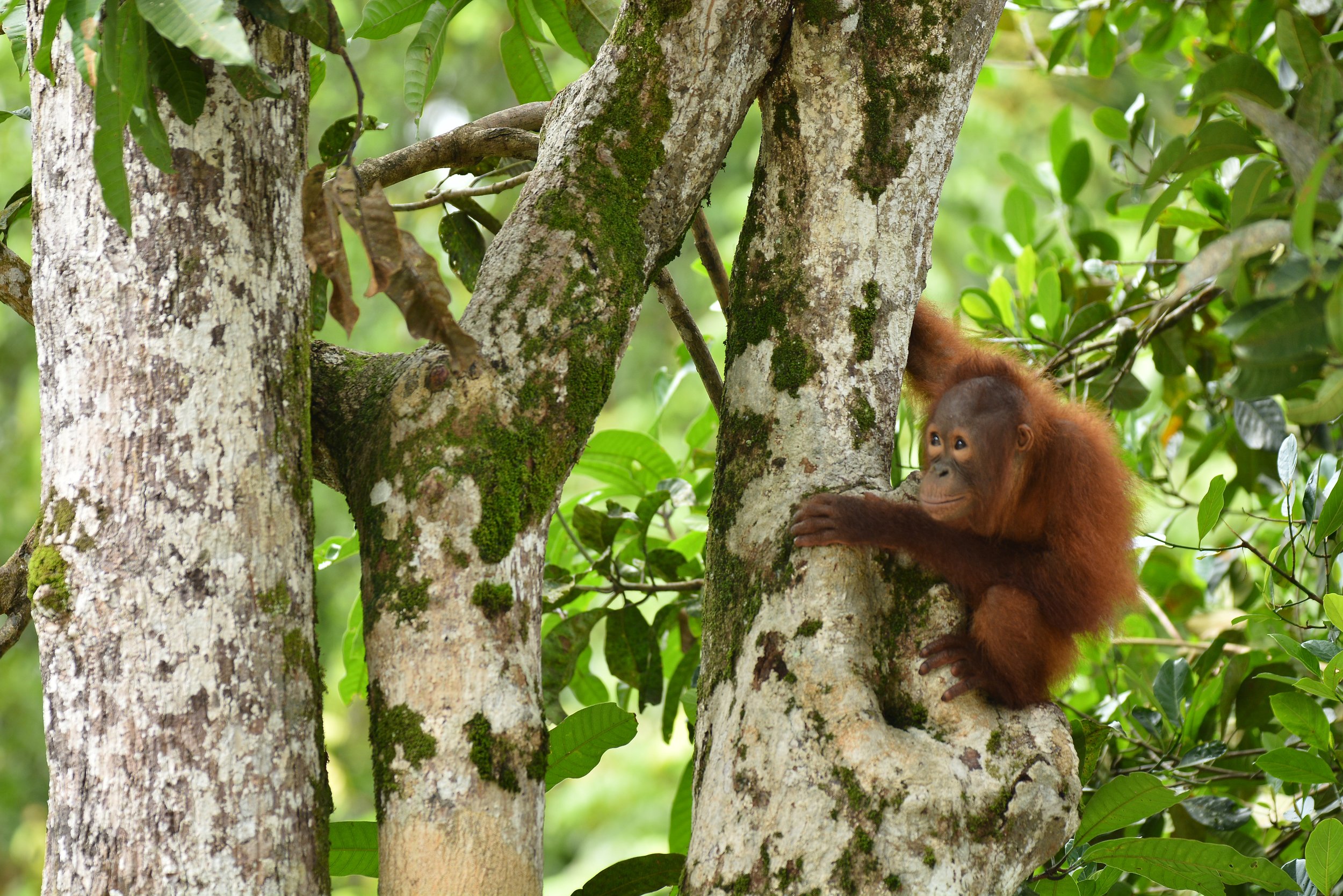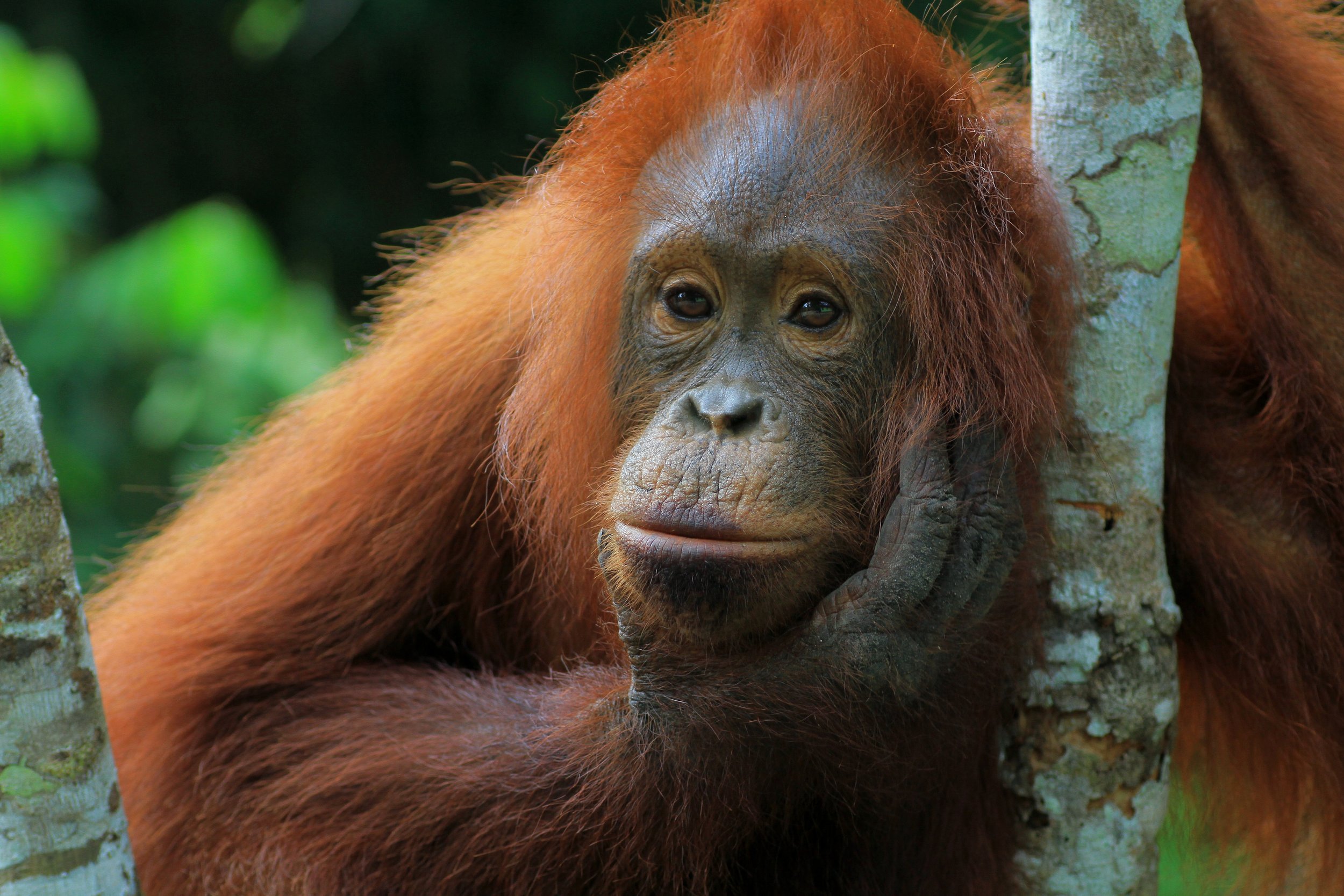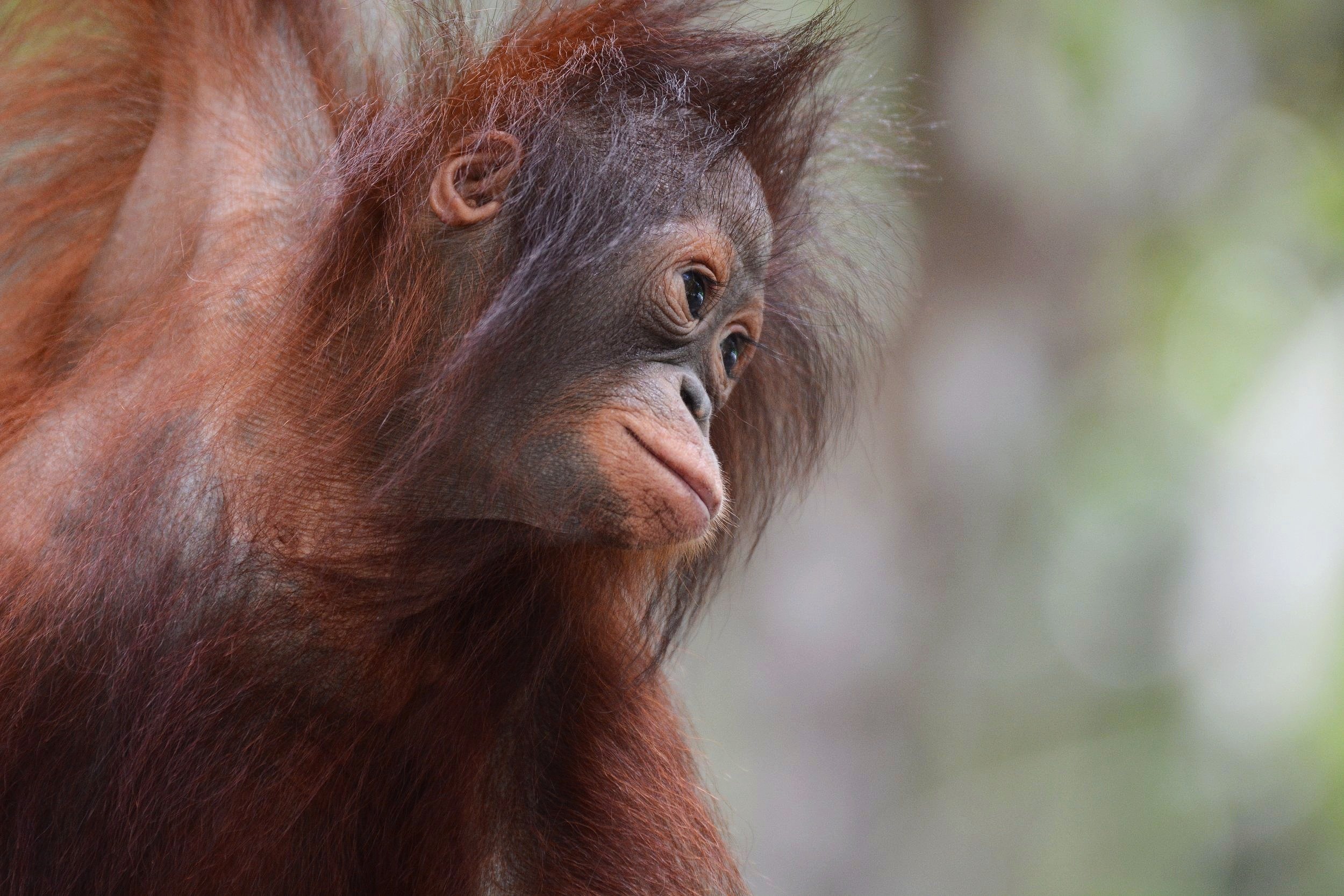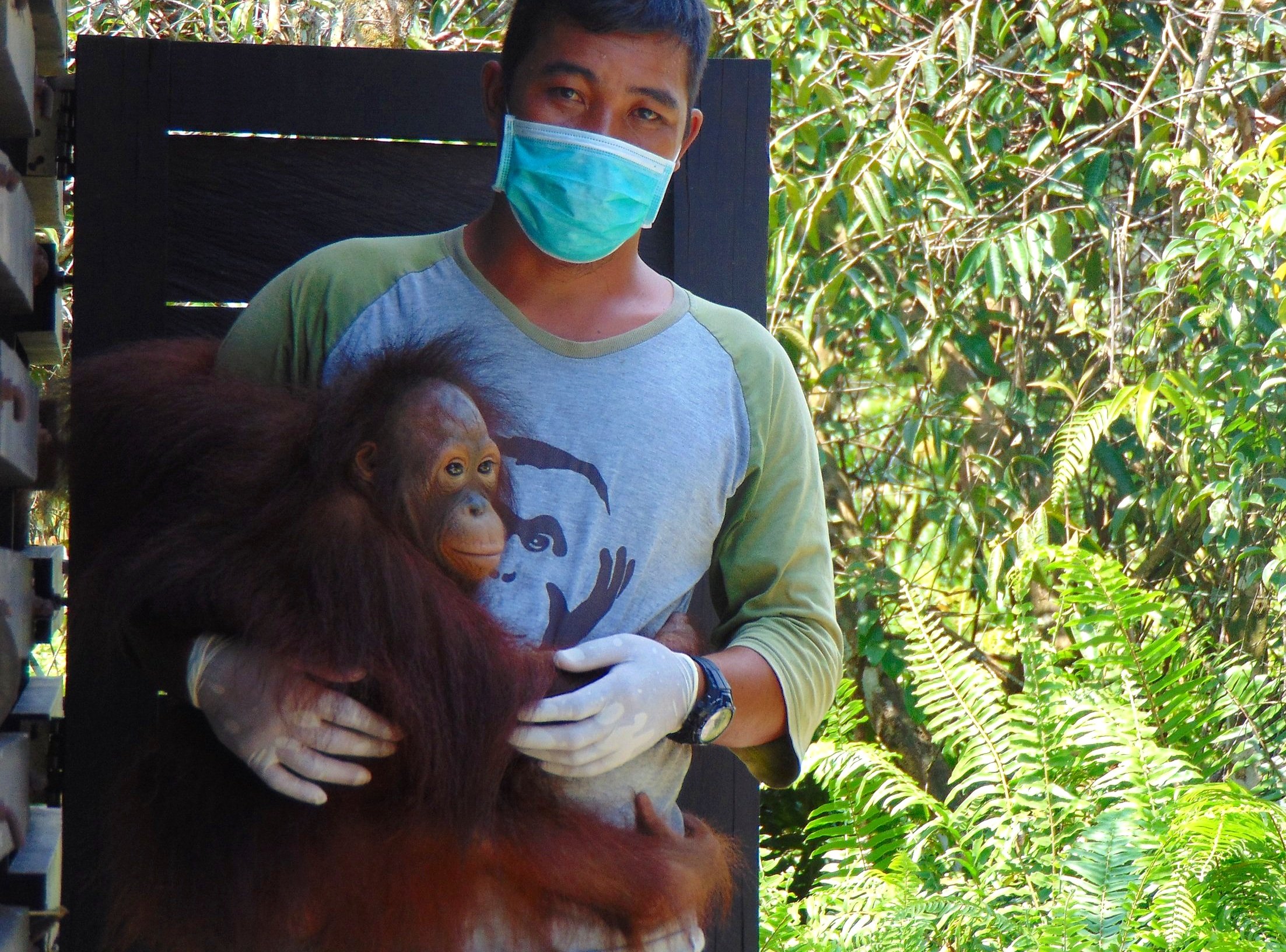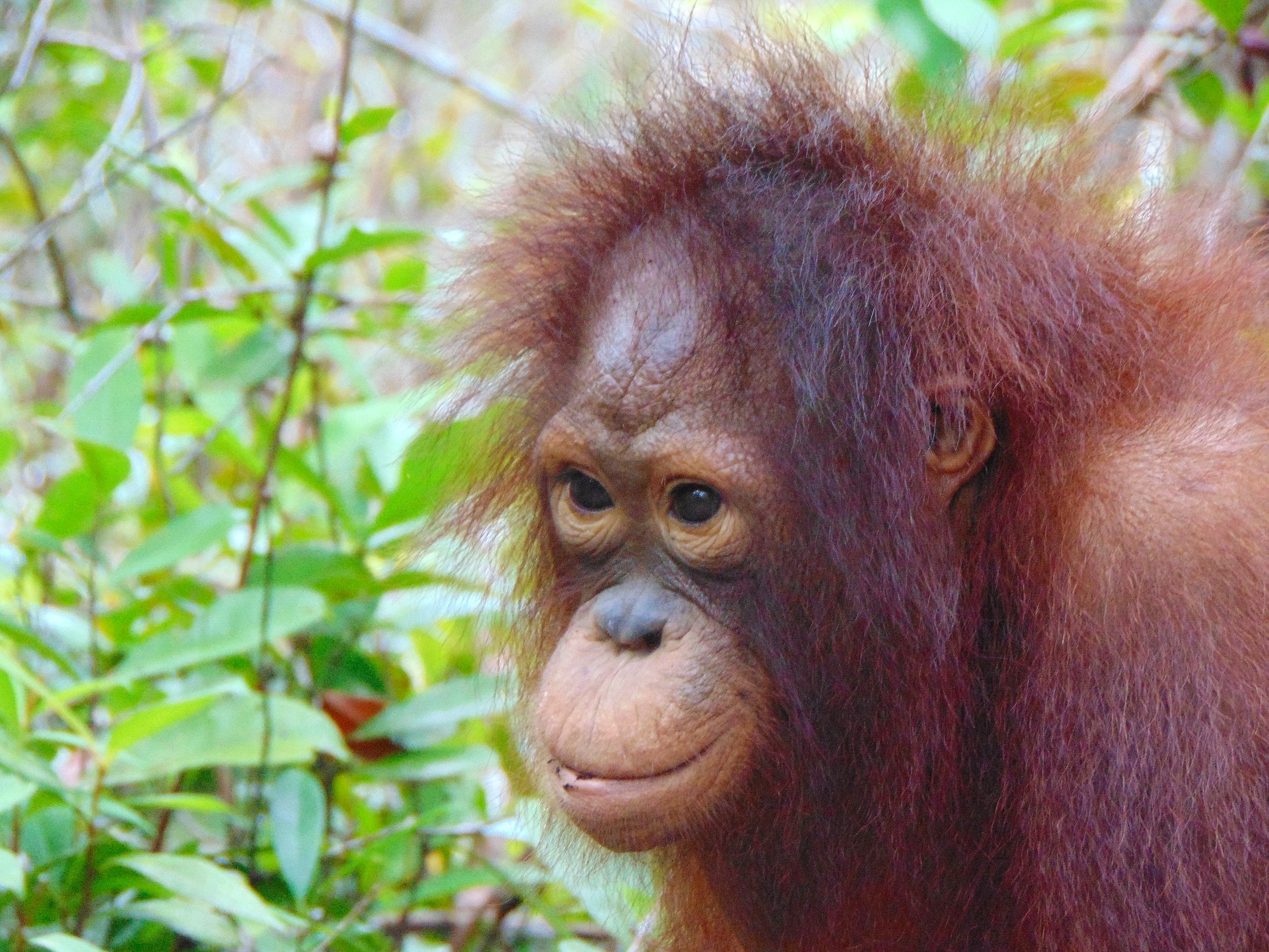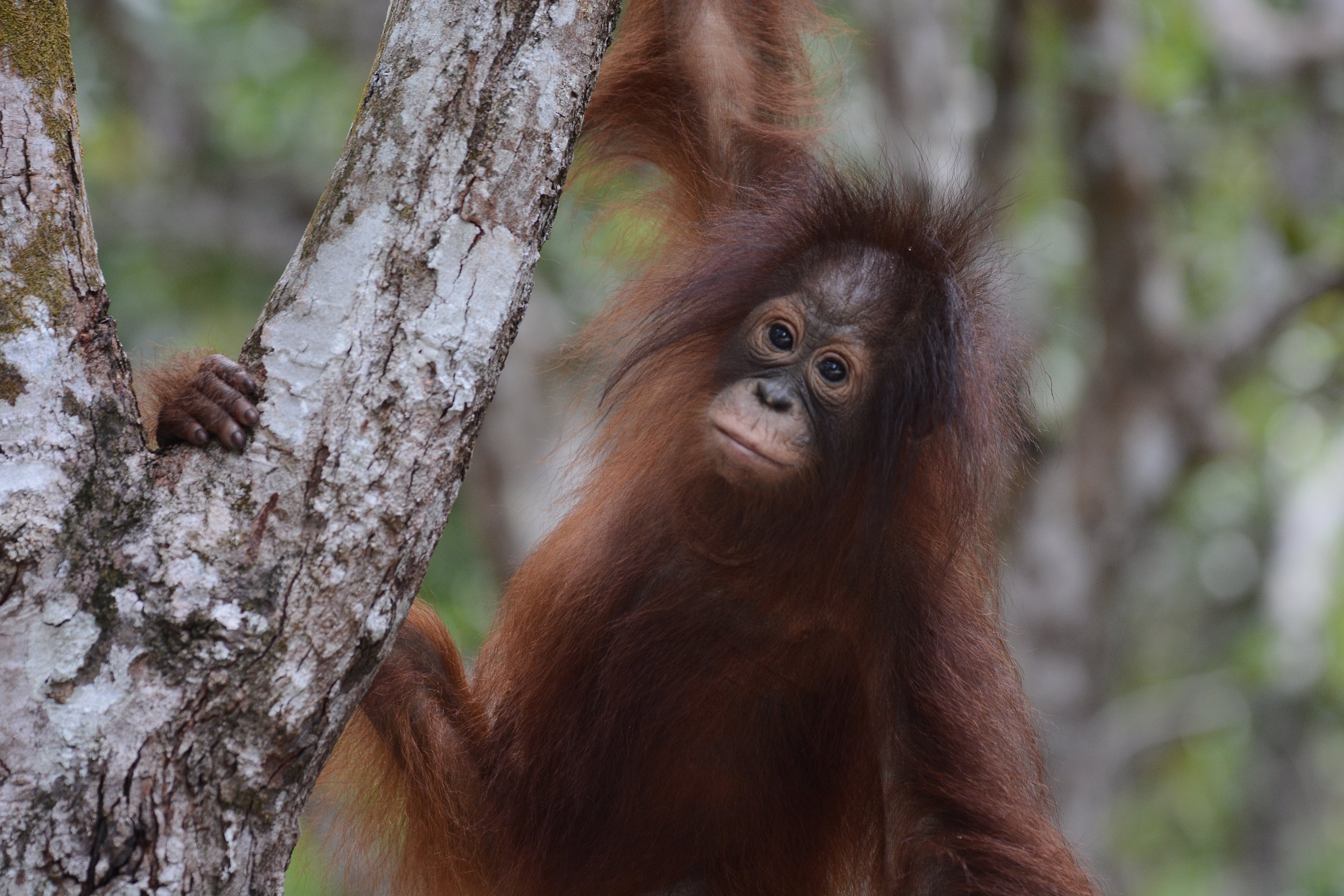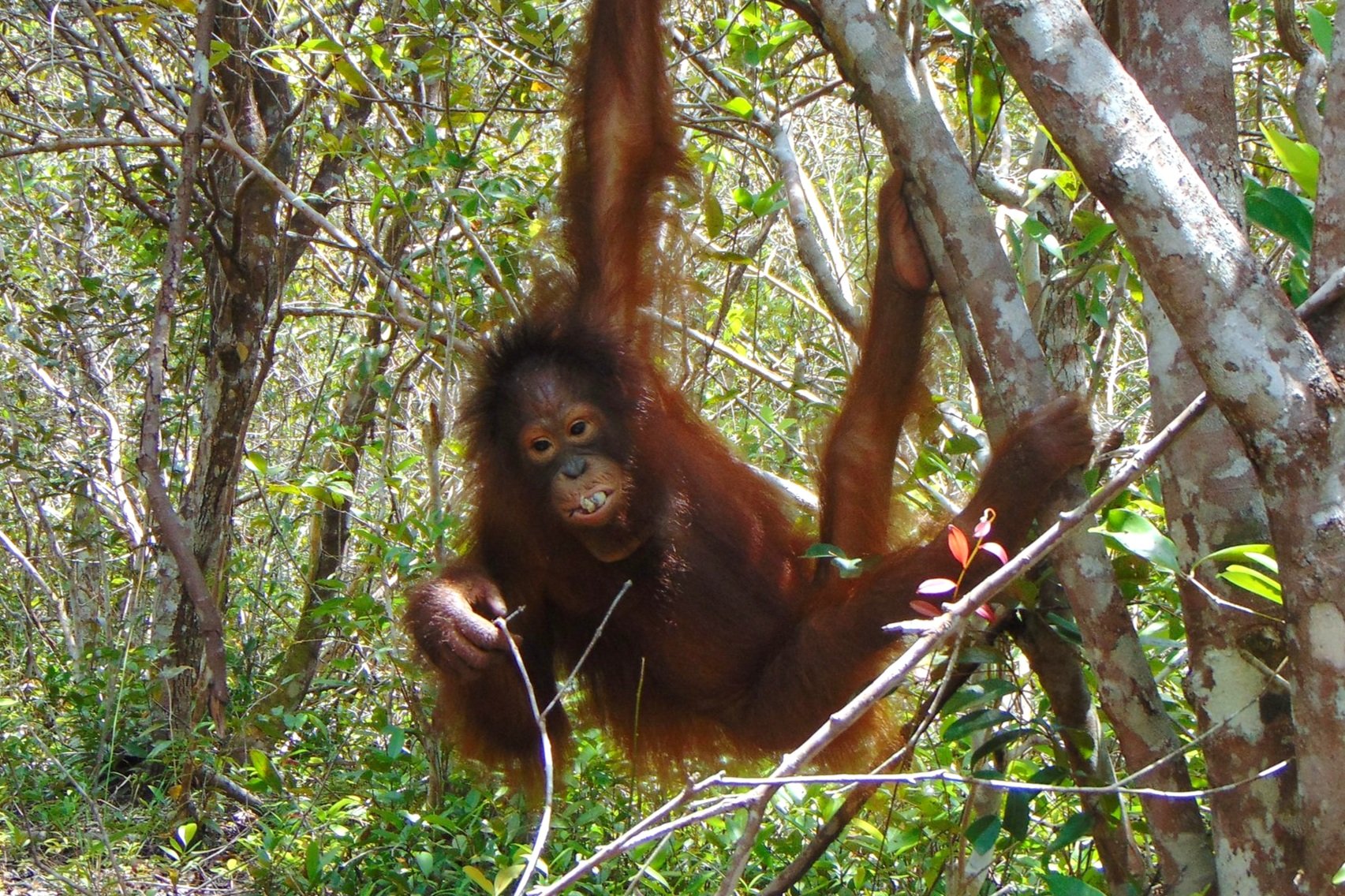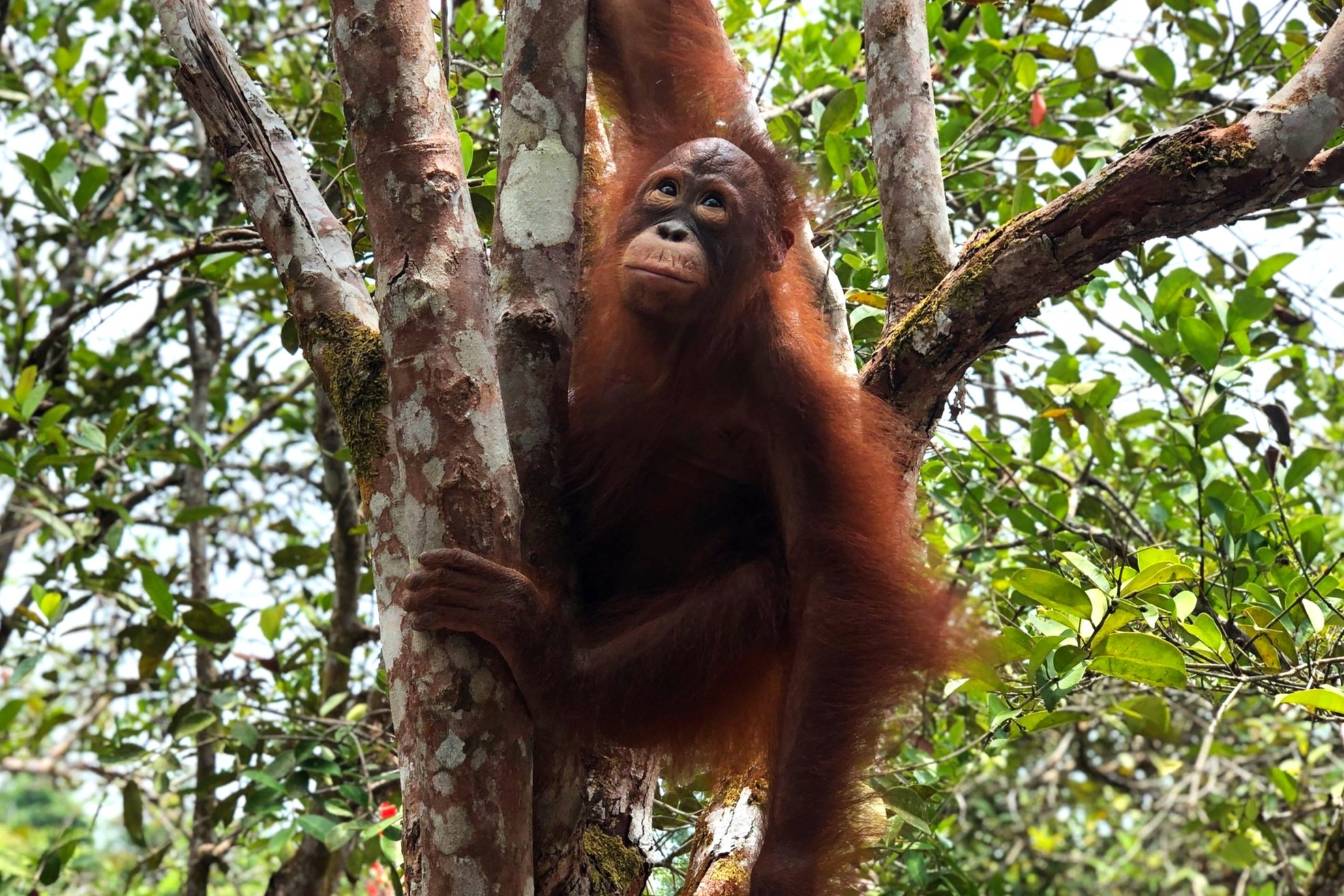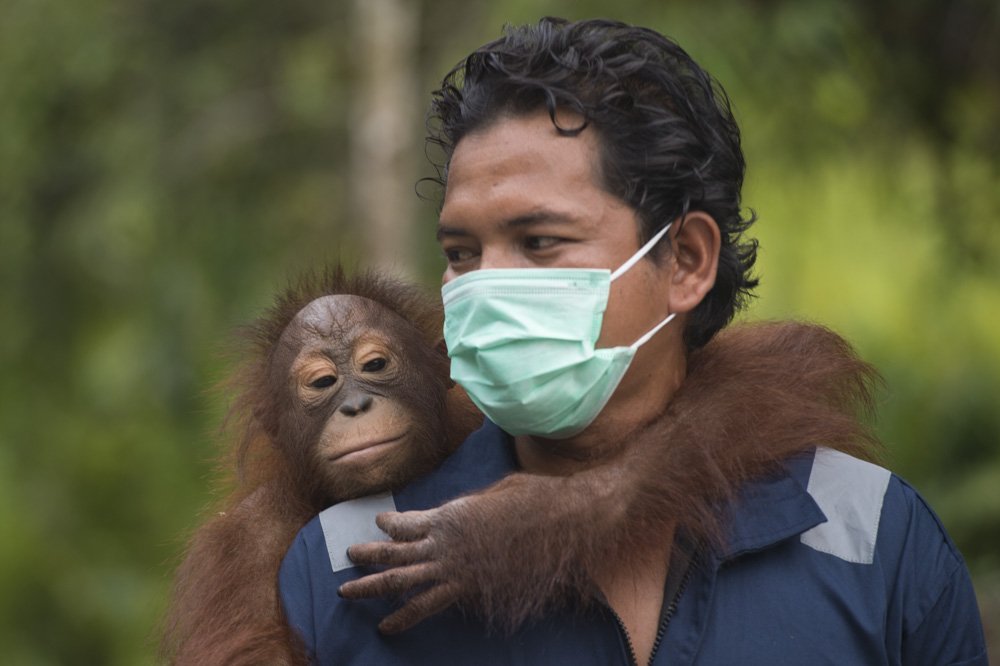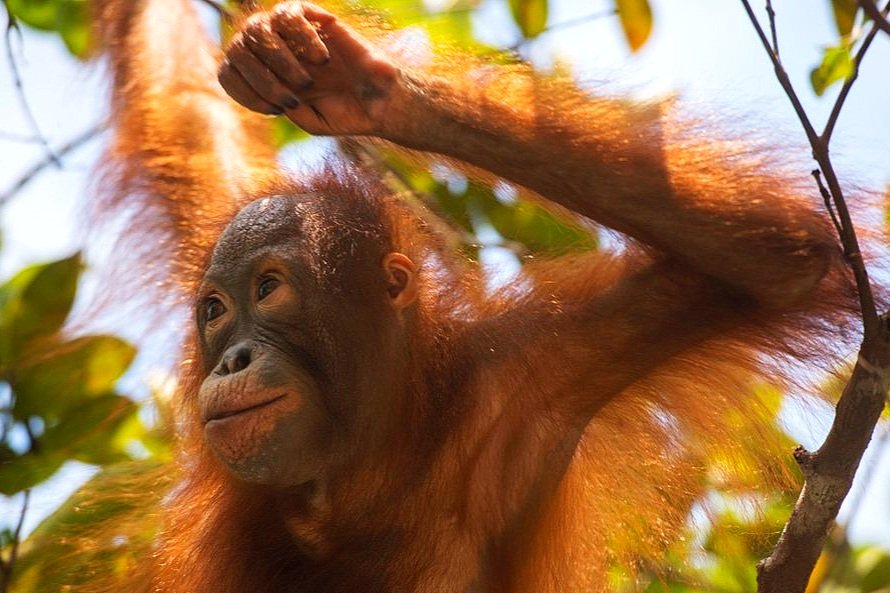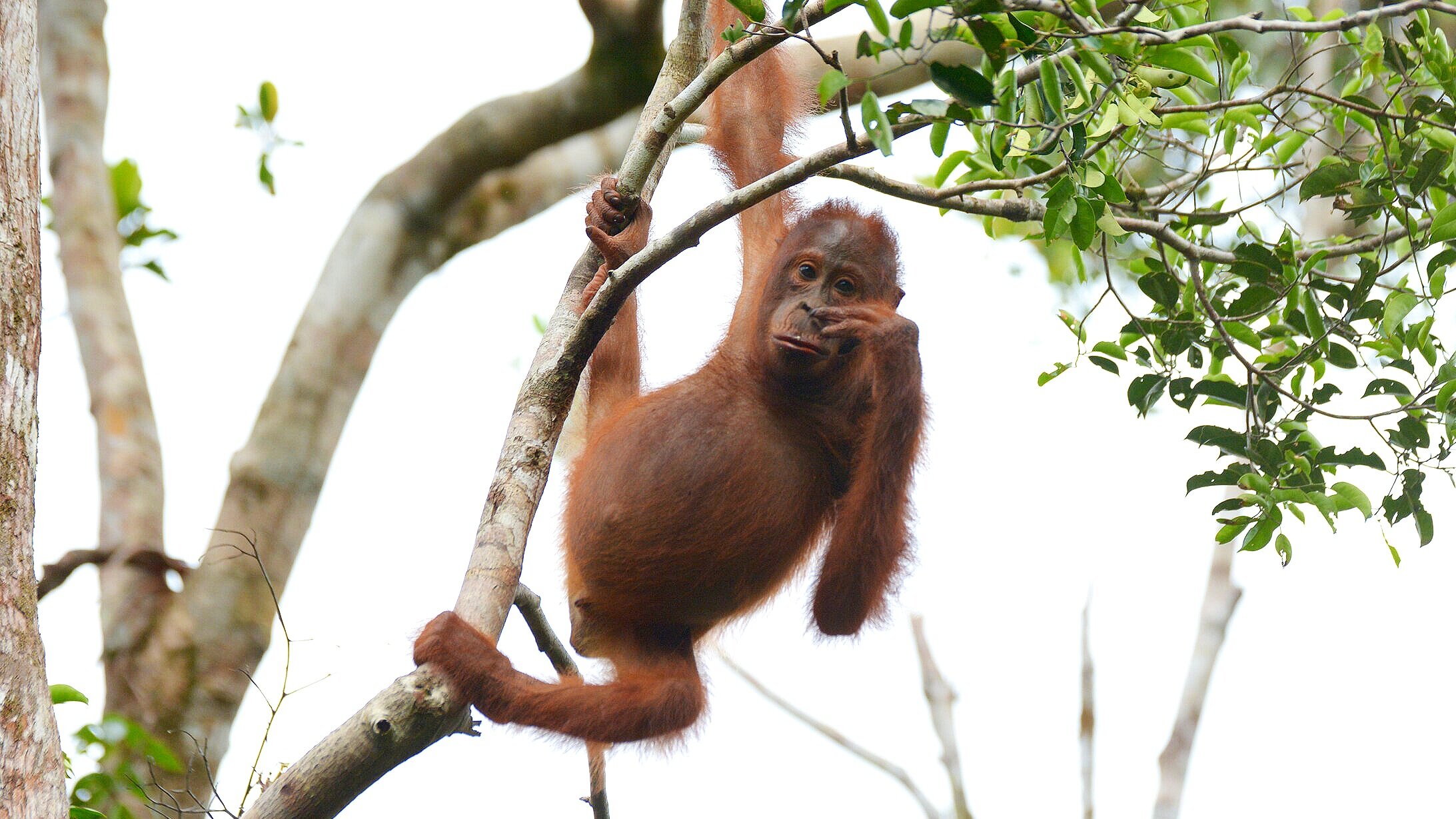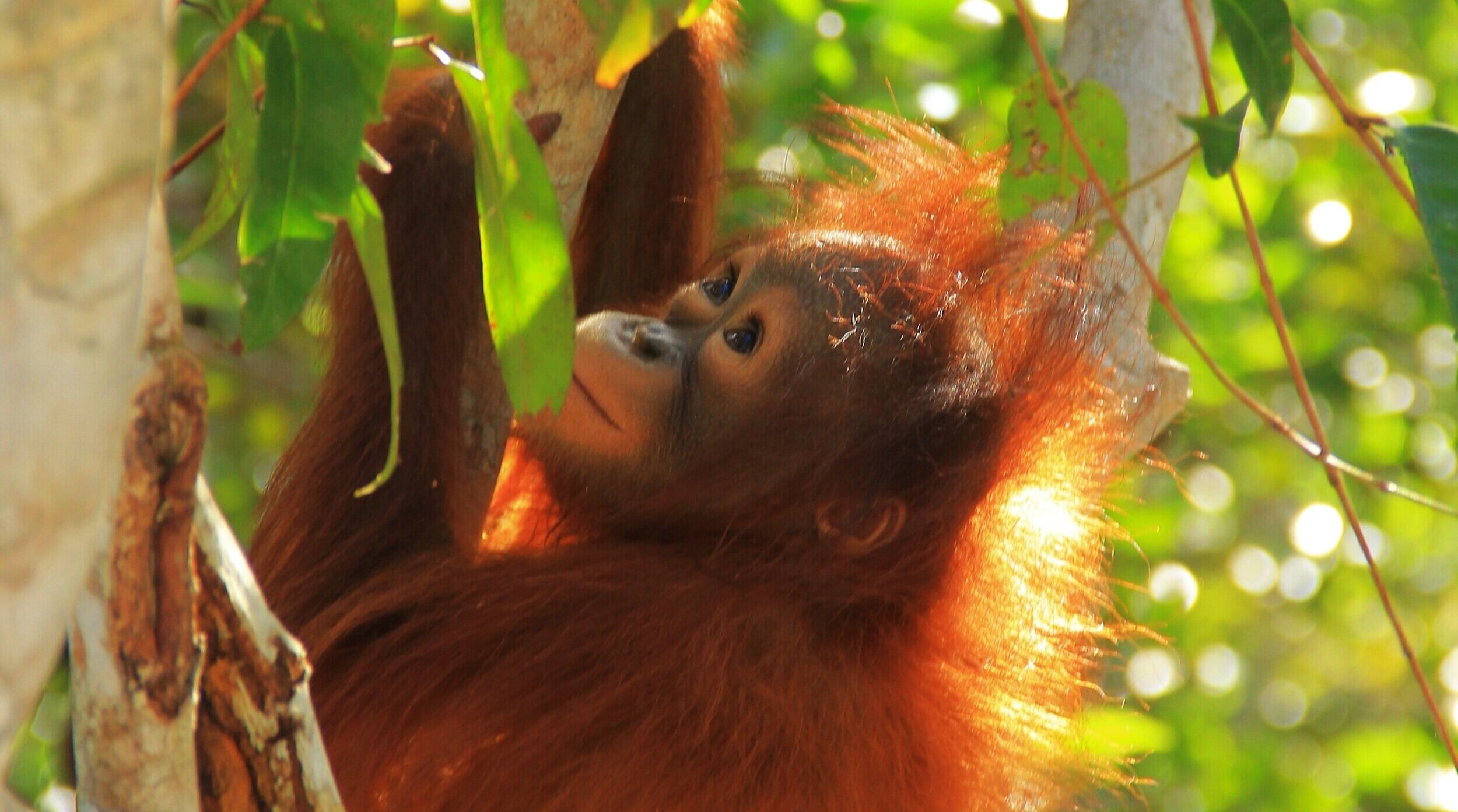Sometimes the orphaned orangutans that we care for in our soft-release programme need extra encouragement to practice the skills they need for an independent life in the wild. Timtom is one such orangutan
Orangutan Stories: Mores & Marsha
When our team discover that a female orangutan in the wild is pregnant, there’s a certain energy that’s suddenly felt around camp. Every newborn is vital for the future of this critically endangered species so there’s excitement at the thought of another addition to the population, but also a sense of trepidation, hoping that the birth will go well.
This is how our team at Camp Gemini felt back in 2019 when we learnt that reintroduced orangutan Mores was pregnant for the third time. Every time we would see her moving around in the trees within the Lamandau Wildlife Reserve, we’d crane our necks to see if there was a little newborn hiding under her long orangey hair. It wasn’t until June that our team were finally rewarded. Emerging from the vegetation came Mores clutching her new tiny infant for the first time!
Our monitoring team have to be particularly vigilant for the days following an orangutan birth. It’s the most vulnerable time for any animal in the wild, so to keep a close eye on mother and offspring without disrupting their first moments together is very important.
It was satisfying to see that Mores and her newborn were progressing nicely over the first few days. With her young by her side, she would travel gracefully through the trees and eat plenty of food to keep up their strength. After a while we were finally able to determine that the infant was female, and to follow her mother’s ‘M’ lineage, she was given the name Marsha.
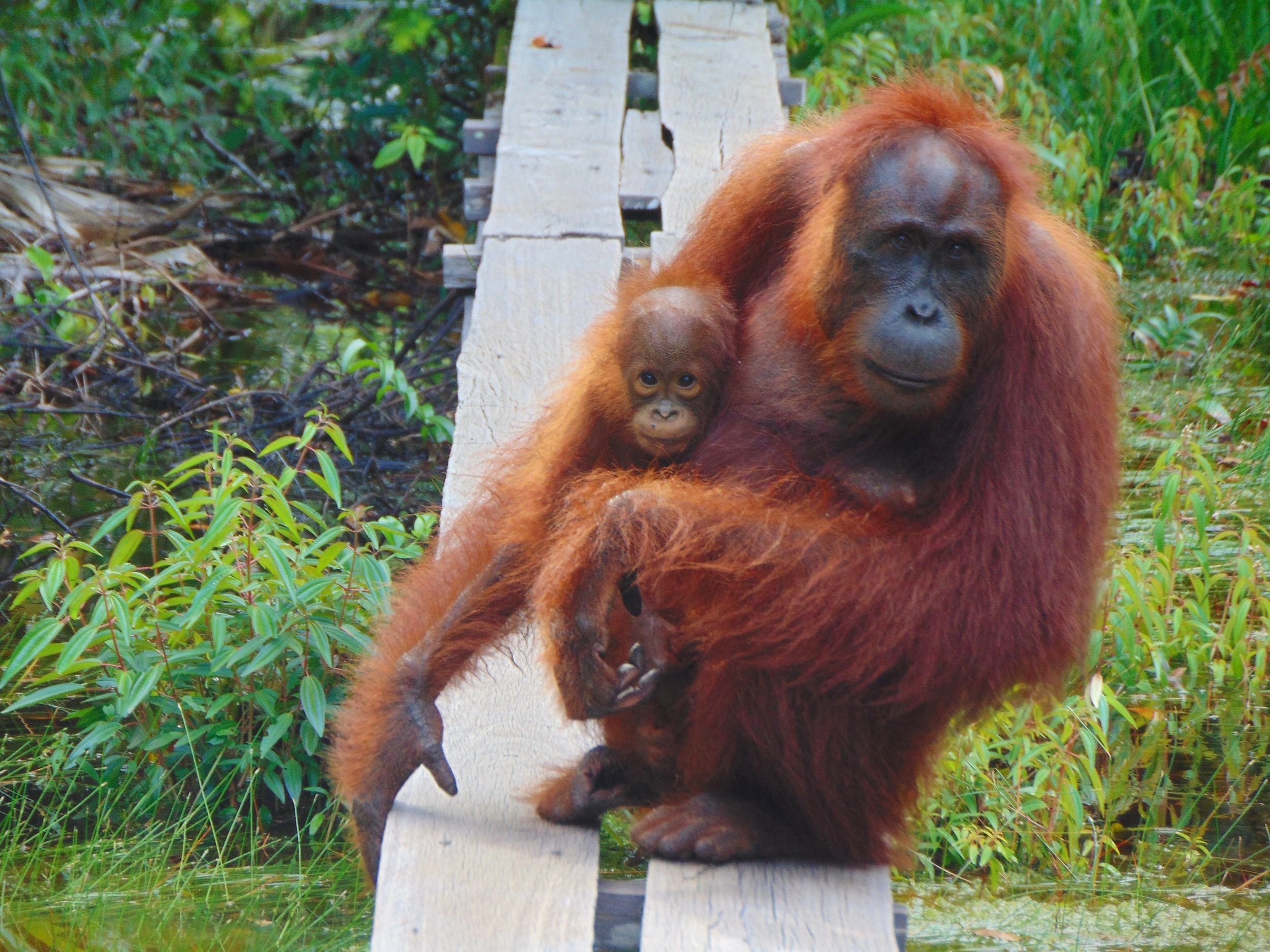
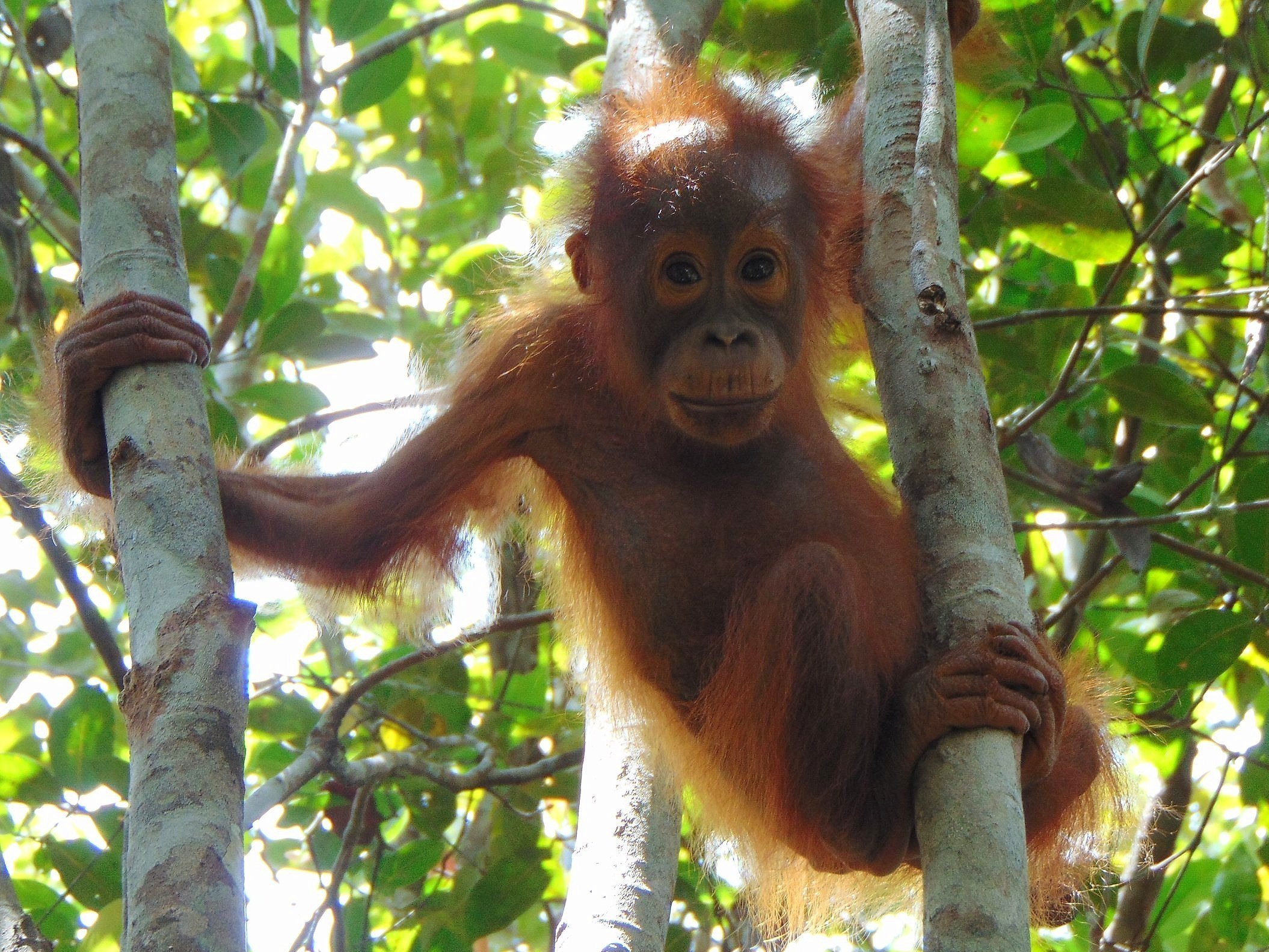
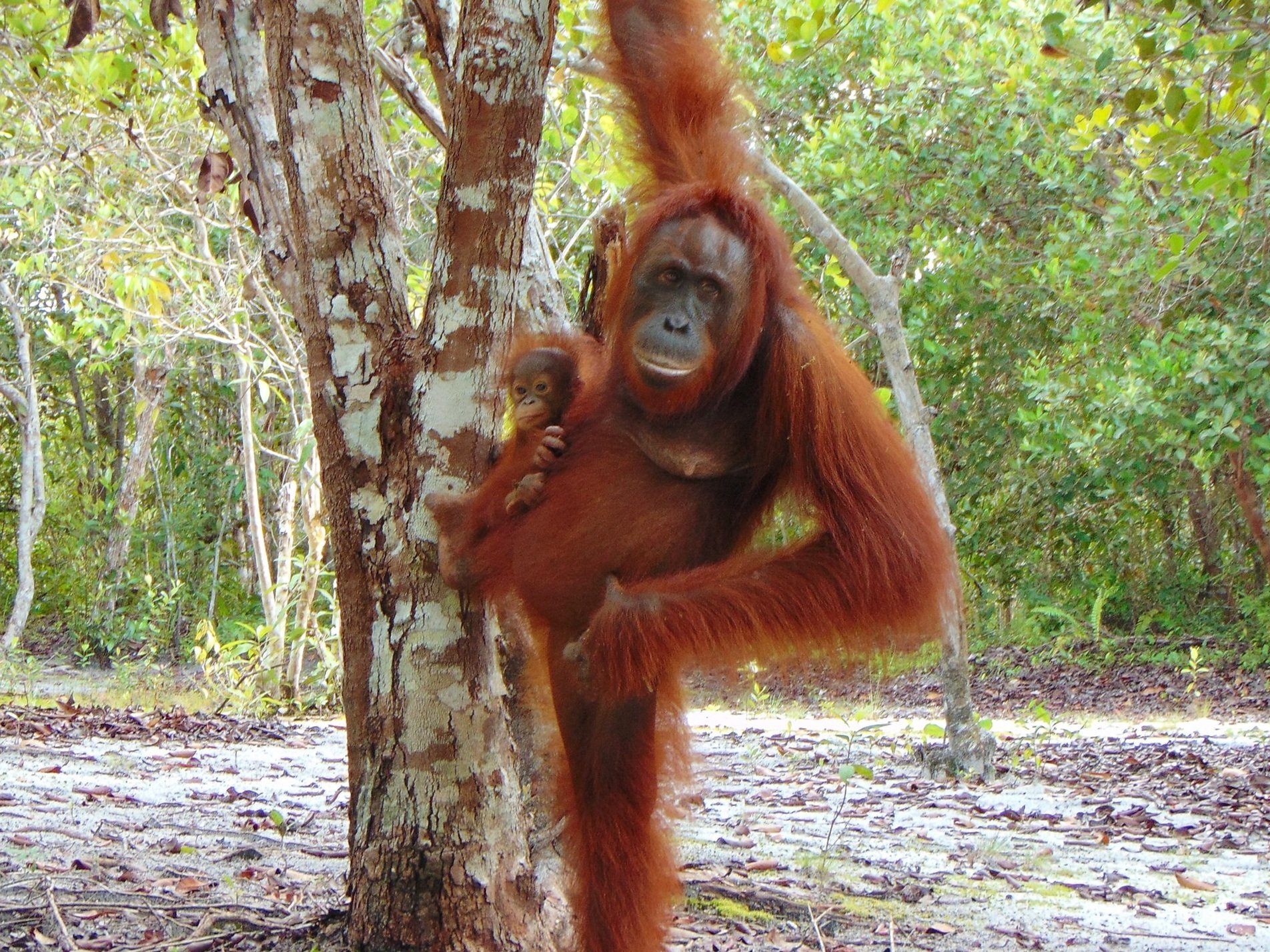
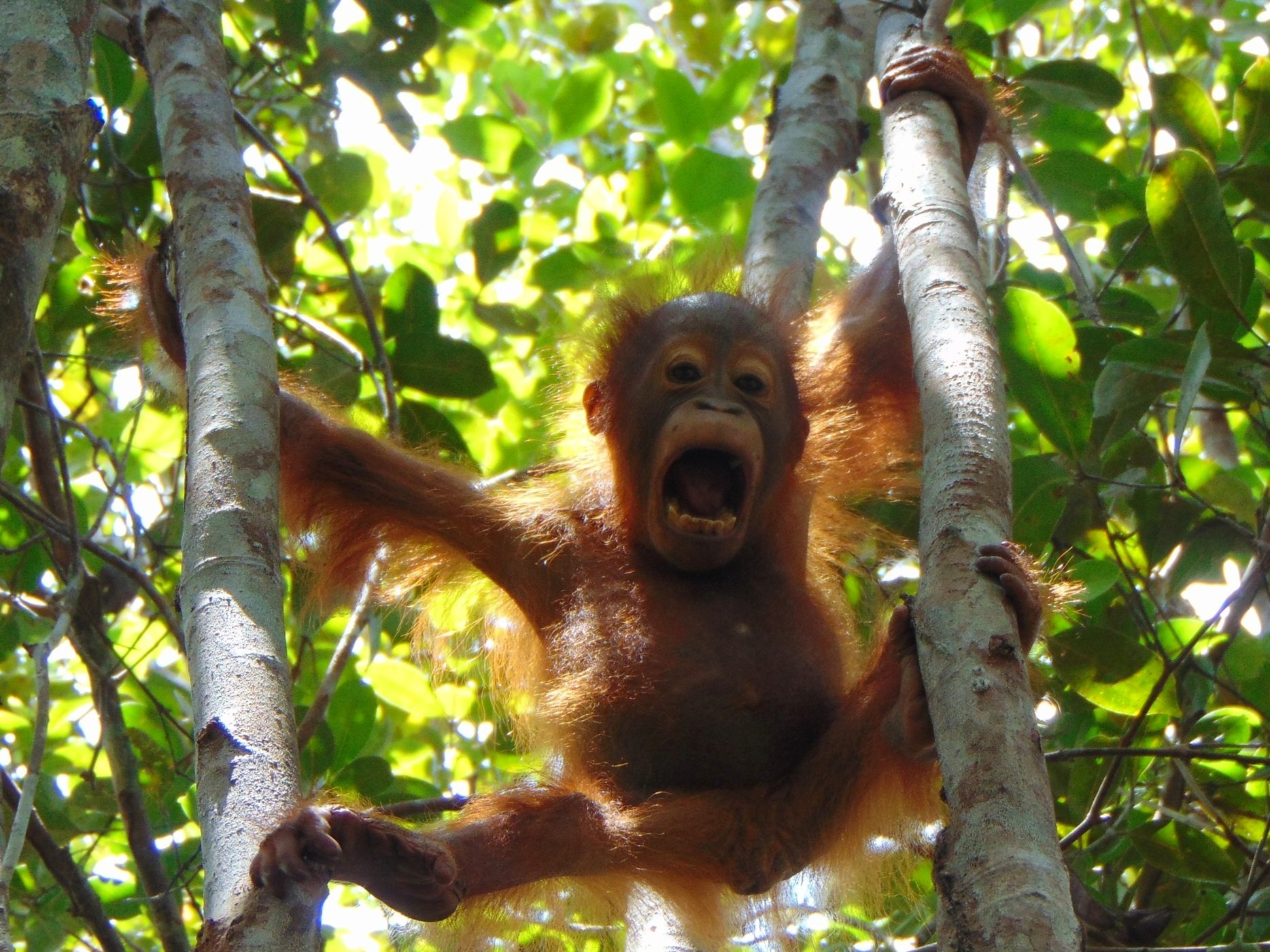
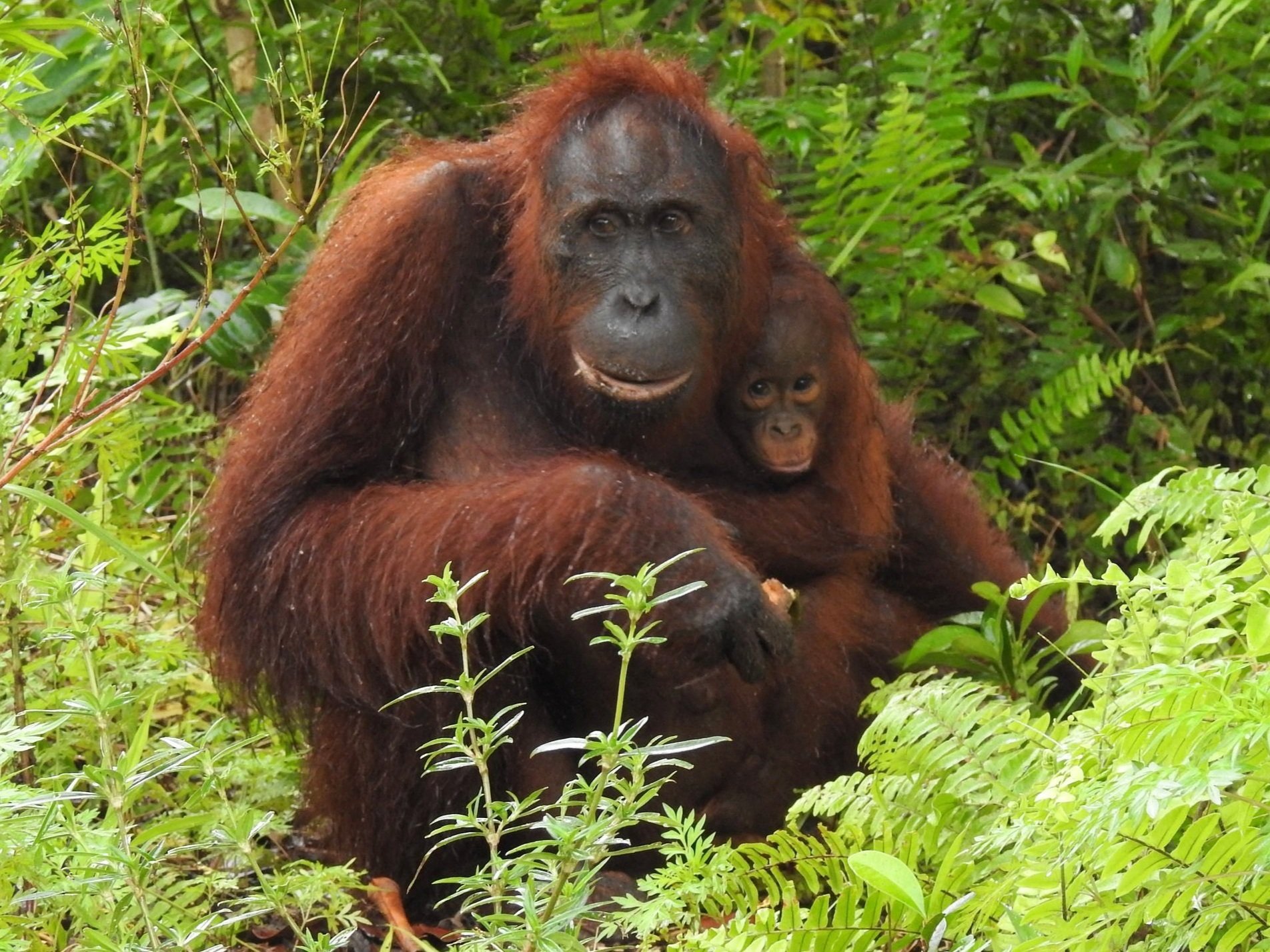
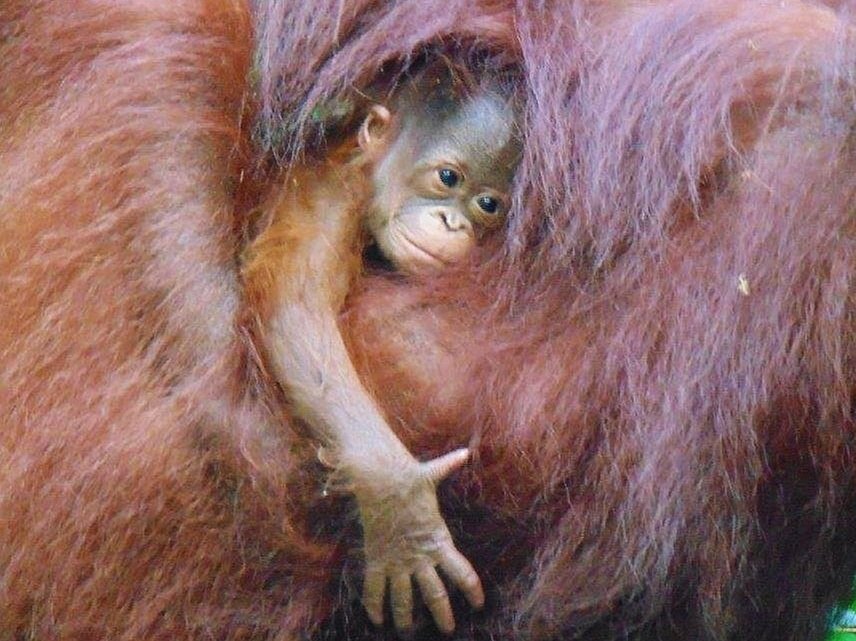

Since then, our staff have enjoyed watching Marsha grow in size and personality in the forest. Witnessing the way her mother climbs, builds nests, and searches for food; the young orangutan is slowly being painted a picture of what an independent life in the rainforest looks like. She still has a few more years to go until she’ll be ready to go it alone, but thanks to her mother’s teachings, Marsha is starting to show the first signs of maturity.
Marsha is Mores’s third offspring, having previously given birth to Marcell and Martin in the wild. For Mores to have grown her family tree so well is truly a fantastic achievement, especially when we consider that she began her life in captivity before her release into the reserve in 2003. A testament to how successful reintroduction can be when orangutans have a safe forest to roam.
It’s fair to say that Mores has played her part for the future of these critically endangered great apes, unfortunately though, not all orangutans have the opportunity to do so in a habitat that is protected. Orphans taken into the illegal pet trade have an uncertain future, but at the Orangutan Foundation our staff can offer a route back to the wild through our soft-release programme. Please click below to find out how you can adopt an orangutan today and ensure orphans as young as Marsha also have the chance to be independent.
Orangutan Stories: Queen & Quentin
The connection between an orangutan mother and her infant is almost unparalleled in the natural world. While other great apes like gorillas and chimpanzees congregate in groups so each one can contribute to parenting in some way, an orangutan infant has up to eight years of one-on-one time with its mother and is therefore totally dependent on her to survive.
Queen is spotted with her new born Quentin for the first time
In the early stages, every aspect of a young orangutan’s life is catered for by the mother: Travel- They hold onto her as she climbs and swings through the forest. Food- Even when they’ve grown out of breastfeeding, their mother will find the best fruiting trees to keep them well-nourished. Shelter- Every night they’re kept warm and safe up in the forest canopy by a nest that their mother fashions out of branches. It’s why when young orangutans are discovered in the wild or in captivity without their mother, there’s a challenging path to independence that lies ahead for the orphan.
Young orangutan Quentin can rely on his mother Queen for support
This powerful maternal bond is clear to see when our monitoring team watch female orangutan Queen care for her infant Quentin in the Lamandau Wildlife Reserve. The young male was born two summers ago in the forest surrounding Camp Buluh, and today the pair are ever-present around camp, enabling us to accurately study his development.
Their favourite pastime it seems is to forage for food along the riverbanks. Whether searching for fresh pandan leaves to eat by the water’s edge, or fishing for fallen fruit in the river, Queen will often place Quentin on her head to stay dry as she wades through the water.
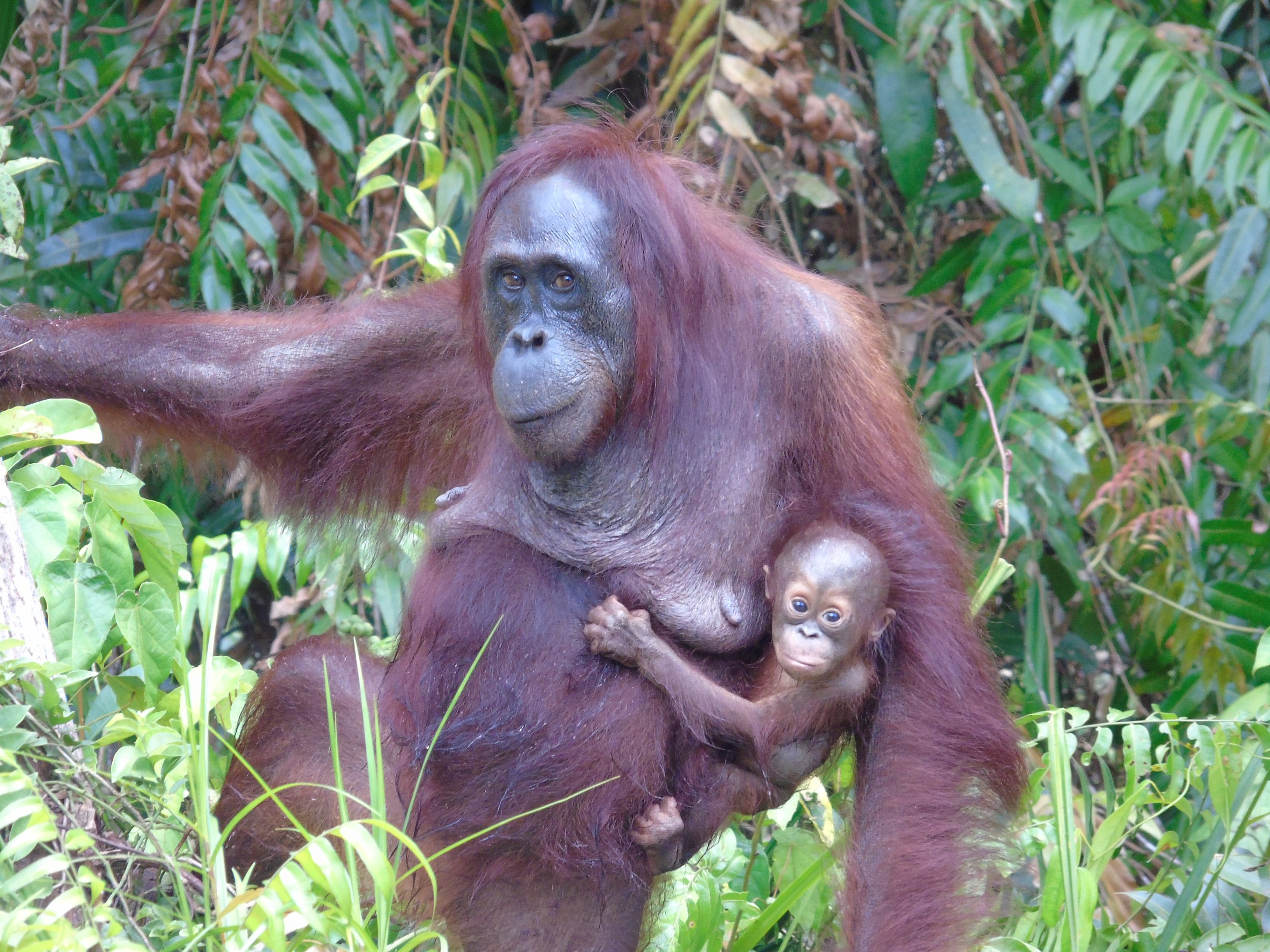
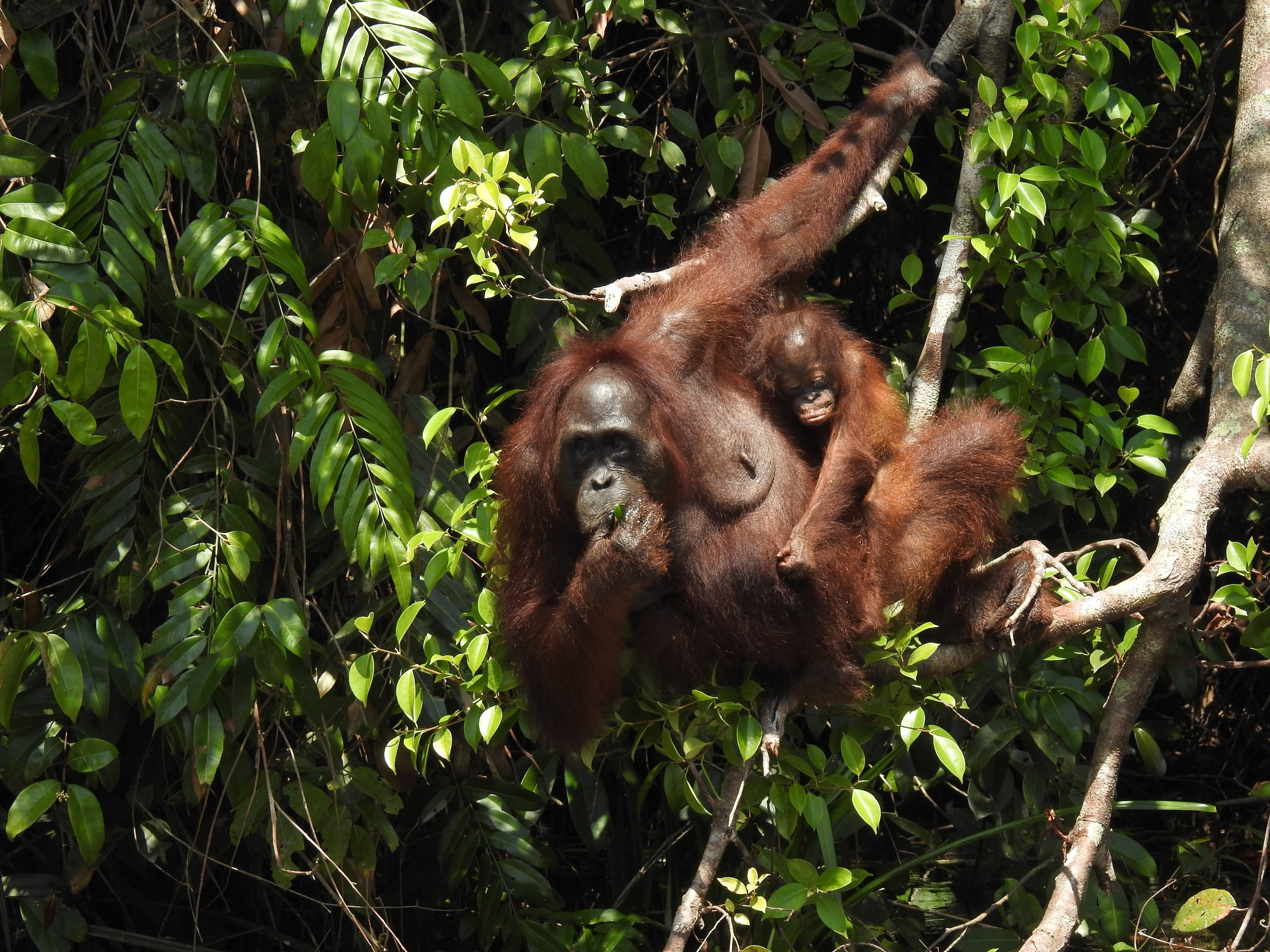
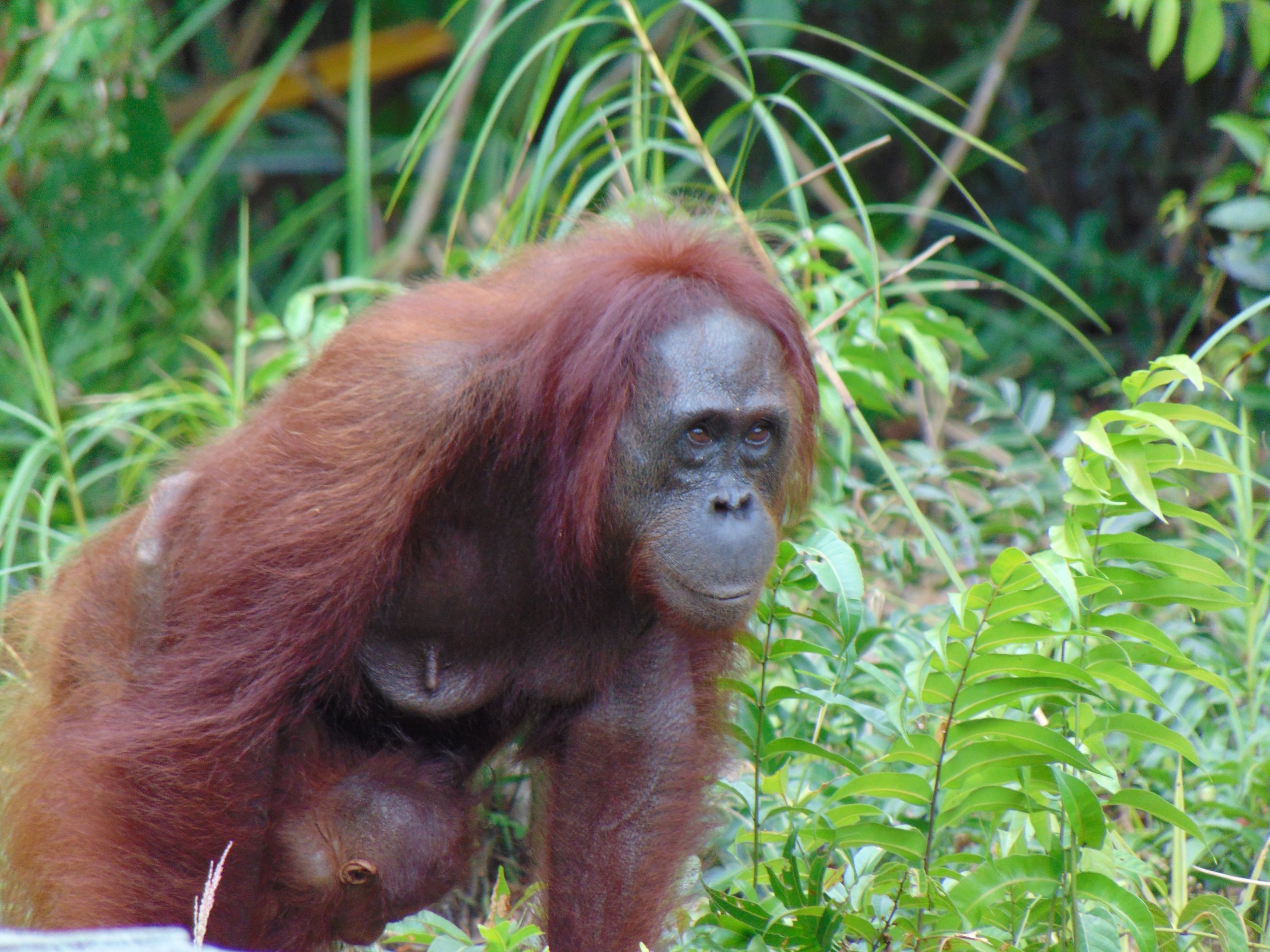

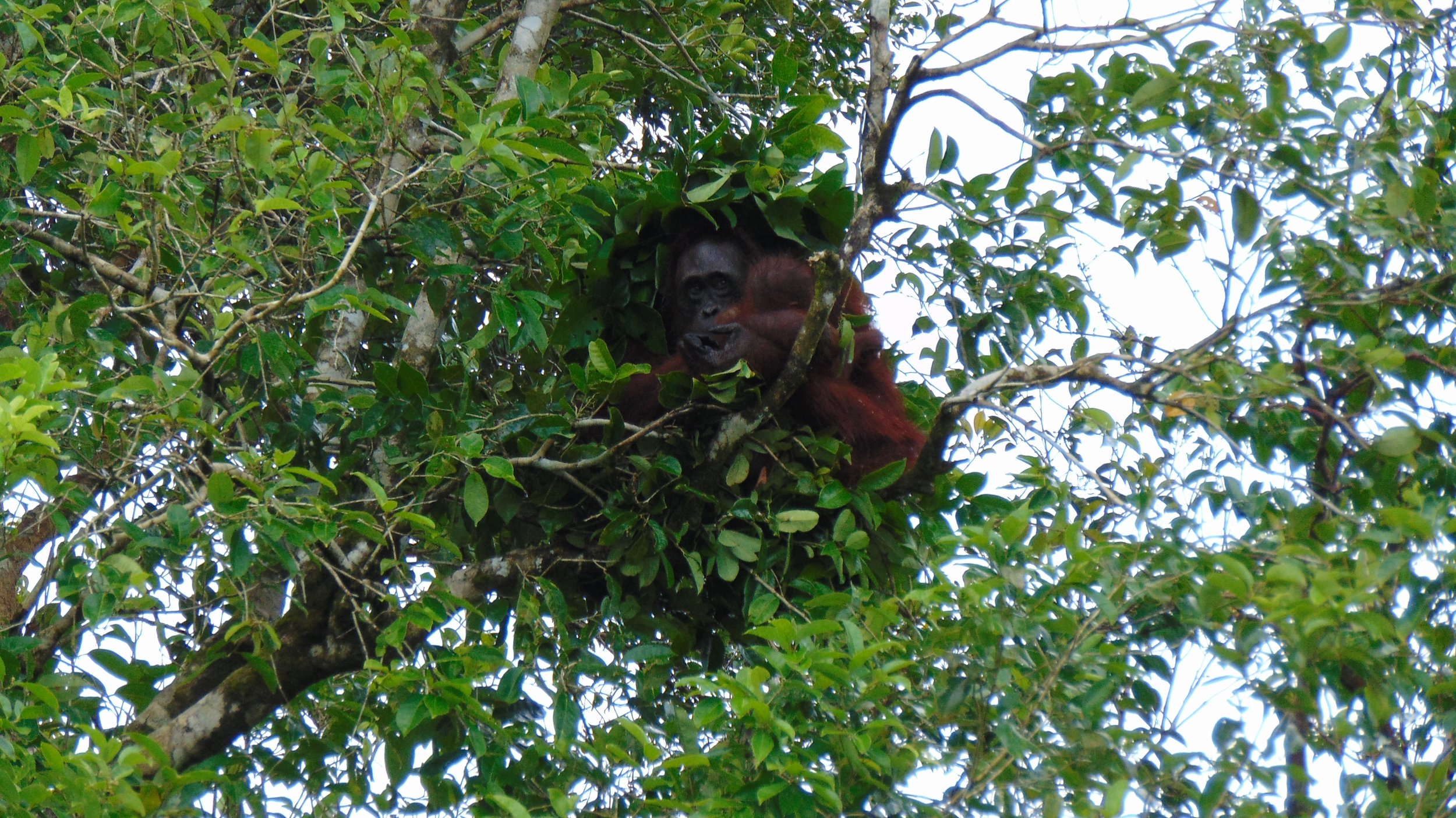
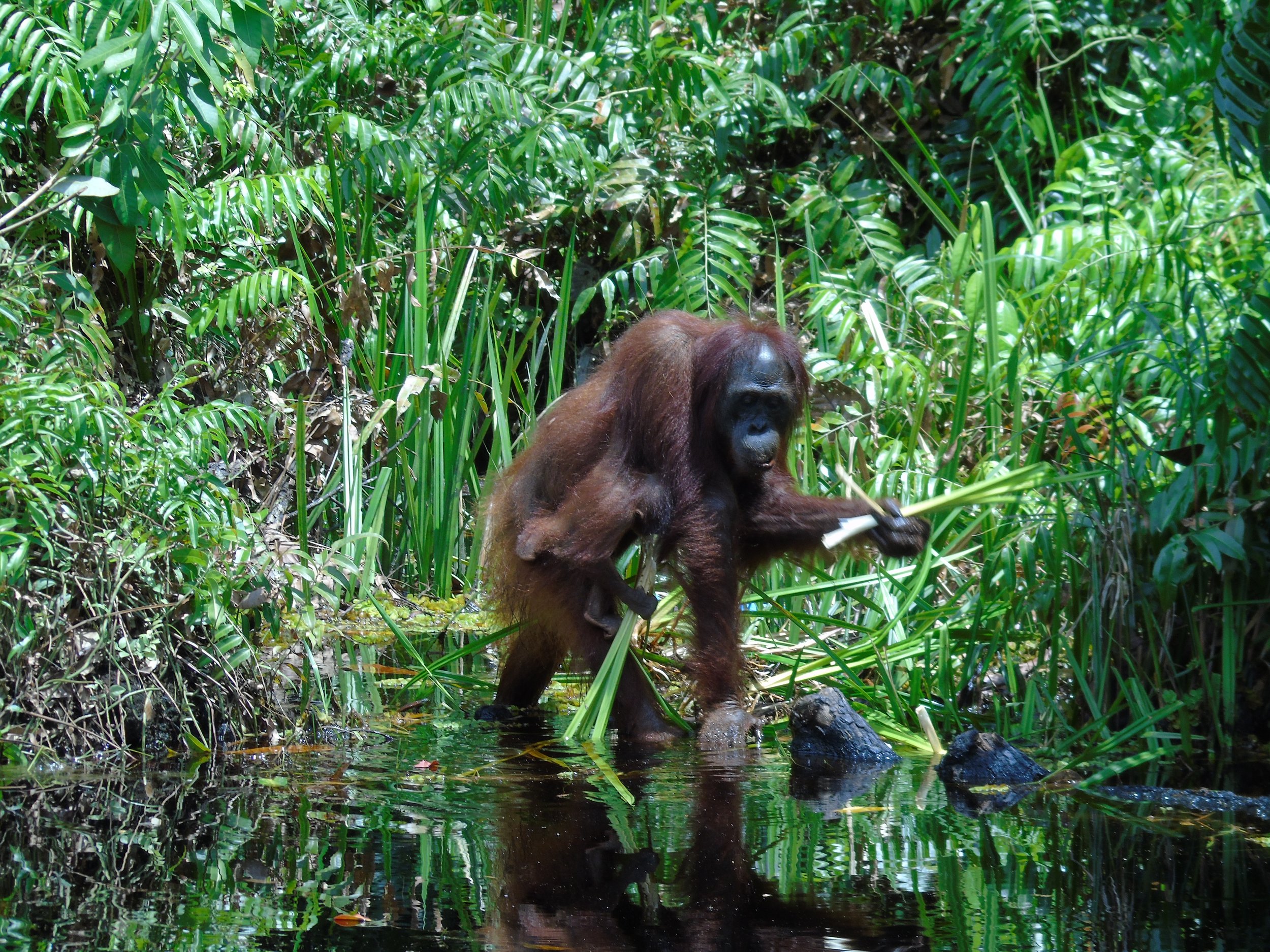
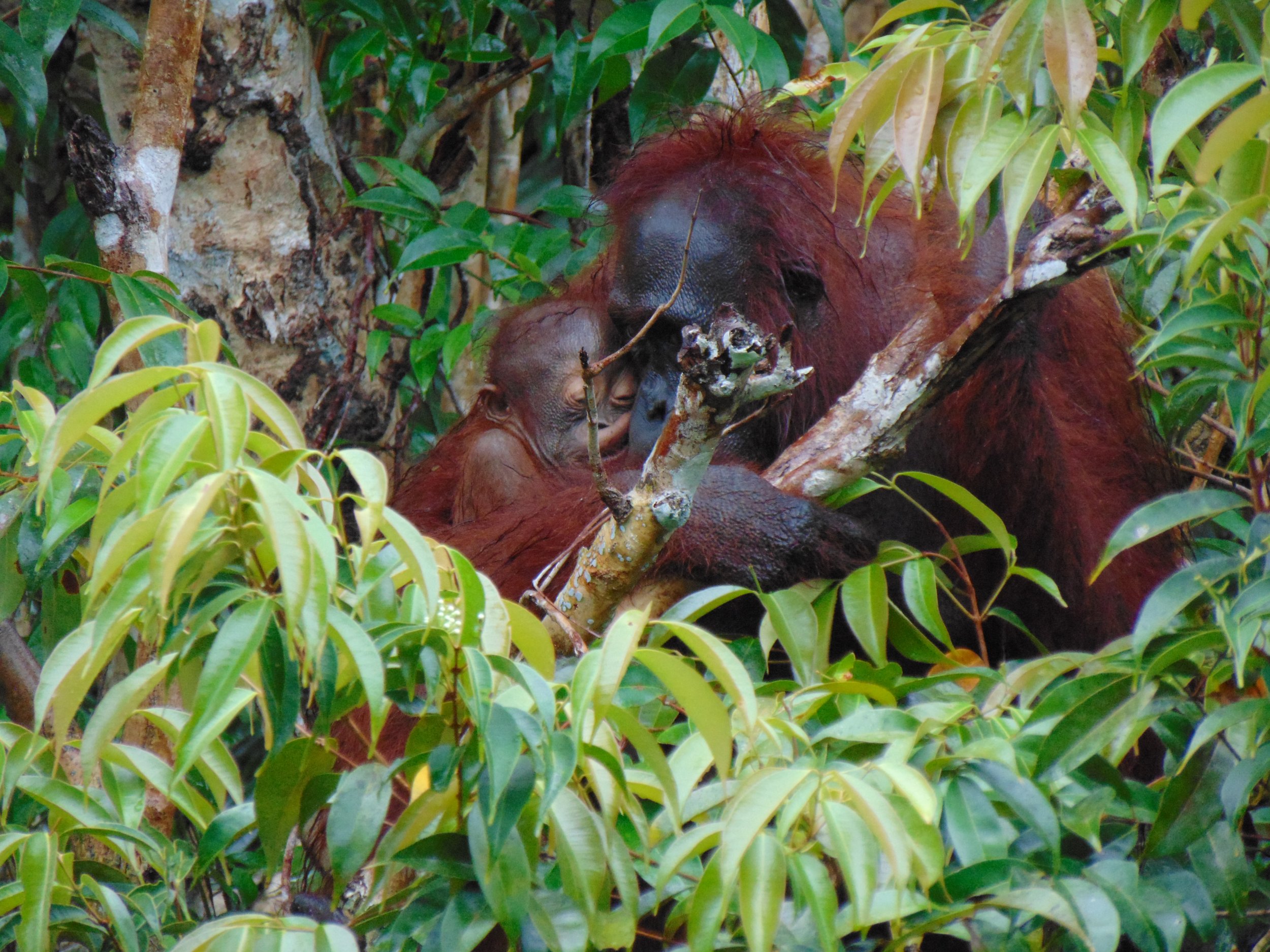
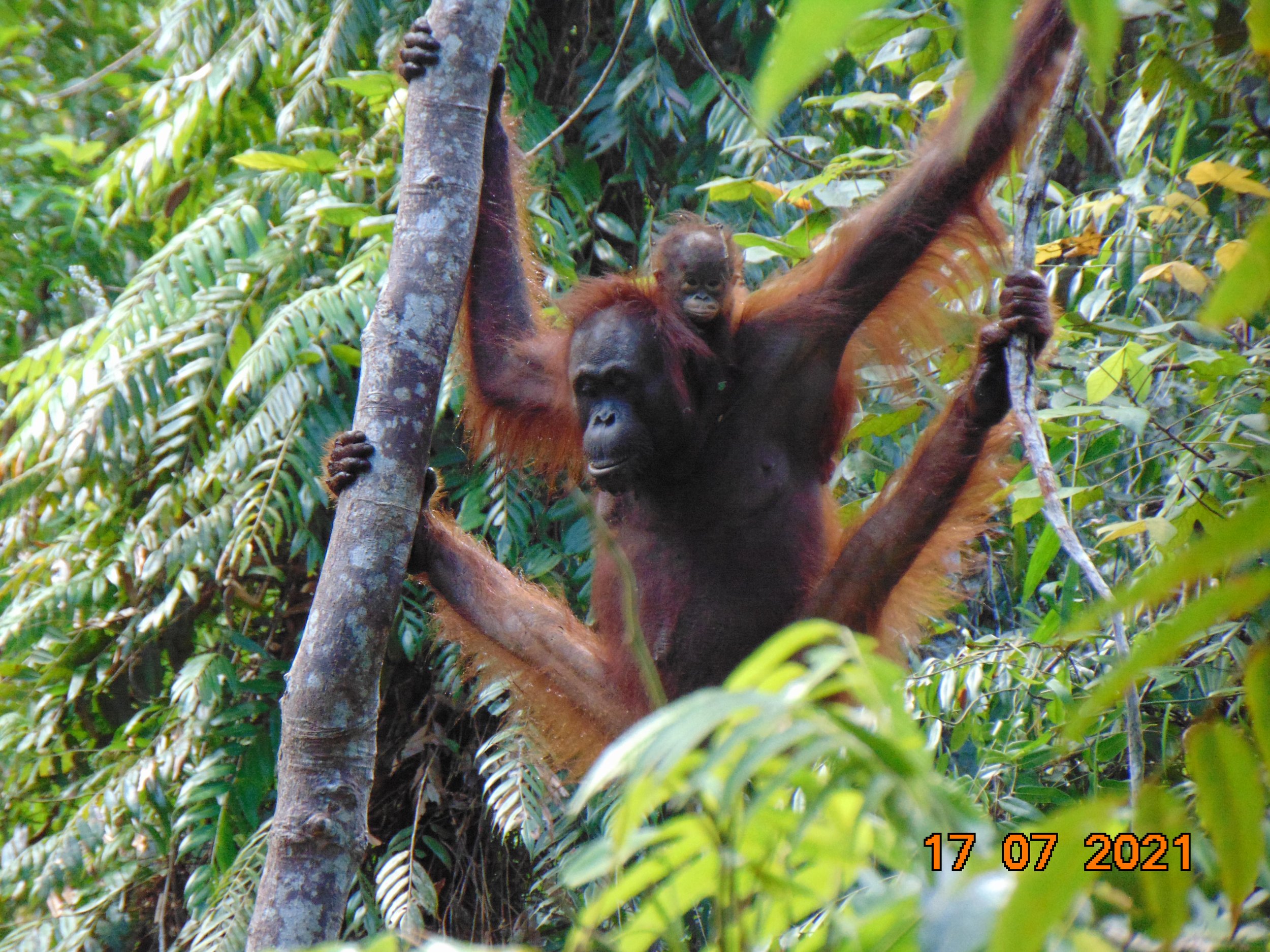
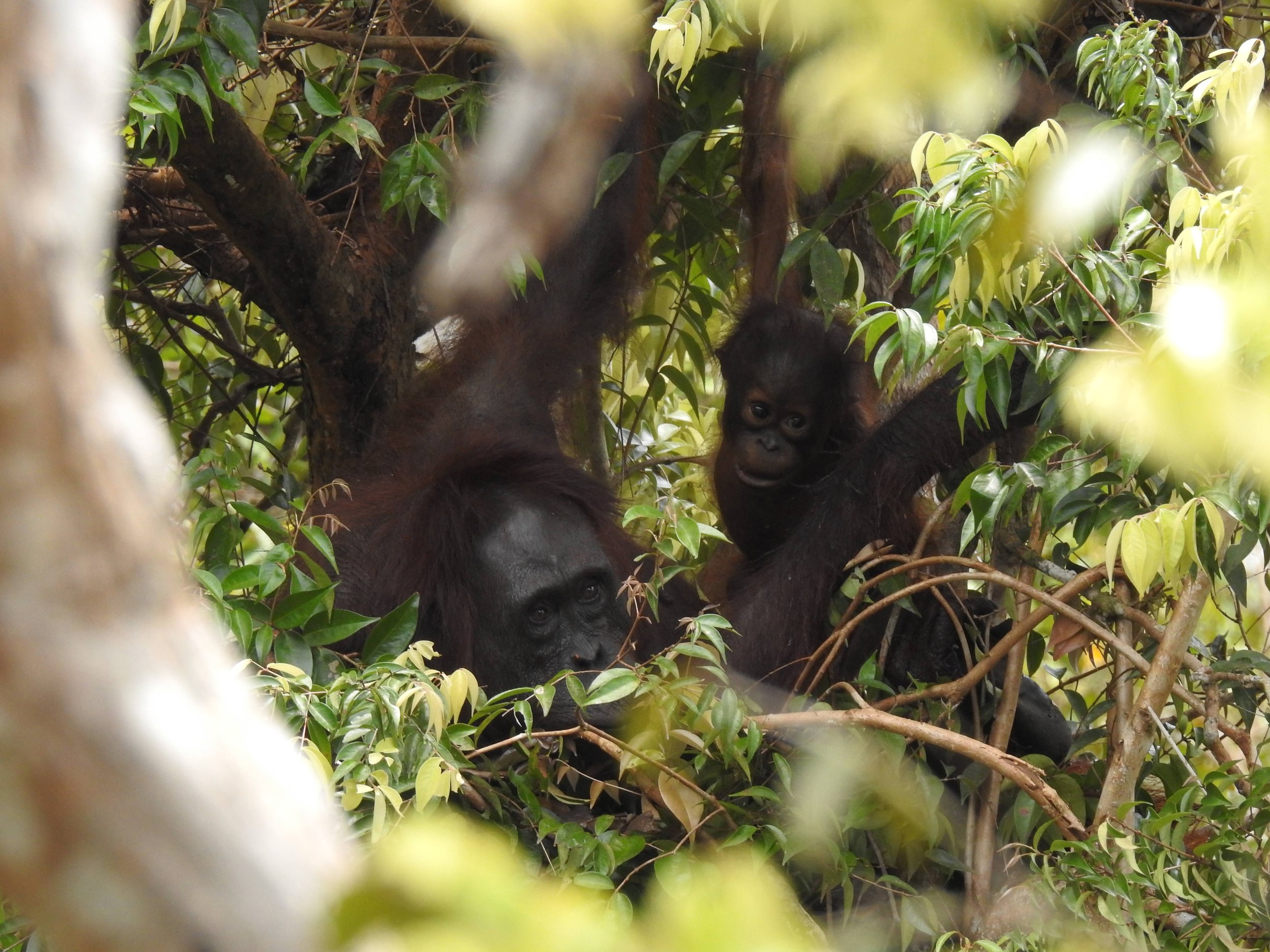
It’s an idyllic scene, watching mother and infant gracefully going about their business along the riverbank. However, the recent news of the crocodile attack on male orangutan Brian looms large, so it’s natural for our team to feel a little uneasy of their presence in the water now.
Despite this potential hazard, Queen certainly seems to know what she’s doing. She was one of the first orangutans to be introduced to the protected reserve back in 2003 as a six-year-old, and since then has built a strong legacy of successors. Quentin may be her first son, but previously Queen has raised three females since her release into the wild, so she has a wealth of experience on her side.
While he’s still young, our team will continue to enjoy Quentin’s presence around camp. Each day he spends watching his mother is another day closer to understanding forest life. In the years to come he will gradually learn what it takes to go out and begin his own legacy, but in the meantime, we’re delighted to keeping watching his progress.
Orangutan Stories: Boy
Orangutans are like humans in so many ways. We share around 97% of our DNA which means that biologically speaking there are a number of similarities. We have the same number of teeth, both age in a comparable way, and we can even use a human pregnancy test to check for prospective orangutan mothers!
This means that humans and great apes can also suffer from the same ailments, and orphaned orangutan Boy’s medical history is a prime example of this.
Boy is discovered at a local village in April 2017
As a three-year-old, Boy was separated from his mother and then kept as a pet in a local village. Cages can dramatically restrict an orangutan’s development, and after a few months on his own, Orangutan Foundation staff and government officials BKSDA were alerted to Boy’s presence and hurried to his aid. A thorough medical examination from our vet showed that despite his ordeal, Boy was in good health and ready to embark on his next chapter in the Foundation’s soft-release programme within the protected Lamandau Wildlife Reserve.
On his rescue, Boy receives a full-body examination to check his health
In the wild orangutans are a semi-solitary species, which means that although they generally explore their habitat independently, from time to time they do interact with one another. While they develop their natural abilities in our soft-release programme though, Boy and the other orphaned orangutans spend many hours together, learning and playing with one another on their daily trips to the forest.
Boy enjoys company and is perhaps one the most sociable of the young primates under our supervision. He loves exploring the trees with fellow orphan Adib as they climb and practice nest-building. In fact, Boy has even been spotted spending time with wild infant Marsha, until her mother Mores intervened and playfully shooed him away!
Boy swings in the trees with his campmates
Like the other orphaned orangutans in our care, Boy receives regular health check-ups to monitor his development, but recently we discovered something a little unusual. Last month Boy didn’t appear to be himself, he was vomiting and looked very weak and lethargic. Blood tests revealed that he had caught a cold and was suffering from anaemia, a condition which can occur from a lack of iron in the blood, so a course of multivitamin injections and medicines was prescribed by our vet to help alleviate this.
Another ailment which has affected the young male from time to time over the years is hair loss. Like us, every orangutan is unique so they each have varying amounts of hair on their body, but Boy has experienced unusual periods of baldness in recent times. It’s not thought that this is linked to his recent anaemia, so to treat this, our team have begun to use a new shampoo when washing him in the river which will hopefully encourage growth.
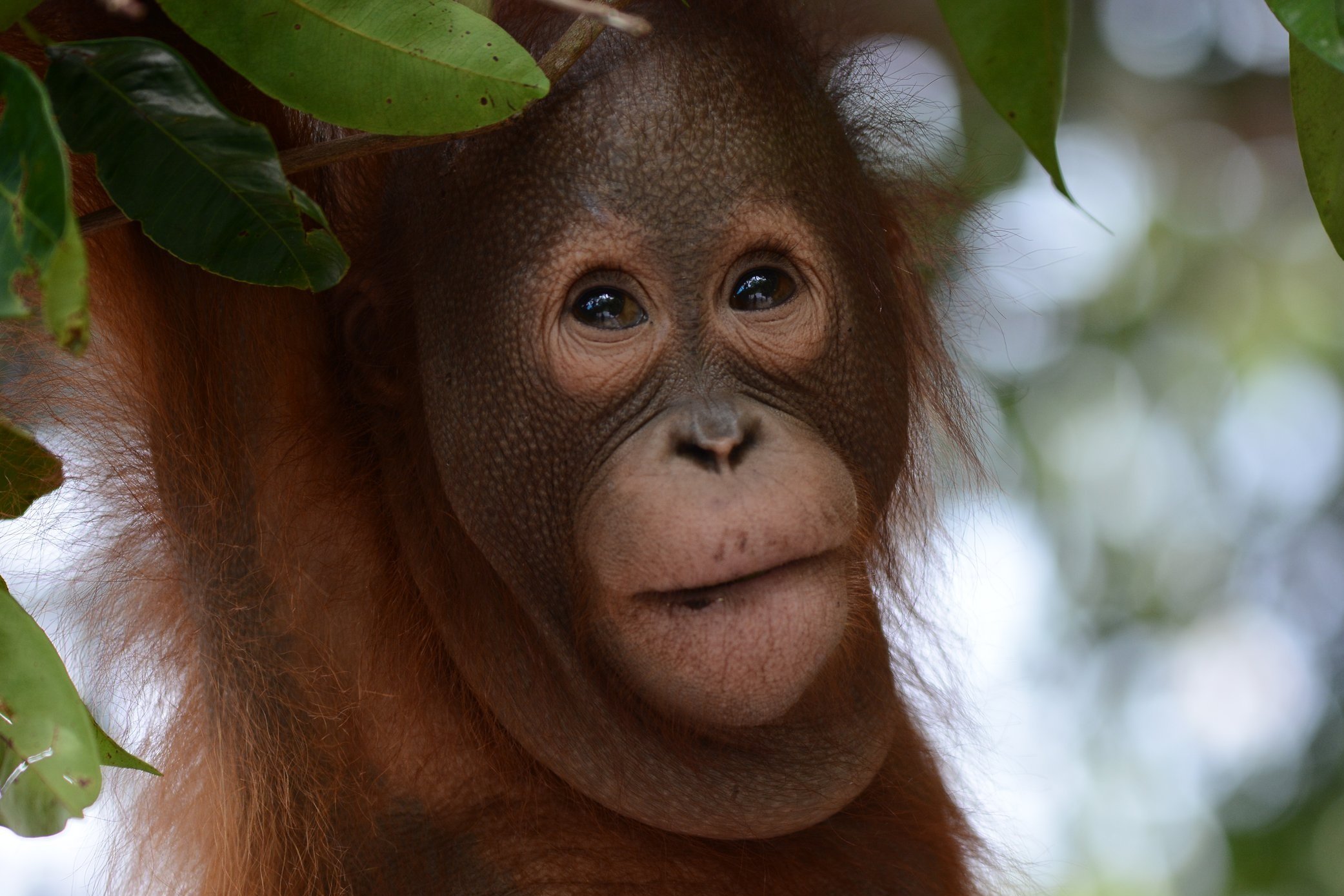
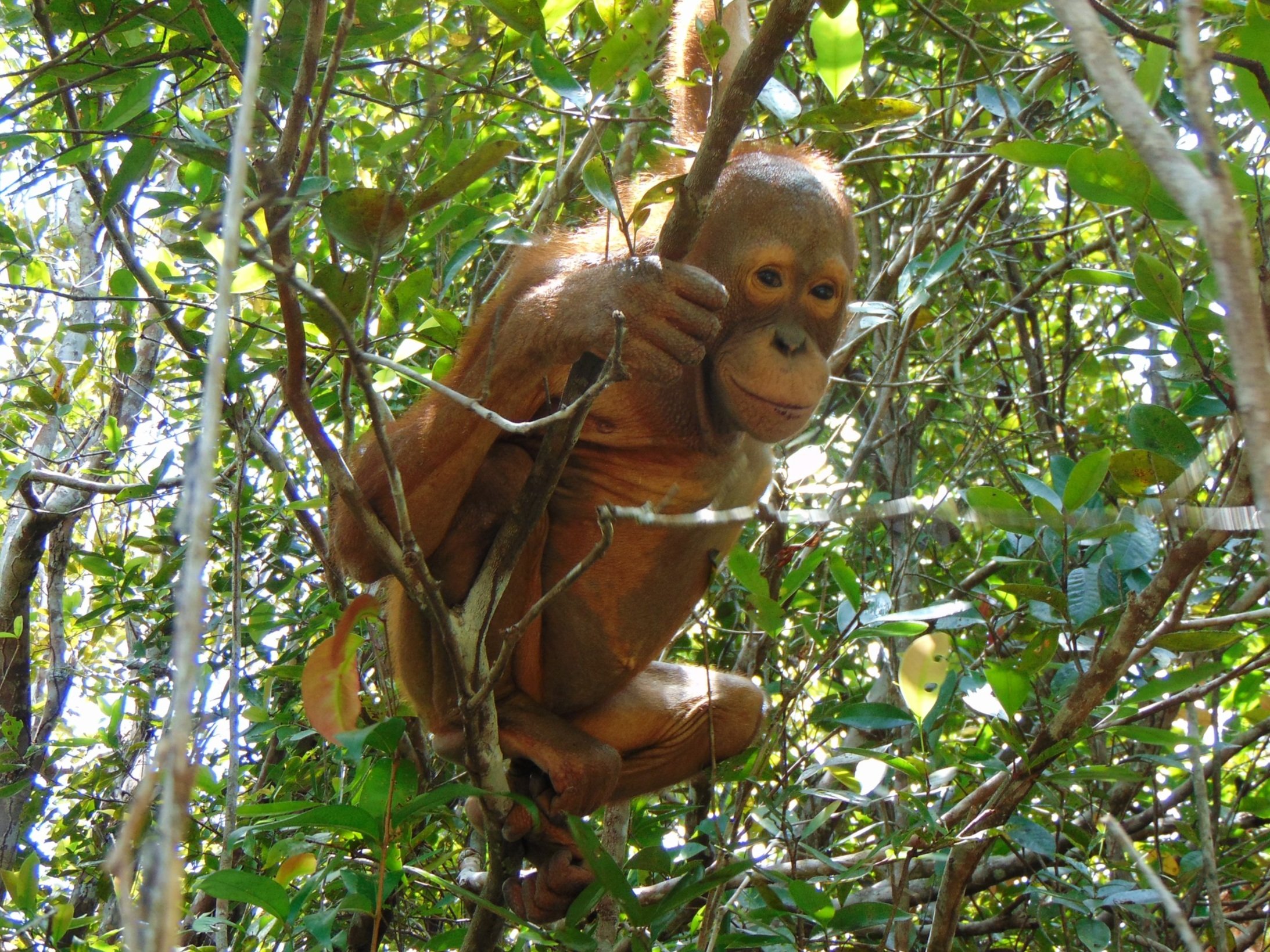
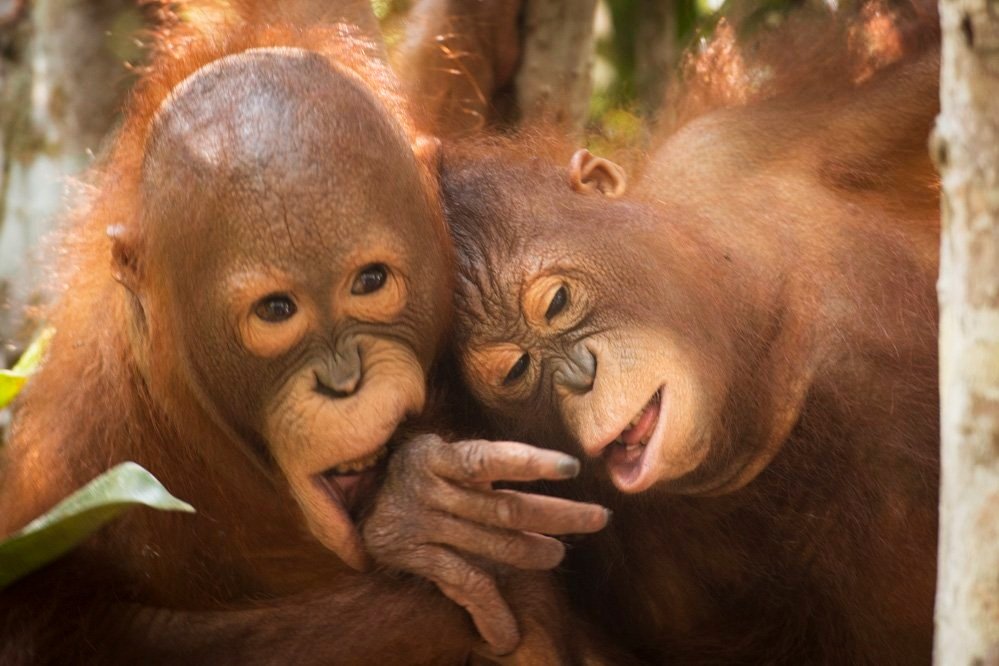
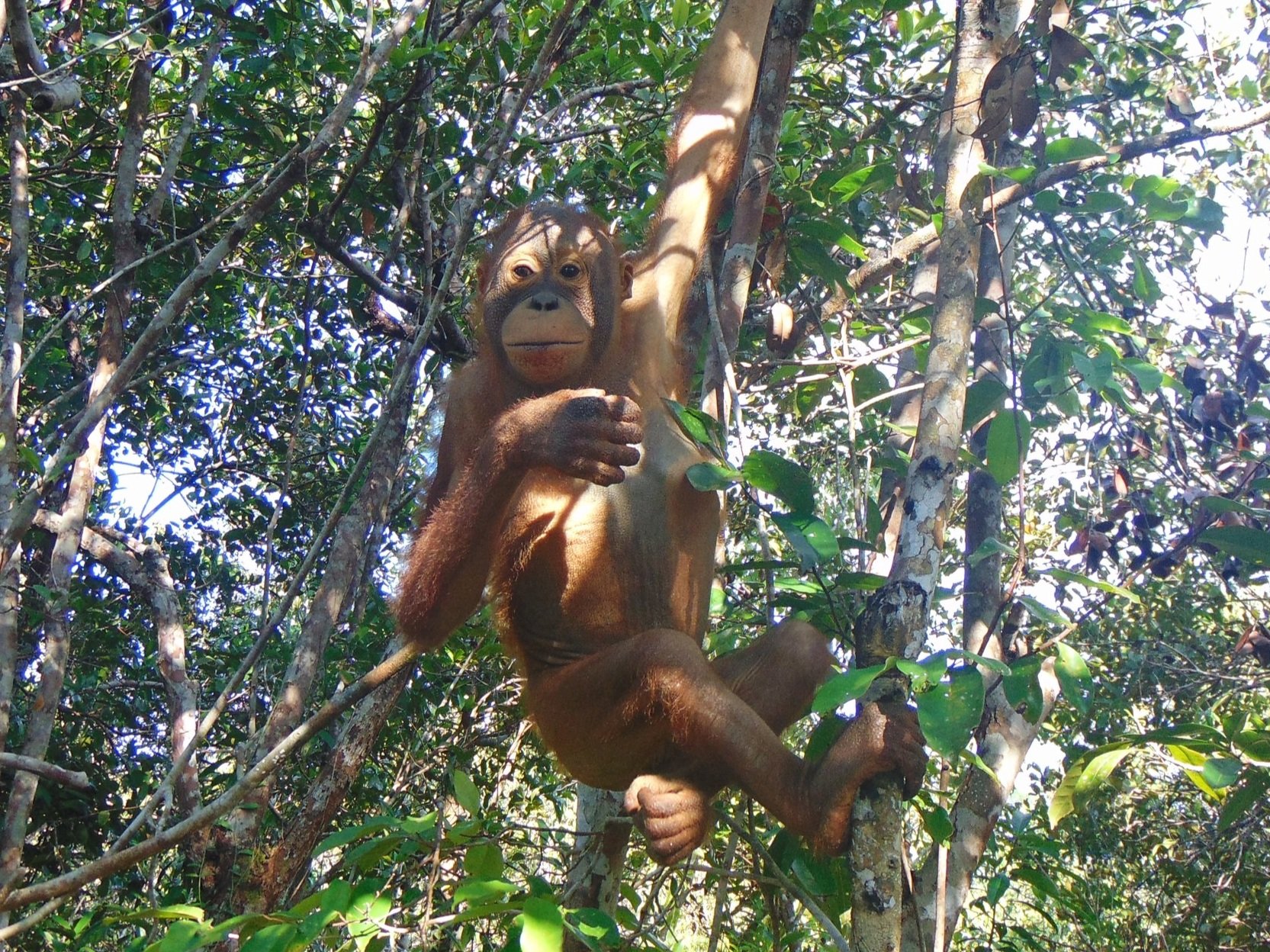
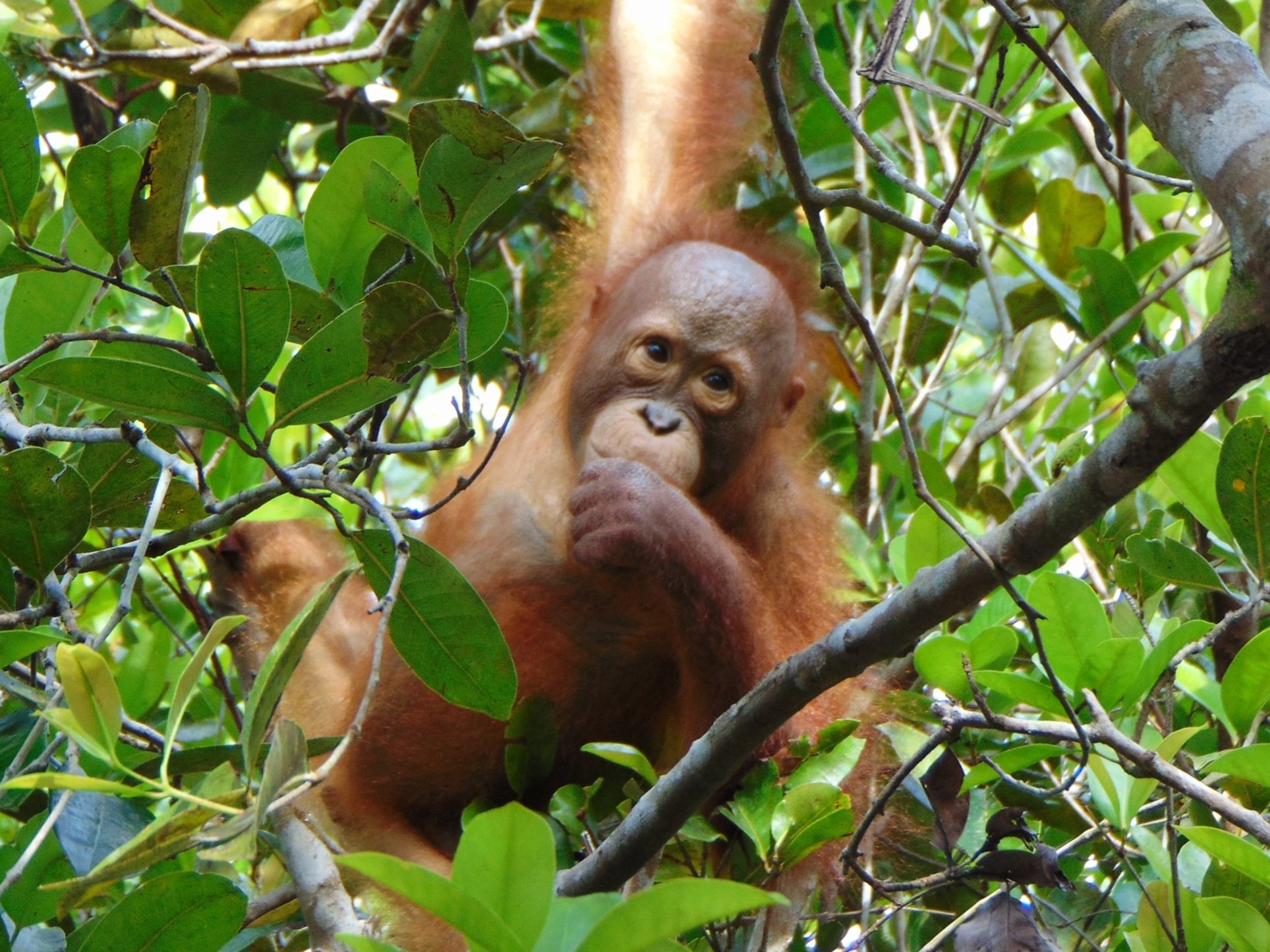
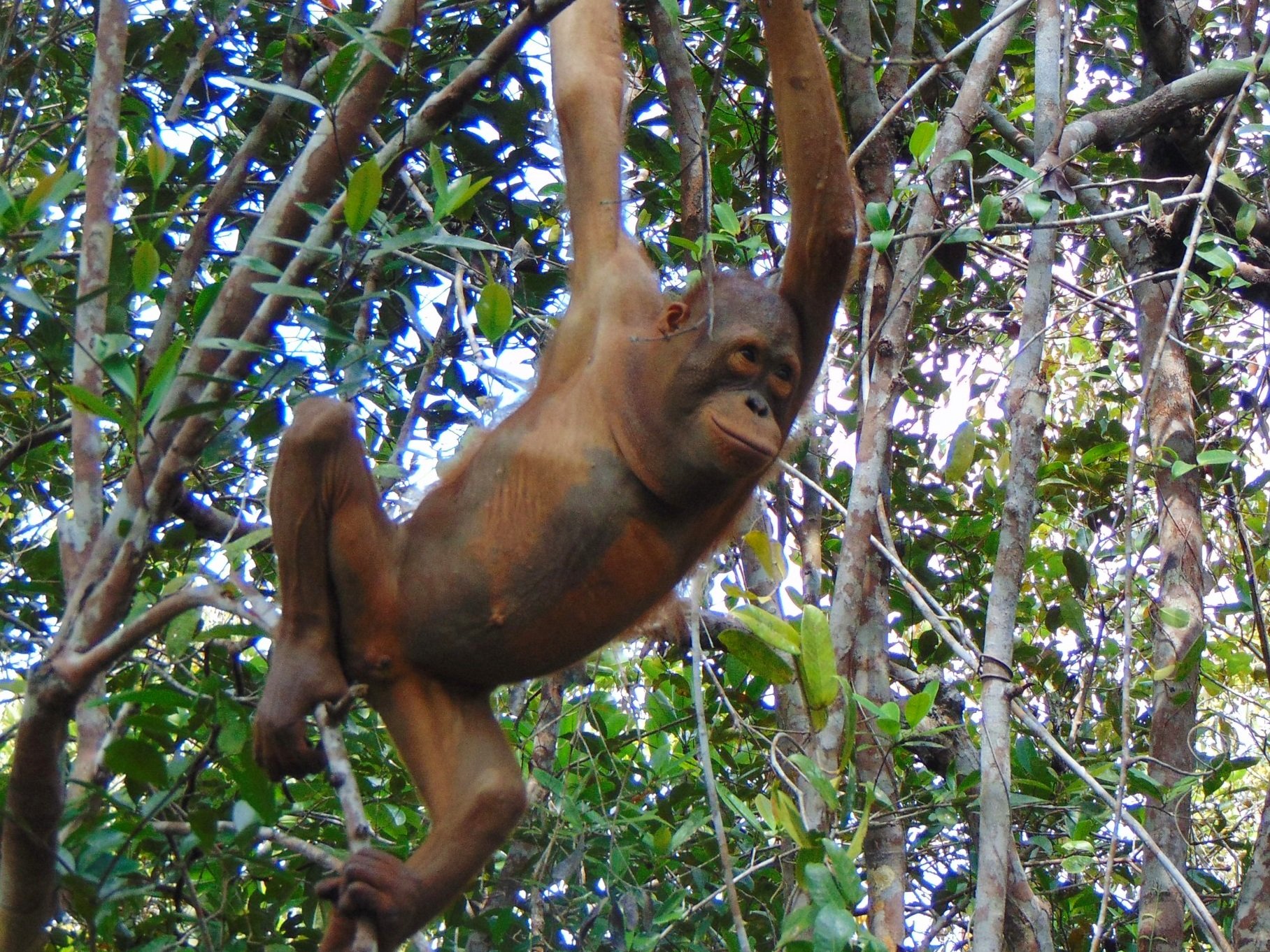
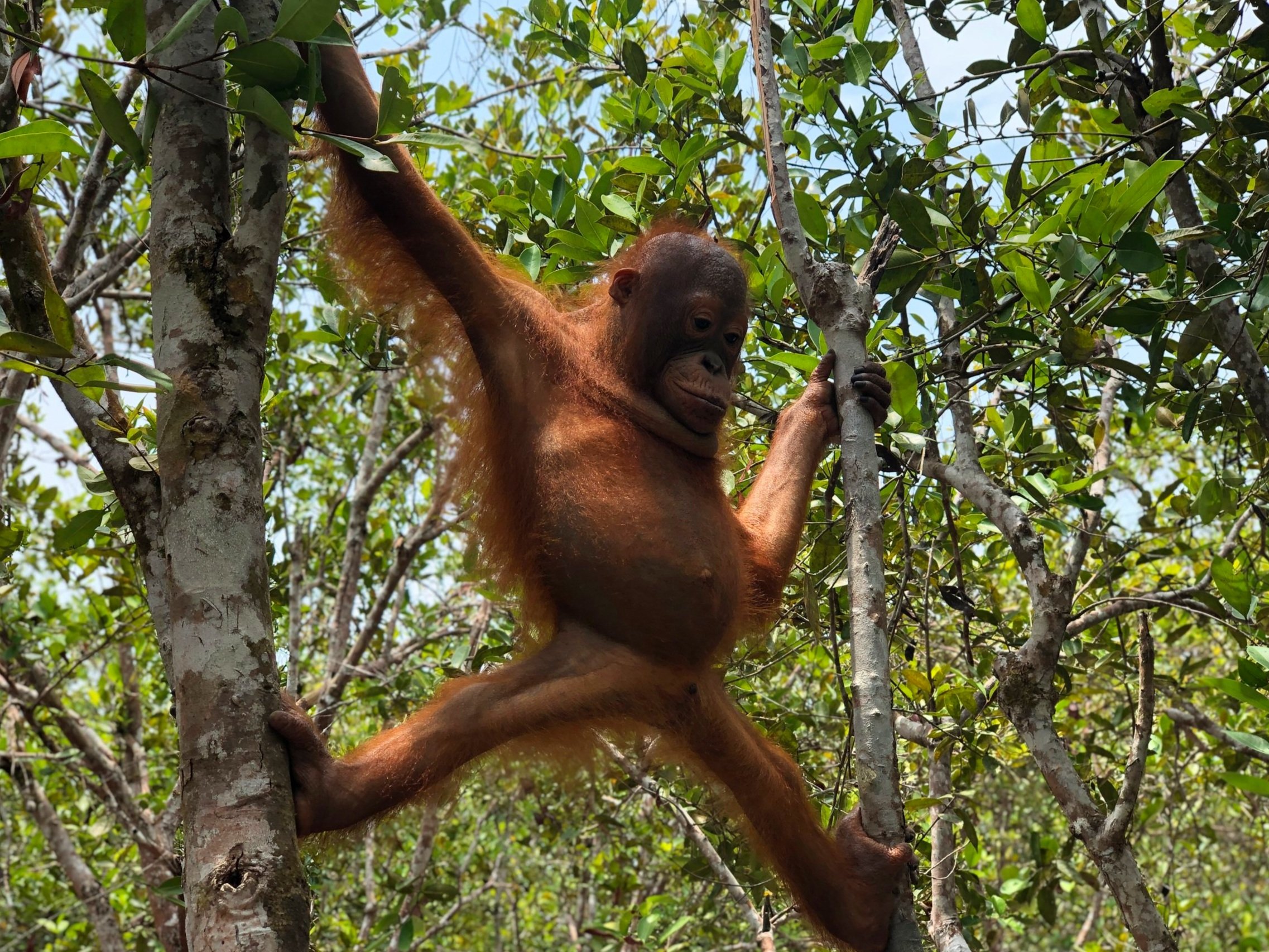
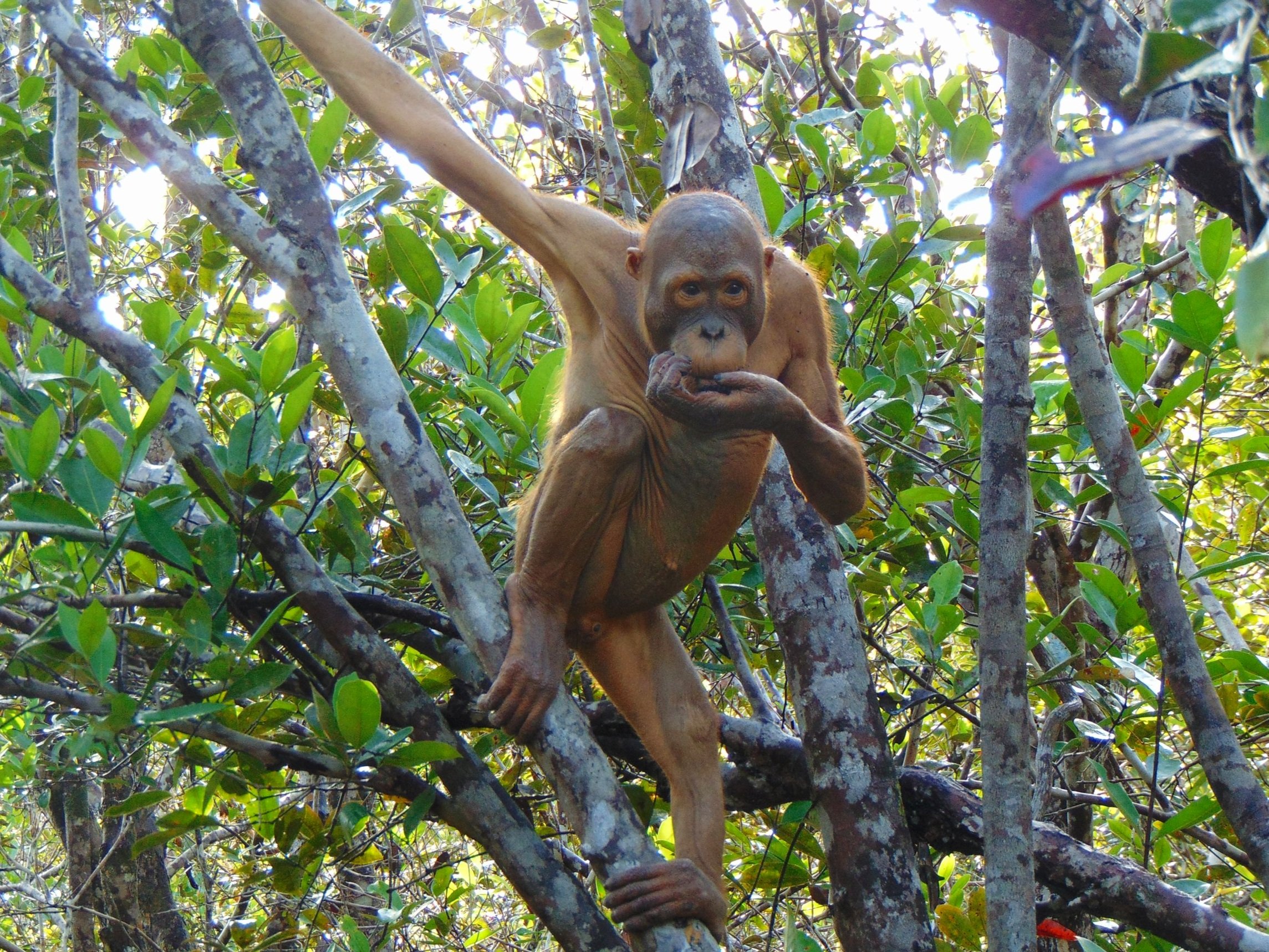
A week after his latest illness, our team were delighted to see that Boy’s blood tests were looking more positive. What’s more, the growing great ape appears to have more energy and has bounced back to his usual active self, frolicking with the others in the forest again. We will continue to keep a close eye on Boy’s health as he progresses and we look forward to the day when he will be experienced and strong enough to be released on his own into the wild.
We all have ups and downs, and Boy’s story is another reminder of how like us orangutans can be.
Orangutan Stories: Satria
For some animals, as soon they’re born, they’re ready to explore the wild on their own. For orangutans though, their home in the tropical rainforest is full of potential hazards and often limited sources of food. They consequently must observe and learn from the teachings of their mother before they can be truly independent. This is a complicated process however, and can take 6-8 years for an orangutan to be fully prepared, longer than any other species in the animal kingdom.
Therefore, to be separated from their mother and kept alone as a pet in a cage genuinely holds back the development of a young great ape. Sadly this is how Satria’s life began, until 2017 when the two-and-a-half year old was rescued from captivity and taken to the forest for the very first time!
In Orangutan Foundation’s soft-release programme within the Lamandau Wildlife Reserve, Satria could finally know what it was like to climb a tree and interact with other orangutans. At Camp Rasak alongside fellow orphan Endut, Satria was taken out into the surrounding habitat every day and gradually built up his range of forest skills. He took to climbing like a duck to water, and would often be seen playing with some of the younger wild great apes in the forest, but it would take him a few years to master the most complex orangutan talent- nest-building.
Our staff would take Satria to varying parts of the forest to familiarise him with different areas, and slowly but surely, he perfected the art of building a sturdy overnight nest in the trees. To ease his way into the wilder side, our team then supervised Satria as he spent a night or two in the forest independently. Building up the familiarity with sleeping in a nest he’d built was visibly helping his development, and this month Satria spent five nights in the forest surrounding camp on his own. A big milestone for a young orangutan but he took it in his stride, and it was clear that he was now ready to be released.
Following a final medical check-up from our vet and a negative test for COVID-19, Satria had made it. The time had finally come for him to leave camp for good and become entirely independent!
Satria receives a final check-up and COVID test from our vet before being ready for release
Now a fully-fledged young adult, Satria weighs 30kg. It was therefore a tiring 1km walk for our team and local government staff from BKSDA to carry Satria through the forest to his specially chosen release site. In the presence of Orangutan Foundation Founder and Director/Trustee Ashley Leiman OBE, Satria’s travel crate was eagerly opened and he quickly rushed out onto a nearby tree.
In a somewhat nervy start which saw him clambering over his travel crate, Satria seemed more interested in the group that had gathered to see him off, and it was only once everyone had dispersed that he decided to climb up into the trees to explore his new patch of forest. All his preparation had led to this moment and at last he’d graduated from our soft-release programme!
For at least 10 days after his release, our monitoring team will continue to observe Satria’s progress from afar. Already we’re delighted to see that he’s beginning to establish himself in the population of over 600 orangutans in this Reserve, and who knows, in the future we may see Satria become an impressive dominant male orangutan in the forest. For our team, there could be no greater reward!
Orangutan Stories: Kotim & Torup
How time flies. It’s remarkable to think that it was six years ago this month when orphaned orangutans Kotim and Torup were released back into the wild after graduating from our soft-release programme. It feels like only yesterday, and Orangutan Foundation Director/Trustee Ashley Leiman OBE remembers it well:
“It’s always a joy when orangutans leave our care and successfully return to a life in the wild. When possible, we time the release dates for when I’m out in the field and I was delighted to be present to see Kotim and Torup beginning their independent life in the forest…
…Kotim and Torup were two young orphans that were found on community land in 2014 and brought to our soft release programme at Camp Rasak. After two years they had shown competence in orangutan skills such as finding food and making a nest to sleep. They were spending more and more time out in the forest, and it was getting harder to get them back – we knew that they were ready to leave.
They were carried by piggyback about 1 kilometre further into the forest. When the assistants lifted them down and put them on a tree, they instantly climbed high into the canopy. Torup went first and immediately started eating leaves, a great sign that he was both relaxed and capable of looking after himself. We stayed for about half an hour, watching ever further glimpses at the canopy level and then they disappeared into the forest. We couldn’t have hoped for a better start…
Kotim in her element in the trees
…For ten days Kotim and Torup were followed by our assistants, who kept an eye on them as they adapted to life in the wild. Since then, Torup has never been seen again, but Kotim comes back every now and then, and has befriended a few orangutans that are currently in soft release.
For the assistants who have been with them every day for years, releases can be an emotional time. For me, I just love the moment when the cage opens or the orangutans are set on a tree and instantly they’re orangutans – they can do this and they know what to do...
…I find it fascinating that a young orphan can make a nest without its mother there to teach it. Is it imprinted from the short time they are with the mother, or is it just written into their being like a computer code?
We don’t have to teach them orangutan skills, we just facilitate and watch until they’ve mastered it themselves. When we rescue orangutans and bring them for release in a transit cage, we take them by boat to the edge of the river, open the cage and they’re gone – straight up a tree as if they’ve never been away.”
Releasing an orphaned orangutan back to the wild is no doubt an incredible feeling for our team, but there’s a lot of hard work needed to care for a young active great ape. Adopt an orangutan in our soft-release programme for yourself or as a gift today and you can give a helping hand to primates like Kotim & Torup!
Orangutan Stories: Timtom
In the wild, a nine-month-old orangutan infant is entirely dependant on their mother. A mother picks the correct food for them to eat, carries them by their side through the forest, and builds a nest every night to shelter in.
Timtom at nine-months-old however was not able to rely on her mother for guidance. Somewhere along the way she had been separated from her mother and in 2016 was rescued from life as a pet by local government officials BKSDA Kalimantan Tengah. To offer Timtom a second chance of a wild future she was entrusted into Orangutan Foundation’s soft-release programme for orphaned orangutans where instead of climbing the bars of a cage, she could climb trees every day in the Lamandau Wildlife Reserve.
Timtom gets to grips with the forest in the soft-release programme
In the safety of a protected forest, Timtom has matured over the past six years from the shy and hesitant infant we first met, into a healthy and self-assured young orangutan. Timtom shares her temporary home at Camp JL with three other orphans and enjoys climbing with them in the trees. Most days she’s taken to the forest with Boy, a male orangutan 18-months older than her, but when she begins to tire in the afternoon Timtom often makes her way down to the forest floor to play on her own. This is where her unique personality really shines through!
According to our Reintroduction Manager Mr. Azhari, Timtom is an adept climber and has no difficulties scaling the tallest trees but instead she prefers to roll around and play on the forest floor. Perhaps as she’s spent time with humans from such an early age, Timtom has become accustomed to a life on terra firma and has no problems letting her fellow campmates play together in the trees while she’s down on the ground.
Timtom plays her favourite game at Camp JL
Timtom’s inquisitive nature is truly on show when she’s exploring the leaf litter on the forest floor. When she’s not digging a deep hole with her hands and rubbing sand on her head, she’s seeking out the nearest puddle to rummage in and spread wet mud all over her face. It may be messy but in the heat of the day it is a great way to cool off!
Timtom spends her playtime in puddles on the forest floor
This playful and somewhat childish behaviour is certainly entertaining for our team to watch but it also shows that Timtom is not yet ready to be released into the forest on her own. While she may be a talented climber in the trees, she’s not begun practicing nest-building like the other great apes at camp, an essential skill for any wild orangutan.
Our staff have seen other young orangutans put their juvenile behaviours behind them and have successful releases into the wild, so we are confident that with more time Timtom will be able to join them in the forest. Until that day comes, we will continue to provide Timtom will all the support she needs to be the wild orangutan we know she can be.
Orangutan Stories: Brian
One might think that when an orangutan is rescued and released into the wild- it’s plain sailing from thereon in. For inexperienced orangutans like Brian however, it can take a while to find your feet in the challenging life of the forest.
Brian was originally rescued as a pet. The whereabouts of his mother are unknown.
In 2009, after quarantine Brian was brought to Camp Gemini in the Lamandau Wildlife Reserve by government officials (BKSDA) so that he would have the opportunity to integrate into the surrounding orangutan population. At three years old and without his mother to learn from, Brian needed a role-model to help him adapt to this new environment. Fortunately, female orangutan Rosa did not have an infant of her own at the time and showed compassion in taking Brian under her wing. Together they formed a strong pair, and from his surrogate mother Brian was taught the basic forest skills required to survive in the forest.

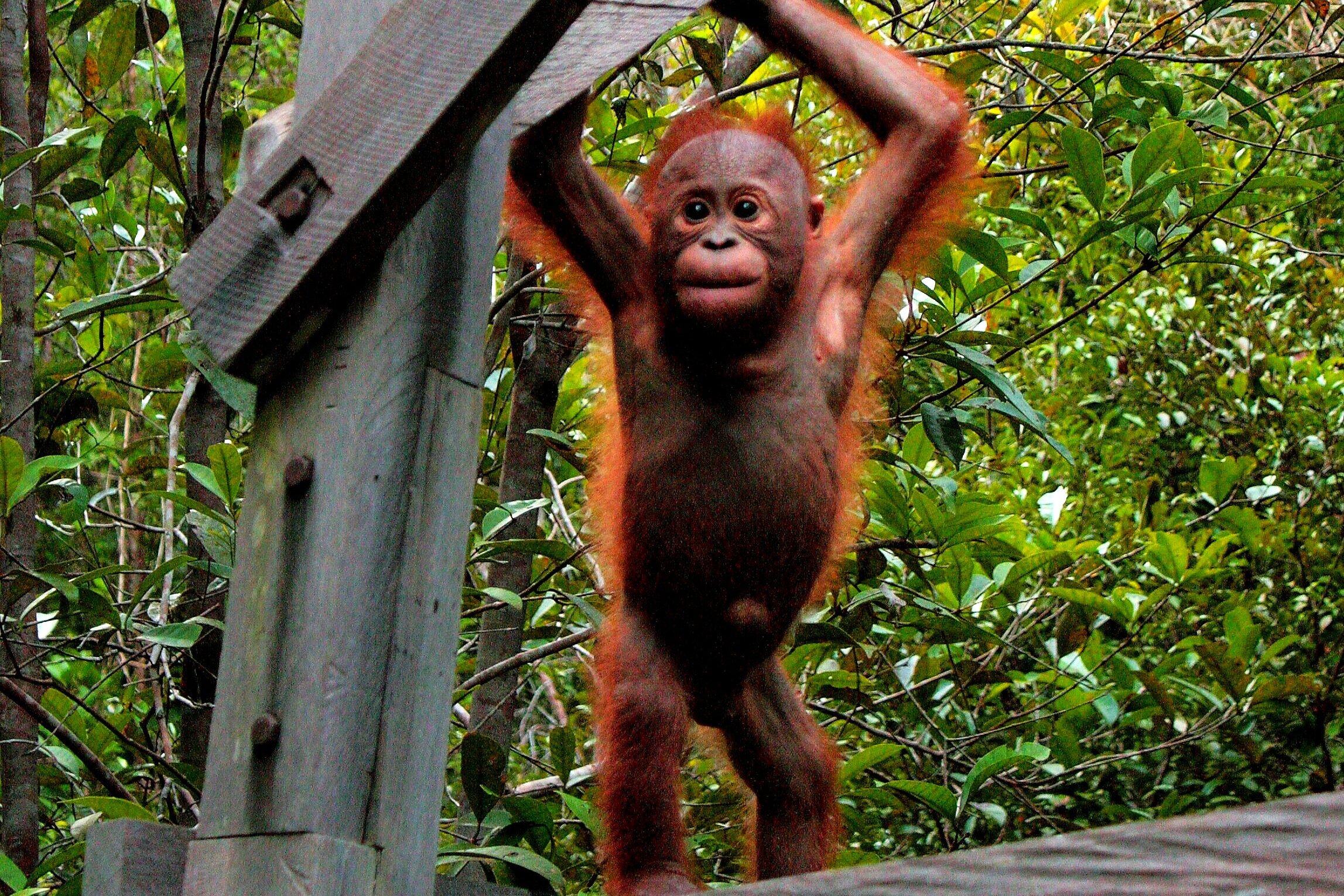
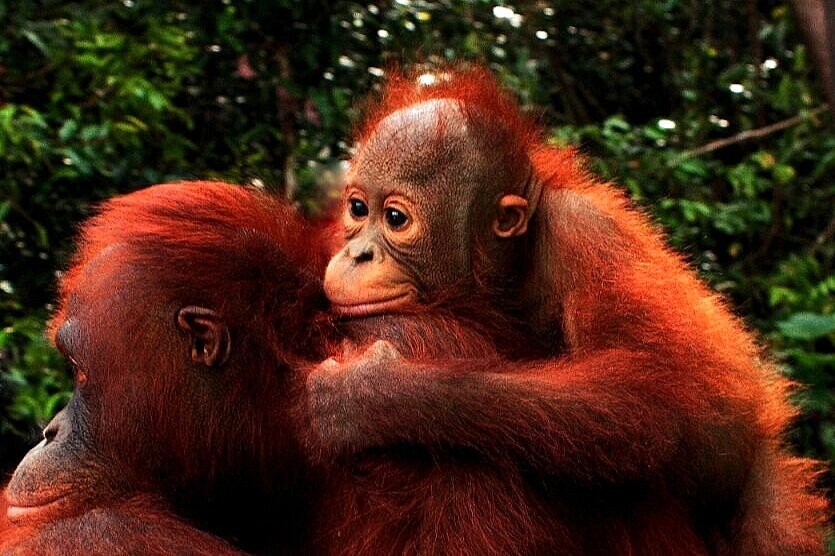
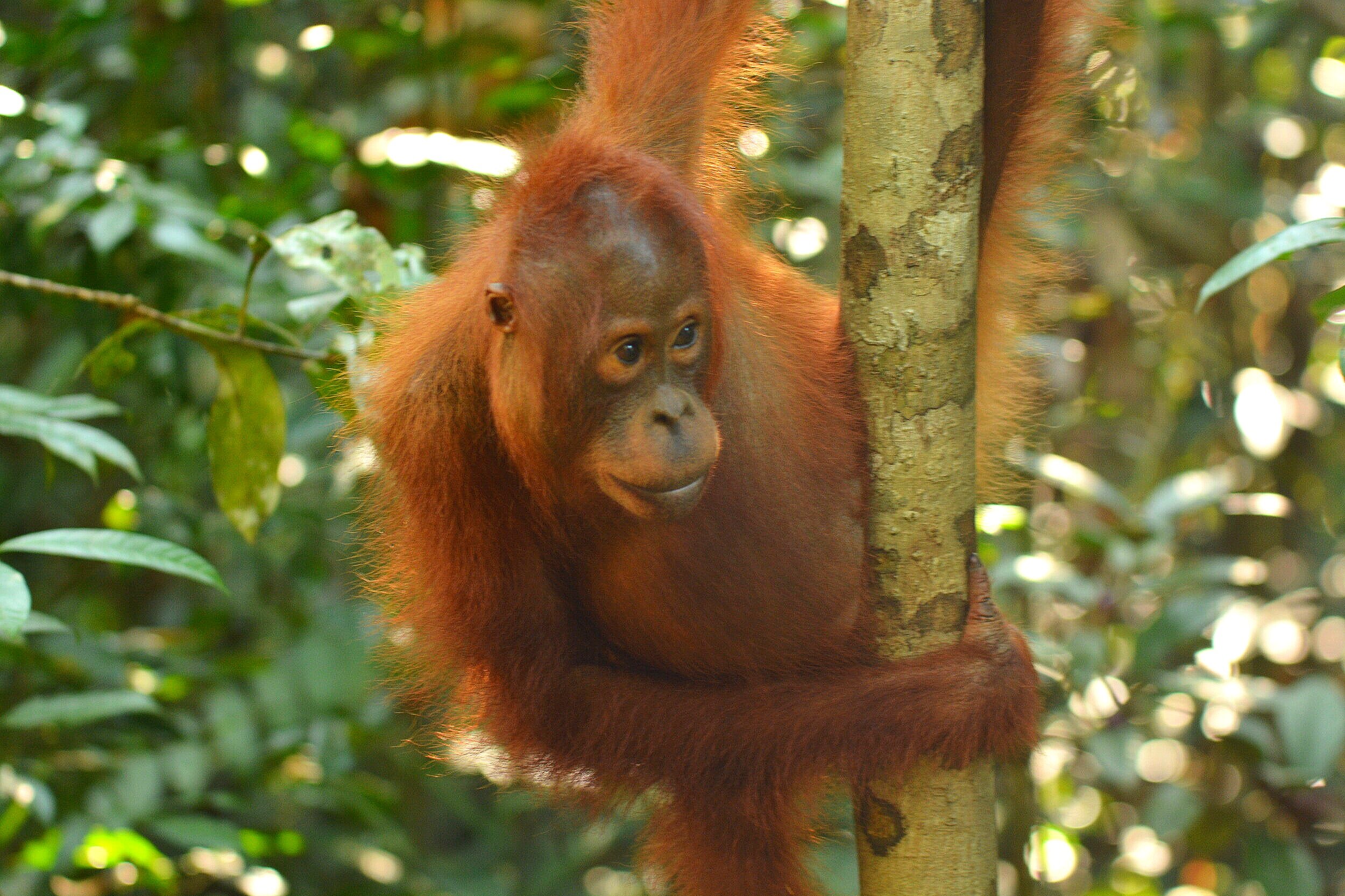
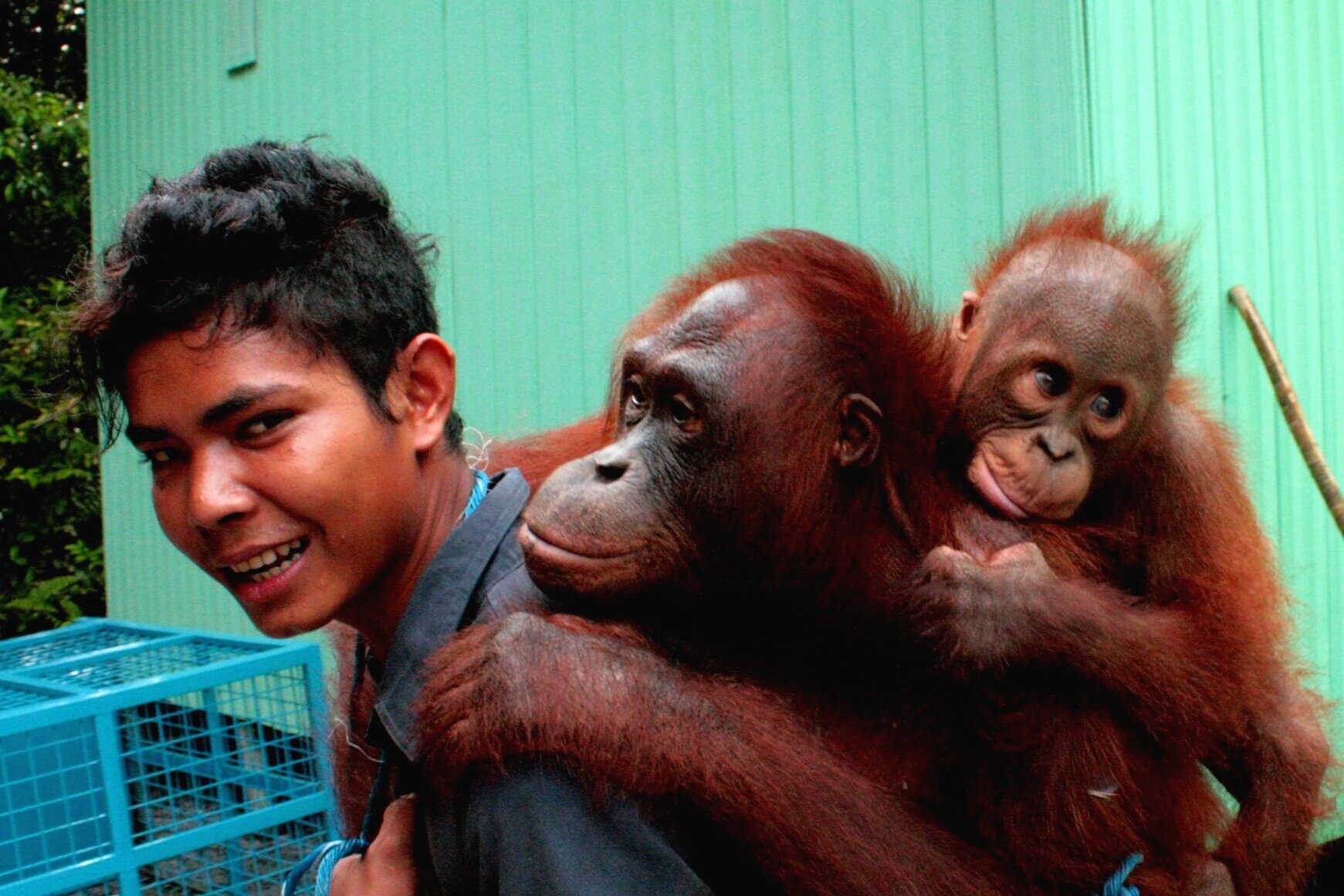
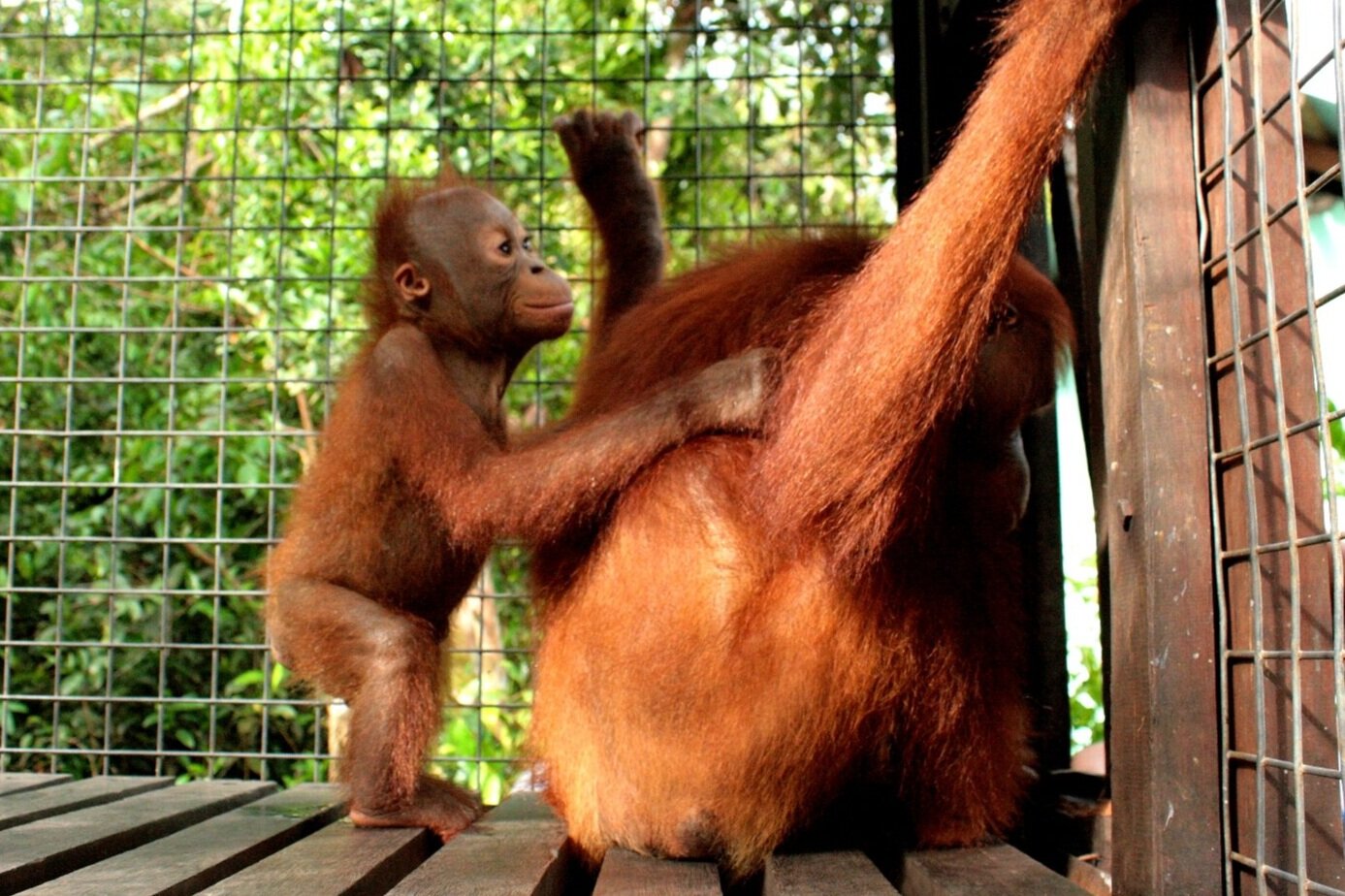
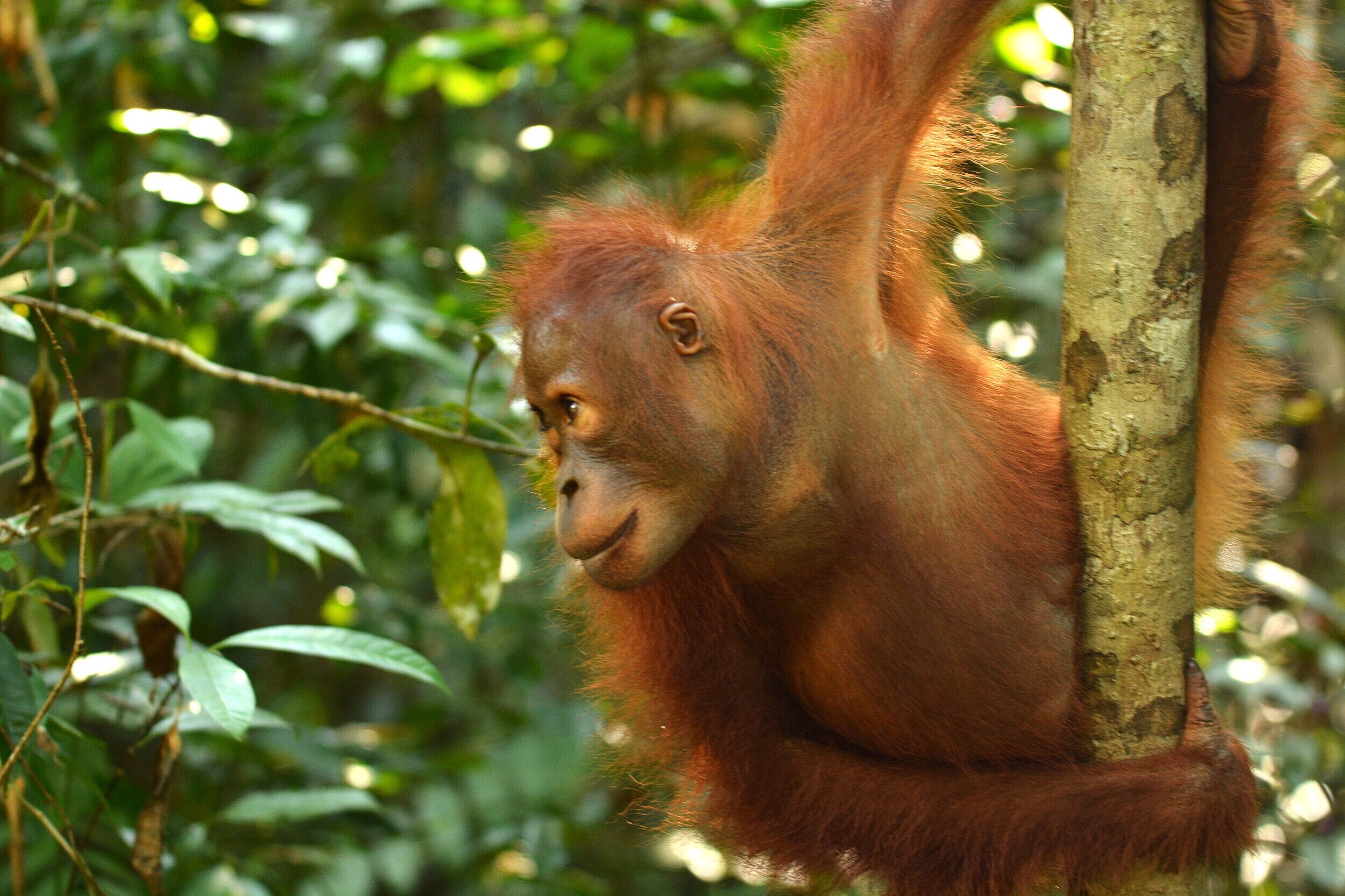

After two years, Rosa gave birth to an infant of her own and began venturing into the forest without Brian in tow. He may have been jealous of Rosa’s new arrival, but it was the push Brian needed to roam the forest independently and become confident in the trees. It wasn’t long until he crossed paths with a larger wild orangutan named Bangkal who has been the dominant male in this area of the Reserve for many years. To his credit Brian did not back down, but following a confrontation with Bangkal, our field team decided that it would be beneficial for Brian to be translocated elsewhere in the forest for his own safety.
Wild male orangutans cover large areas, sometimes hundreds of acres of habitat as they search for a mate or fruiting tree. It’s therefore quite common for their ranges to overlap with other males, leading to quarrels from time to time.
After his relocation to Camp Buluh, Brian was sadly involved in another fracas with a wild male in 2019. Not learning his lesson from his previous encounter, Brian perhaps acted more bravely than he should have and had an unfortunate run-in with wild male Yoko. During this clash Brian suffered severe injuries to his head, body, and arms, resulting in him requiring some emergency treatment and minor surgery from our vet. Despite the slight dent in confidence, with some time to lick his wounds Brian soon made a full recovery and was able to get back in the trees where he belongs.
Our team decided that another relocation to Camp JL would be the best fit for Brian’s return to the forest as there would be fewer competition with dominant males. Now Brian has adapted to this new area of the forest and seems to happily swing in the trees around camp and across the river. His story shows how challenging life in the forest can be for orangutans that are still learning, and also how resilient this critically endangered great ape can be.
Brian has overcome many challenges and is now thriving at Camp JL
Orangutan Stories: Bumi
In June 2017, local government officials from BKSDA informed the Foundation that a young male orangutan had been kept as a pet in a cage and confiscated from a nearby village. Entrusted into the care of the Orangutan Foundation, our veterinary team quickly examined the infant, named Bumi, who was estimated to be around three and a half years old.
Under inspection it was discovered that Bumi, a name that in English means ‘Earth’, tragically had gun pellets lodged in his skin. It’s uncertain how Bumi received these injuries, but likely that he had been shot during his separation from his mother. Fortunately, our expert team where able to remove seven gun pellets from Bumi’s body (as seen below), and he successfully entered into the Foundation’s soft-release programme for orphaned orangutans in the Lamandau Wildlife Reserve.
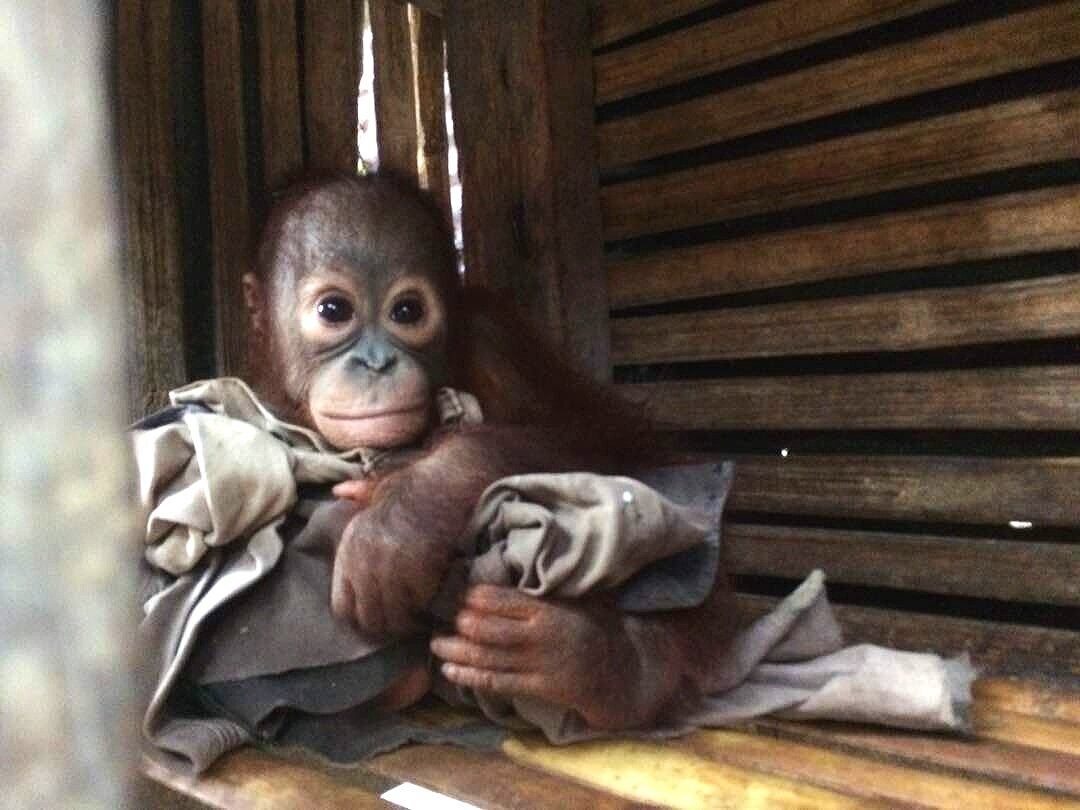


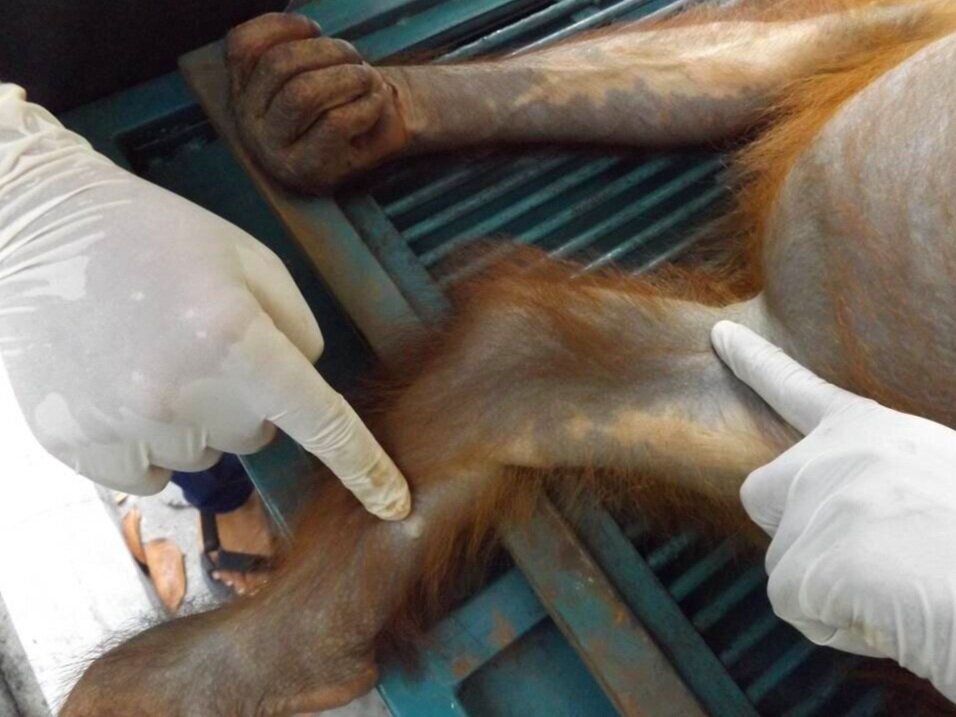
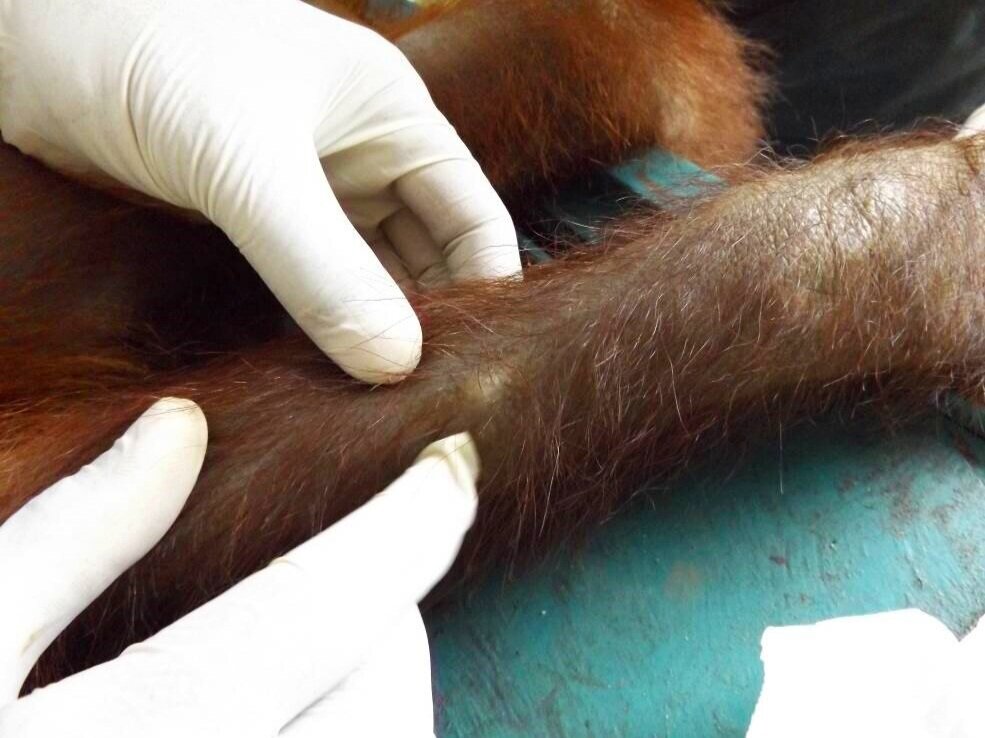
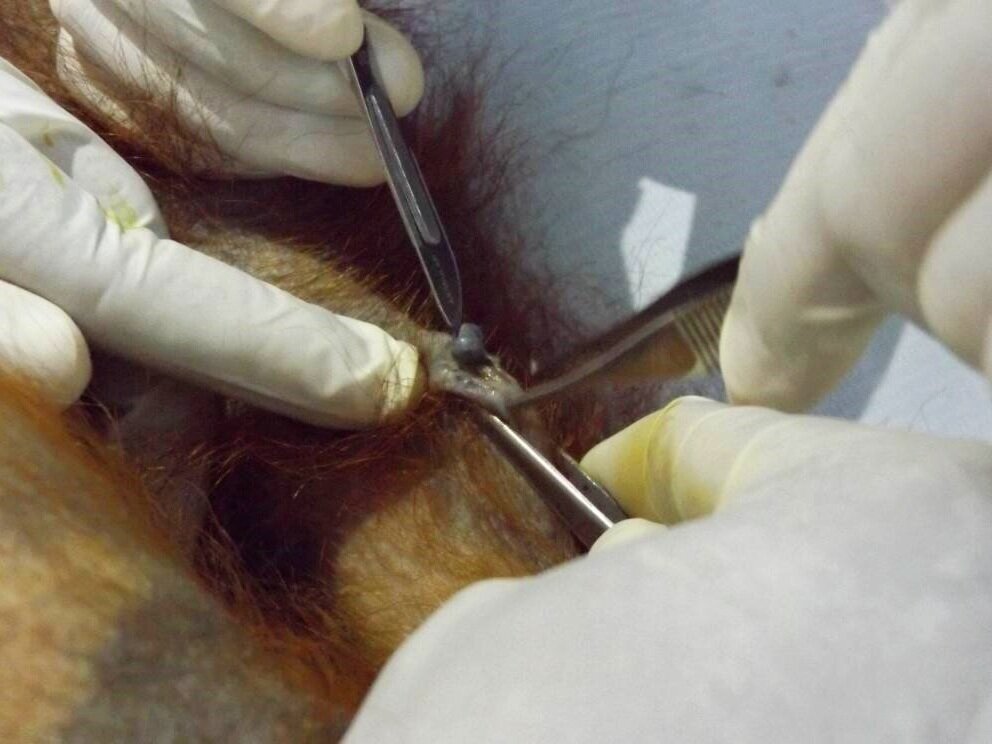

Alongside Endut and Satria at Camp Rasak, in the soft-release programme Bumi has been able to practice pivotal skills such as nest-building, climbing, and searching for food in the natural environment of the forest. A fast learner, Bumi quickly began showcasing his nest-building ability from a young age in his enclosure.
Bumi’s progress from when he first arrived has developed remarkably well. Now at around seven years of age he is growing into a strong young male orangutan, confident climbing and searching for food in the trees, and capable of building large sturdy nests.
Under the close watch of our field team, Bumi has even been able to stay out overnight to become more habituated to forest conditions. Not all conditions however, as when it rains Bumi will often run back to shelter in the safety of camp. Once truly independent, he will be ready to be released.
Following his latest medical check-up, Bumi was given the all-clear for potential illnesses such as Hepatitis, and received supplementary vitamins to help him stay healthy. With this clean bill of health it could be only a matter of time until Bumi will be released into the forest. This is a tremendous achievement for this spirited young orangutan, especially taking into account his difficult early life as a pet.
Orangutan Stories: Labetty and Suwita
Forget the wet and dry seasons, for the orangutans of the Lamandau Wildlife Reserve at the moment it appears to be baby season! Following the news of Pauline and Queen both giving birth in recent weeks, we are thrilled to report two more additions to the forest from first-time mothers Labetty and Suwita.
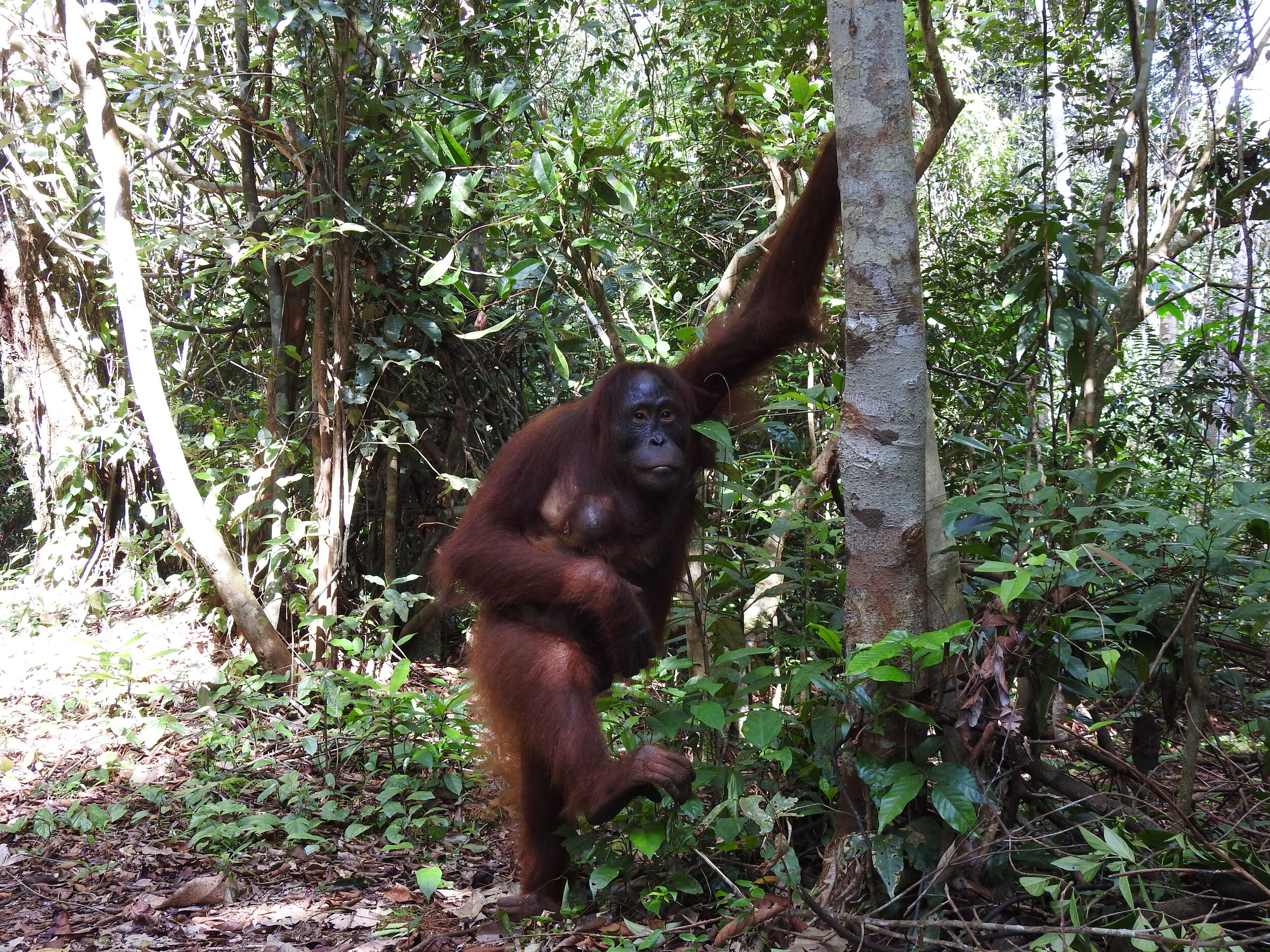

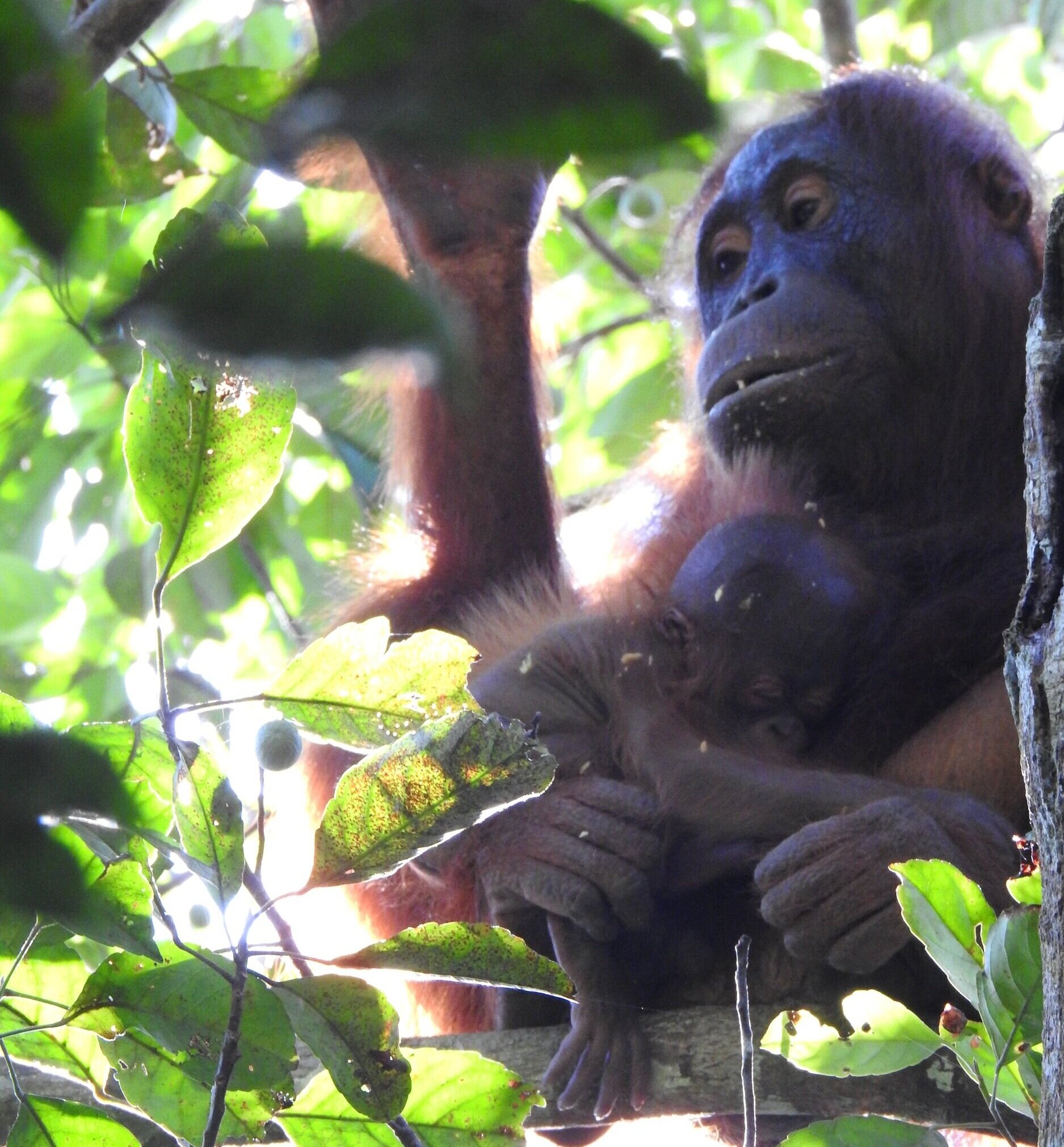
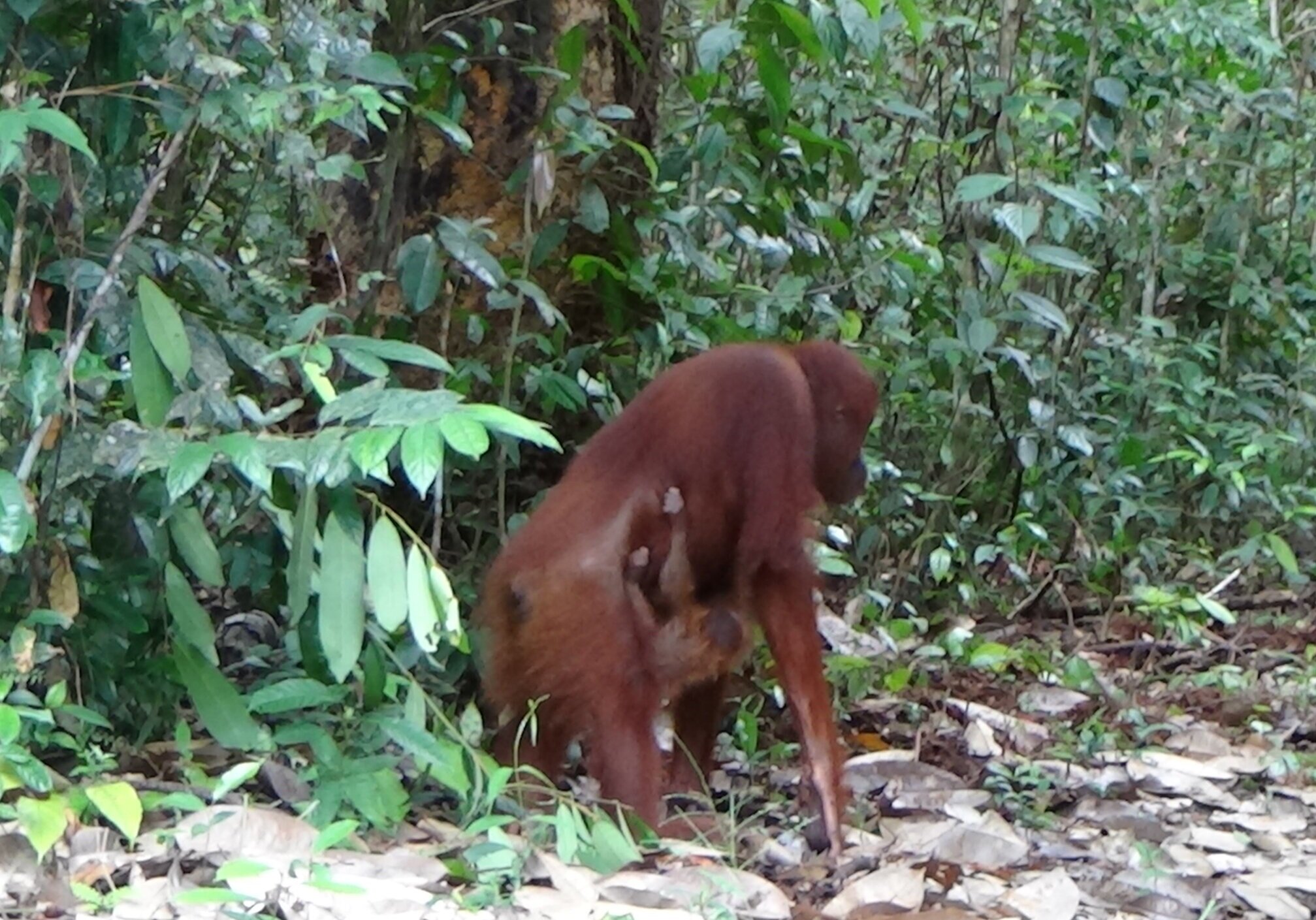
It’s not always easy to identify a pregnant orangutan as the signs can be subtle, but in recent months our teams have been keeping a watchful eye on a handful of females who appear to have slightly enlarged bellies, genitals and appetites; one of whom has been Labetty (above).
Labetty is a wild orangutan who our team at Camp Rasak have been observing on her occasional visits since her birth in 2007. Despite her larger size in recent months however, Labetty still appears to be one of the fastest orangutans in the forest and seems to glide through the trees with speed and elegance, regardless of her pregnancy. It was predicted that Labetty would give birth in around a month’s time so it was somewhat of a surprise when she was spotted this week with her new baby, identified as a male.

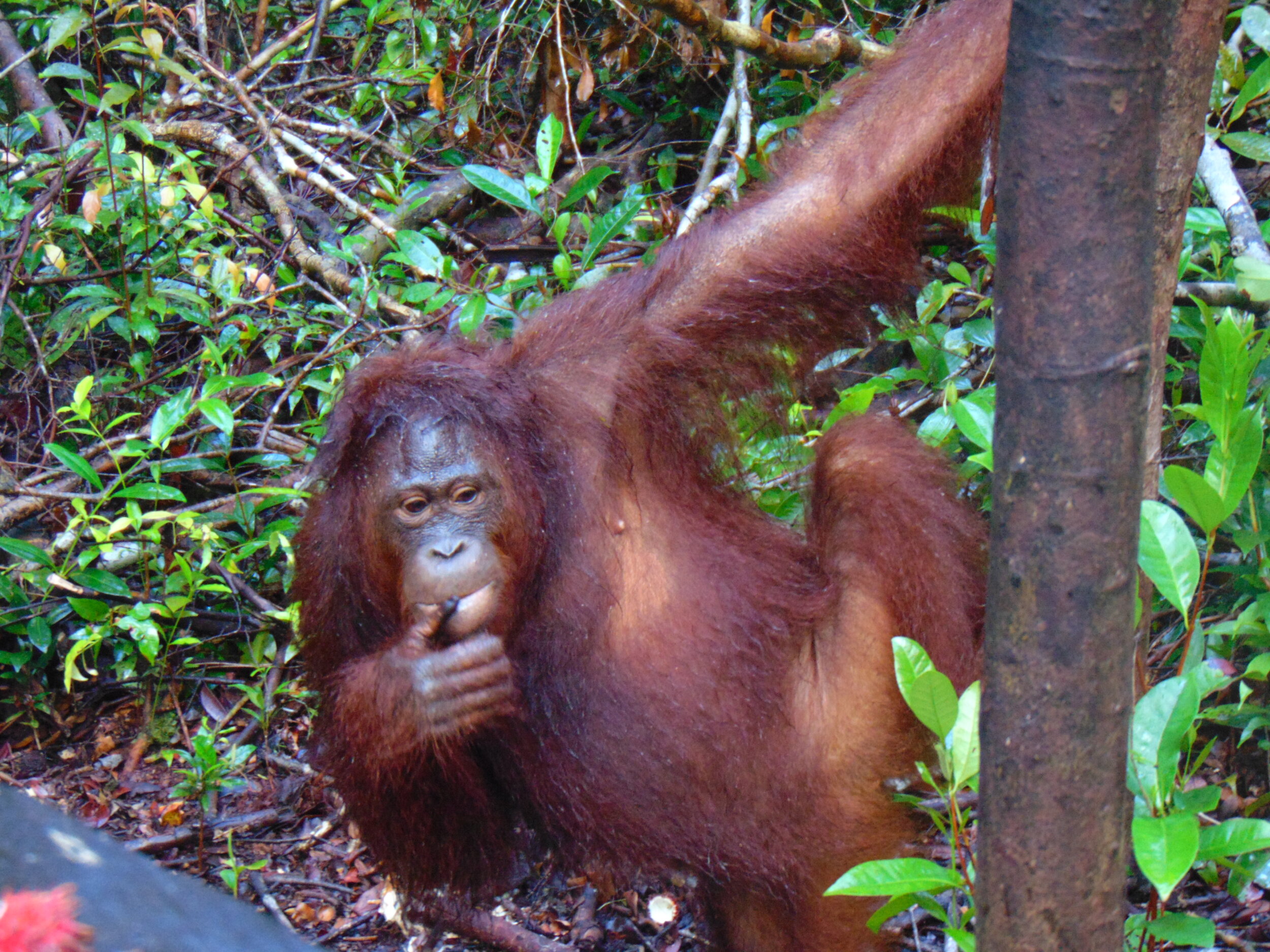


It would be fair to say that Suwita (above) has also surprised our team this week. It wasn’t until relatively recently that Suwita was identified as another pregnant female, but the duration of her gestation period was unknown. With wild orangutan males Ewet and Tole also spotted from time to time at Camp Rasak, it was thought that one of these males (most likely Ewet) must have mated with her at some point, but when? It wasn’t until this week when Suwita was observed with her young infant that our team knew she must have mated around 9 months ago.
The sex of Suwita’s new baby is currently unknown but our field team and veterinary staff will continue to monitor the progress of her and Labetty in the coming months. We look forward to collecting and sharing footage of the pair caring for their new infants in the forest very soon.
Through their new infants, Suwita (left) and Labetty (right) are contributing to a more secure future for this orangutan population.
To witness four wild orangutan births within a matter of weeks is a remarkable achievement and demonstrates how settled this population of great apes is in the Lamandau Wildlife Reserve. For all of us at the Orangutan Foundation, this news truly feels like a fitting reward on the 30th anniversary of our conservation work, supporting these critically endangered primates and protecting their natural forest environment.
Cause for celebration! The first orangutan birth of the year
It was with great excitement and surprise that Orangutan Foundation staff recently caught a glimpse of Pauline, a wild orangutan rarely seen at Camp Gemini, proudly displaying her new two-week-old baby boy.
Our team are thrilled to welcome the first newborn orangutan of the year, and the first offspring for new mother Pauline. Her infant has been named 'Pancaran' by Ibu Siti, the local Minister of Environment and Forestry. It’s heartening that in the Lamandau Wildlife Reserve, orangutans have provided us with some recent good news and encouragement for the future.
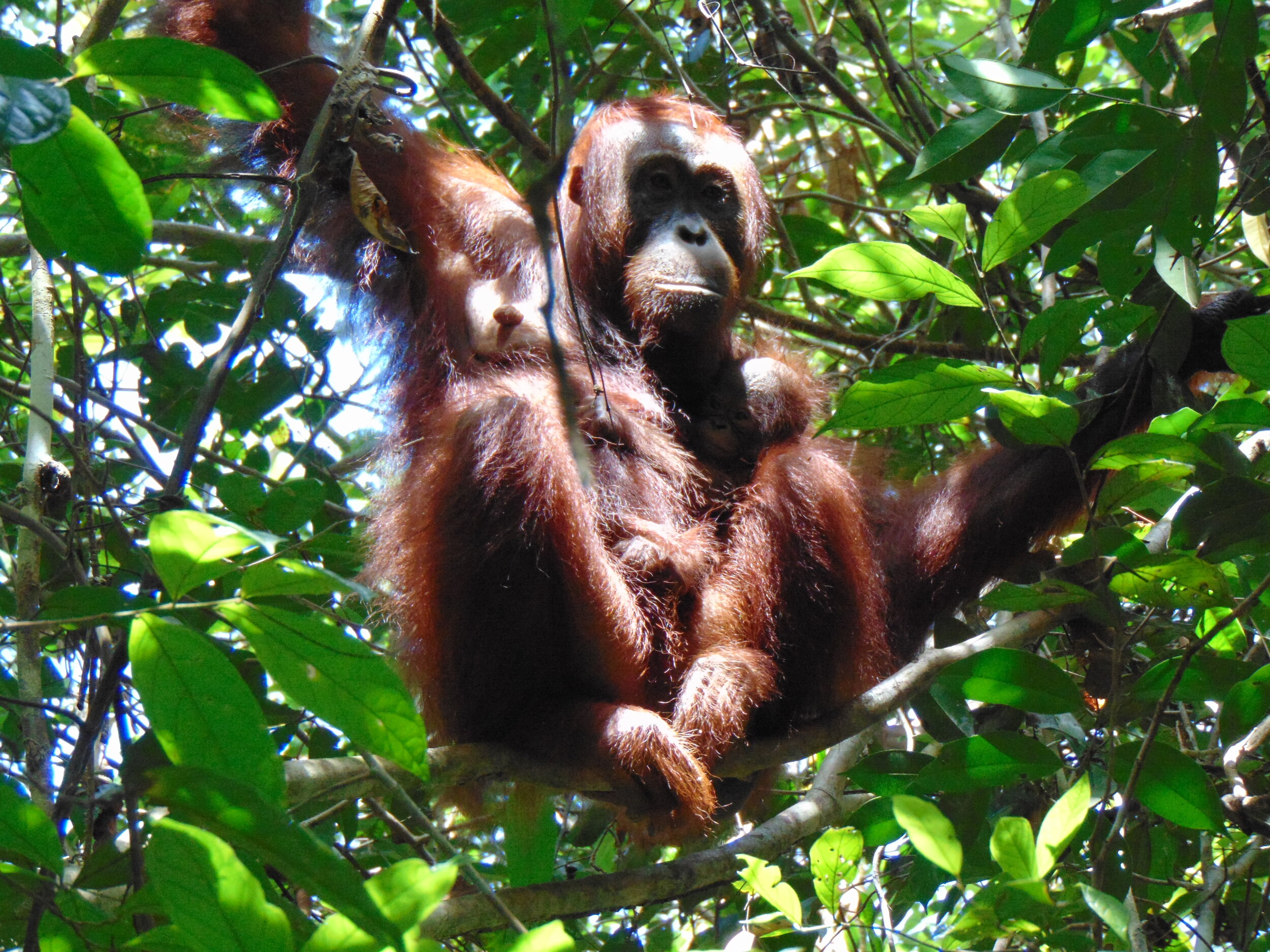
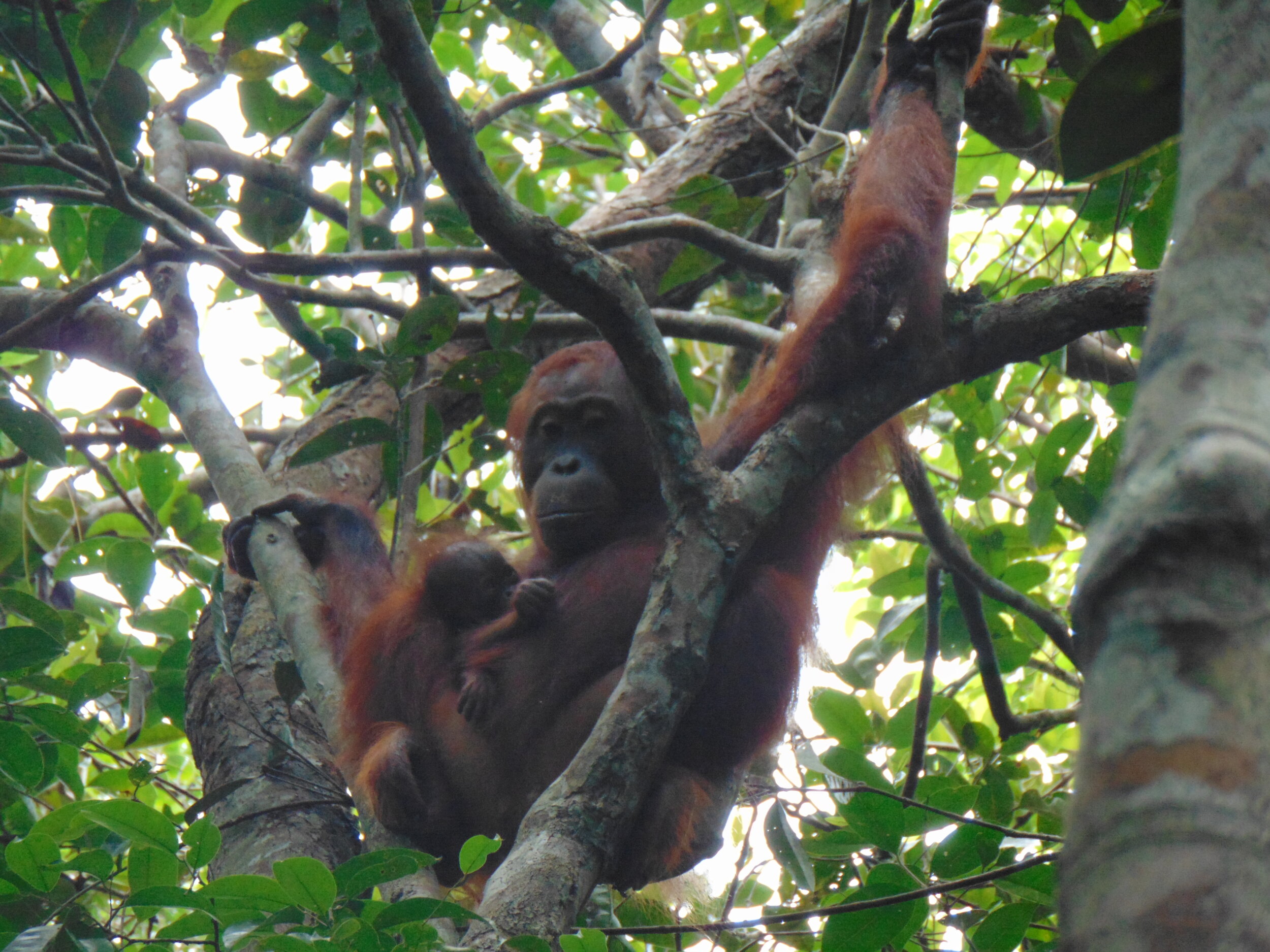

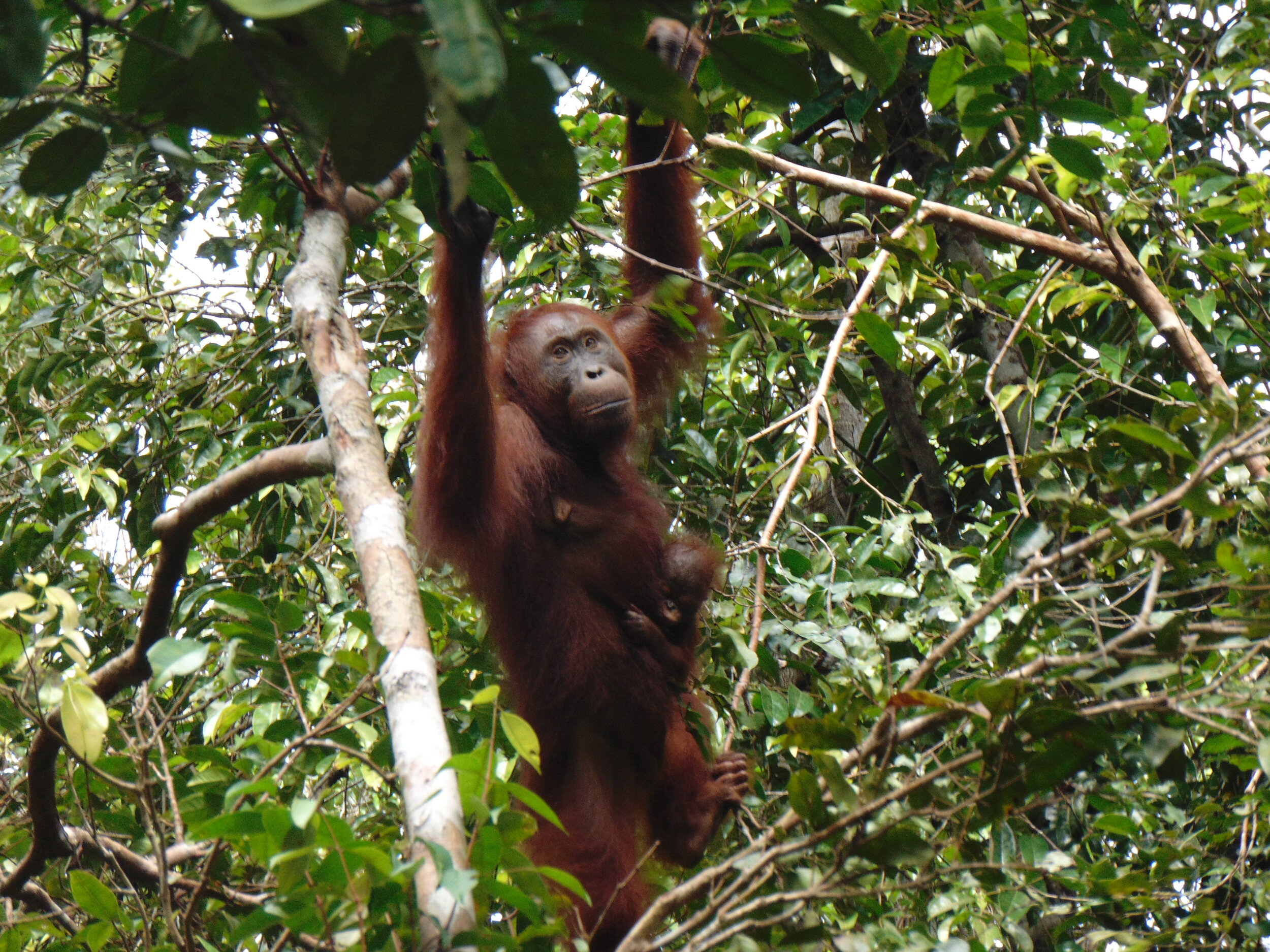
Pauline is the thirteen-year-old daughter of reintroduced orangutan Paula, and spends much of her time in the forest. It’s thought that last year Pauline mated with Carlos, a wild male orangutan who is also sporadically spotted at Camp Gemini. What is just as exciting is that she may not be the only orangutan with a newborn this year, as four other females in the forest also appear to be pregnant.
Betli and Queen have extended bellies and are eating for two at Camp Buluh
Our field teams keep a close eye on all of the wild and reintroduced orangutans that visit our five forest camps in the Lamandau Wildlife Reserve, but are keeping particularly close tabs on Labetty and Suwita at Camp Rasak, and Queen and Betli at Camp Buluh who may all be expecting newborns soon. Hopefully providing a bumper year for orangutan births in the forest.
Despite her pregnancy, Labetty is still a speedy climber though the forest
Orangutans take many years to rear their young, which is why having observed 15 births in the past five years alone, our team are proud to see that the Reserve is clearly a habitat in which these critically endangered great apes are not only surviving but thriving. We will continue to protect this vital orangutan stronghold, and look forward to welcoming more new arrivals in the coming months.
Orangutan Stories: Adib
Adib is the youngest male orangutan among the ten orphans currently in Orangutan Foundation’s soft-release programme. Despite his young age, Adib has experienced and endured a great deal in his early life.
Once entered into the soft-release programme, Adib takes his first ever climb into the trees.
Adib was raised as a pet until he was rescued in 2017 at around one and a half years old. Orangutans of his age in the wild would be entirely reliant on their mother in order to learn necessary forest skills and receive proper nourishment. With the likelihood that his mother was killed, it was therefore vital that Adib should receive appropriate care in the Foundation’s soft-release programme and develop in a natural environment.
Adib shares his current surroundings with four other orphans at Camp JL within the protected forest of the Lamandau Wildlife Reserve, Indonesian Borneo. Each morning these young primates climb out of their overnight enclosures and enthusiastically swing between branches, forage for food, and practice nest-making skills around camp. With no mother to keep a watchful eye on them, it’s the role of our expert team of assistants to ensure that these orphans stay safe.
When climbing high in the canopy is involved, there is always a danger to these adventurous young orangutans and accidents can still happen, as Adib discovered himself in December 2018. As he practised his climbing by stretching between branches in the trees, Adib accidentally fell to the ground and appeared to be in some discomfort. Following emergency X-rays, our vet Dr Dimas discovered that Adib had a small fracture in his right arm and required a temporary cast in order to hold it in place.
Fortunately at such a young age Adib’s bones are able to heal more rapidly, and ten days after his accident, he was able to grip fruit and hold onto camp staff as they held him.
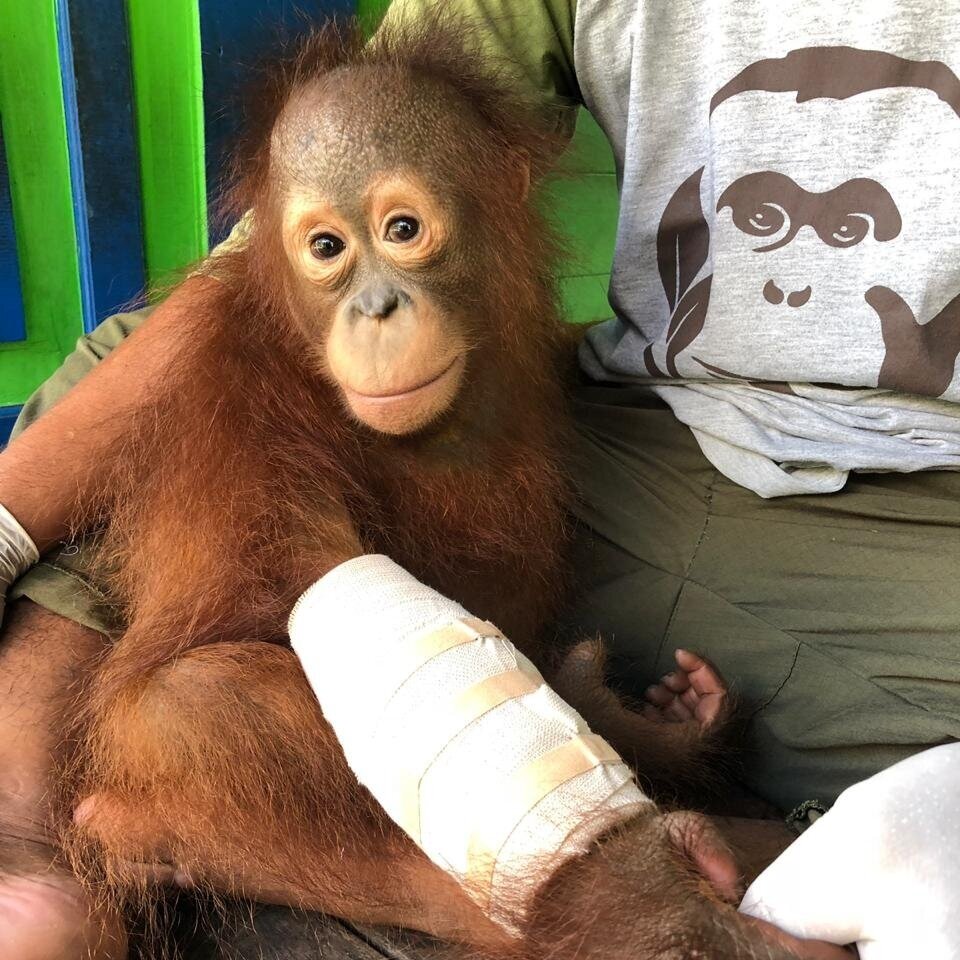
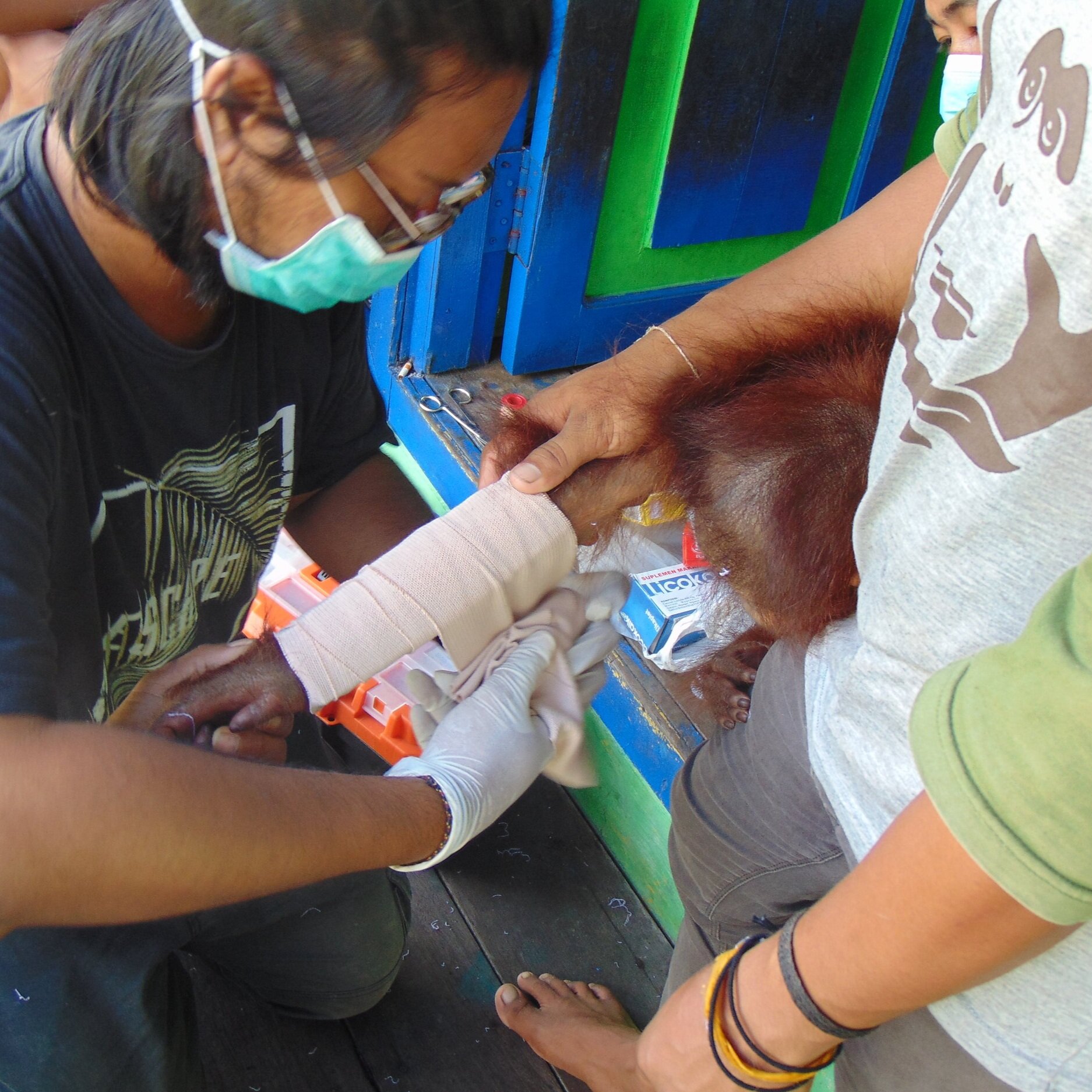
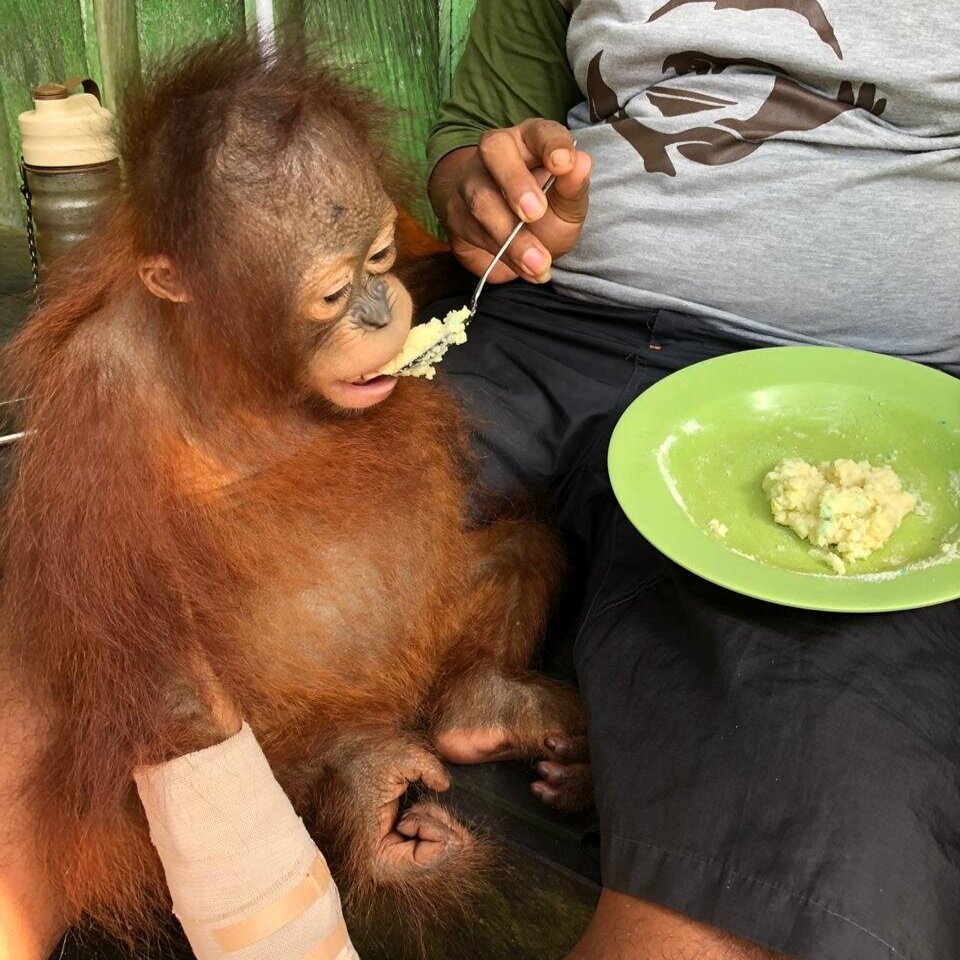
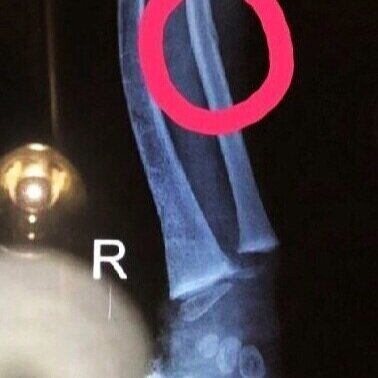
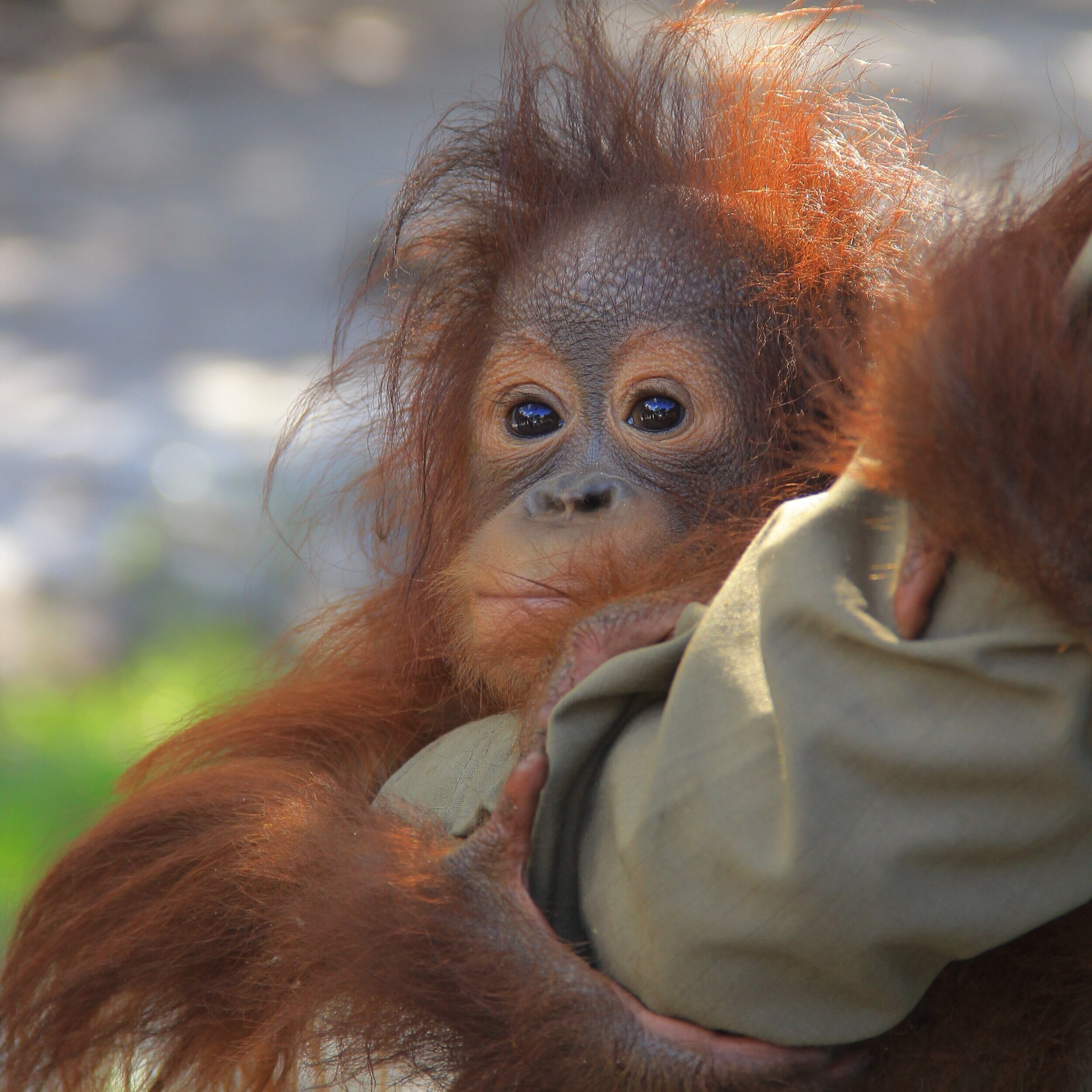
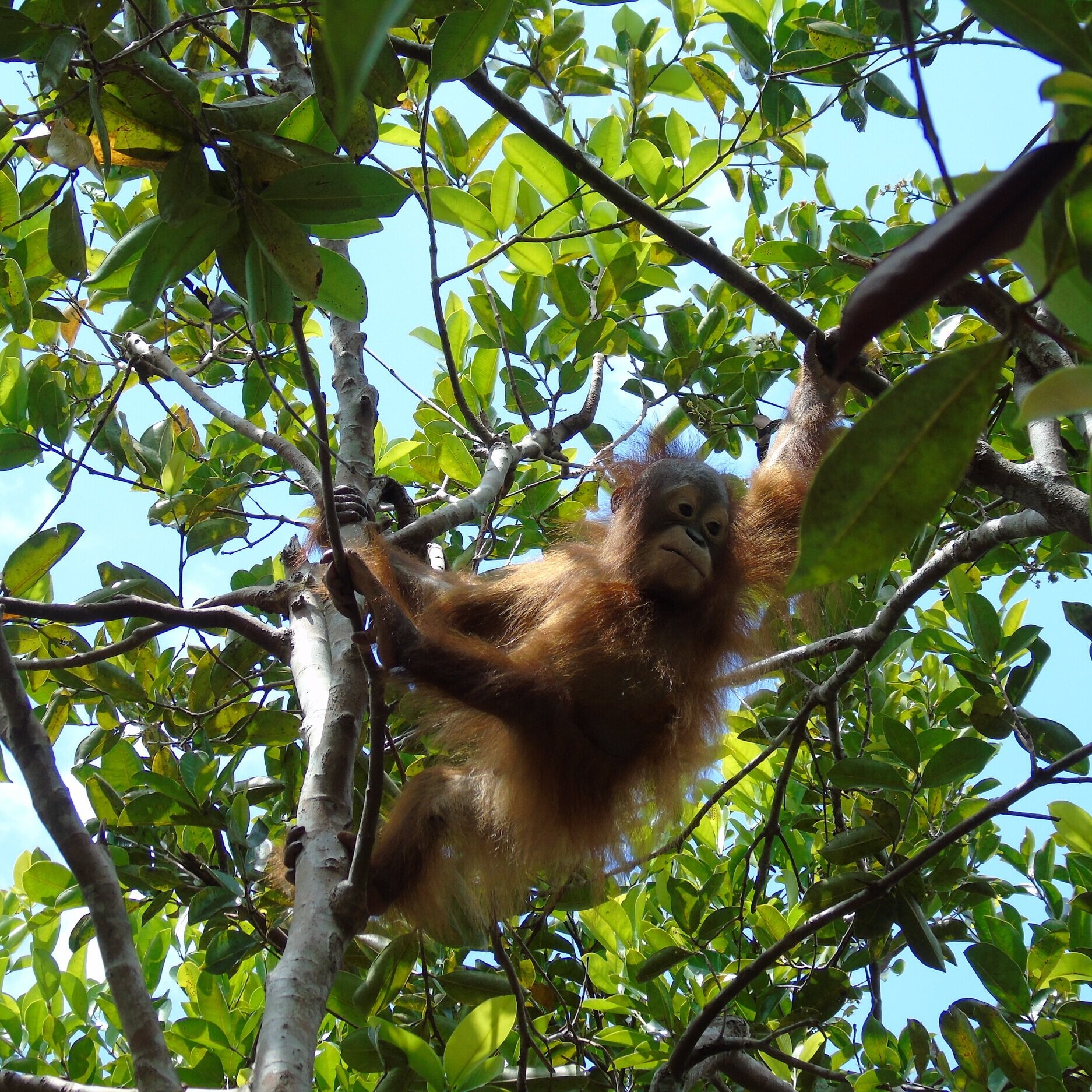
Despite what must have been a painful time for Adib, it hasn’t stopped him from being adventurous and active in the forest today. Now at 4 years of age, he’s beginning to master the art of climbing through the trees in search for food, but still has some time to go before he becomes an expert nest-builder.
Our team are encouraged by the progress Adib has made since his time in the Foundation’s orangutan soft-release programme and look forward to the day that he will be fully prepared for an independent future in the wild.
30 years and counting
This year at the Foundation we are celebrating an important milestone- 30 years of conservation.
30 years protecting the critically endangered orangutan. 30 years on the front line guarding the vulnerable tropical forests of Borneo. 30 years collaborating with local people with environmental education and sustainable land-management practices.
The Orangutan Foundation’s programmes and primary focus is in Central Kalimantan, Indonesian Borneo. Our country office in Pangkalan Bun is responsible for the livelihoods of 55 staff, all of whom are Indonesian from local towns and villages. This means that our dedicated workforce are fully appreciative of their surrounding environment and understand the importance of protecting their nearby forests.
In spite of the difficulties that we are currently all facing around the world, the threat to tropical forests in Borneo remains a constant, and our 10 guard posts are still alert to monitor any cases of illegal activity. These posts contain fire-fighting equipment and continue to play a vital role in protecting over half a million acres of forest across the Lamandau Wildlife Reserve and Tanjung Puting National Park (below).
The Foundation’s five post release monitoring camps within the Lamandau Wildlife Reserve (above left) continue to oversee reintroduced orangutans and the 10 young orphans currently in our soft-release programme. These orphans have been rescued from a life in captivity and offered a new chance of a future in the wild by learning essential skills in the safety of a protected forest.
Elsewhere in Tanjung Puting National Park, our remote camera traps are recording a fascinating insight into the diverse forests surrounding Pondok Ambung Tropical Forest Research Station (above right). Clouded leopards, tarsiers, sun bears, proboscis monkeys, and false gharial crocodiles are a handful of the unique species that continue to be observed and studied closely here.
Meanwhile, our Habitat Restoration Programme has also been active in recent months. To date over 75,000 tree saplings have been planted since the devastating forest fires of 2015, and our team of experts are still diligently cultivating a new generation of saplings to reintroduce into the wild. We hope that these young plants which are more resistant to fires, will soon help rejuvenate new patches of forest and form part of a healthy natural ecosystem for years to come.
The Orangutan Foundation operates in Indonesia under an MoU with the Ministry of Environment & Forestry and has a responsibility for our own field programmes. We were also the first organisation in the UK to raise awareness of the critically endangered orangutan and its threatened habitat 30 years ago. Despite the challenges that we face today, at the Foundation we know that we can continue our vital work long into the future. If you can, please help us maintain our important ongoing programmes by sponsoring an acre of tropical forest, adopting an orphaned orangutan, or making a donation today.
Our progress relies on the kindness of our supporters, members, and partners, so thank you for your dedicated support.
Orangutan Stories: Pegi
Each month we will be unveiling a story about the orangutans we care for at the Orangutan Foundation, and this month we focus on Pegi. Pegi is an adventurous young orphan who in her short time with us has transformed from a shy and nervous orangutan to one that is confident in the trees. So much so that recently Pegi evaded our team at Camp Buluh for two nights and stayed in the forest on her own for the very first time under the watchful eye of our team.
Pegi before she was rescued as a pet, and after she entered the Foundation’s soft-release programme.
Before entering our orangutan soft release programme within the Lamandau Wildlife Reserve, 8-year-old Pegi was a pet. In August 2019 she was handed over to government officials and Orangutan Foundation staff having spent the previous seven years alone inside a cramped wooden cage, during which time she was never released. She was also fed on a diet consisting of rice, noodles, fruit, and sugary drinks, conditions far from acceptable for a young critically endangered primate.
Spending so many years away from a forest it might be understandable to assume that Pegi would have lost any natural impulses, but as she is proving to our team of orangutan assistants, her wild instincts are very strong and she is quickly understanding and practising the skills necessary for a life in the wild.
When Pegi first arrived at our soft-release site in the forest, she was anxious of the water around camp. Now, one of her favourite things to do is take a gulp of water and spray it into the air!
On the morning of the 26th April, Pegi was taken out of her overnight enclosure by our team as usual to allow her to climb in the trees, eat bark, and play in the water. However later that morning Pegi decided to explore a little further than normal and follow a reintroduced female orangutan named Sugih into the forest.
Our team struggled to keep an eye on Pegi as she played high in the canopy, but in the afternoon she did something to surprise everyone, she began making her own nest. This is something that Pegi has never been observed doing before at camp, and sheltering from the rains that had swept over the forest, our team where amazed to see Pegi stay in her nest and sleep in the trees alone for the first time overnight.
With Orangutan Foundation staff keeping watch from below, Pegi continued her adventure through the forest the following day. Playing in Sugih’s nest and climbing from tree to tree, Pegi was observed eating young leaves, flowers, and fruits before adding more branches to her previous nest and settling down for another night in the forest.
This independent experience for Pegi shows how much she has progressed since her arrival last summer, however there are still abilities that need to be mastered before she is fully prepared for a life in the wild. With this in mind, our team were able to climb up Pegi’s tree on the afternoon of the 28th April and transport her back to camp where she can complete her education.
Pegi certainly appears to have the instincts for a future in the forest, and we hope that by refining her skills with fellow orphaned orangutan Okto, the pair will soon be able to be released from Camp Buluh together into the protected Lamandau Wildlife Reserve.
Orangutan, Bumi, Rescued With Bullet Wounds
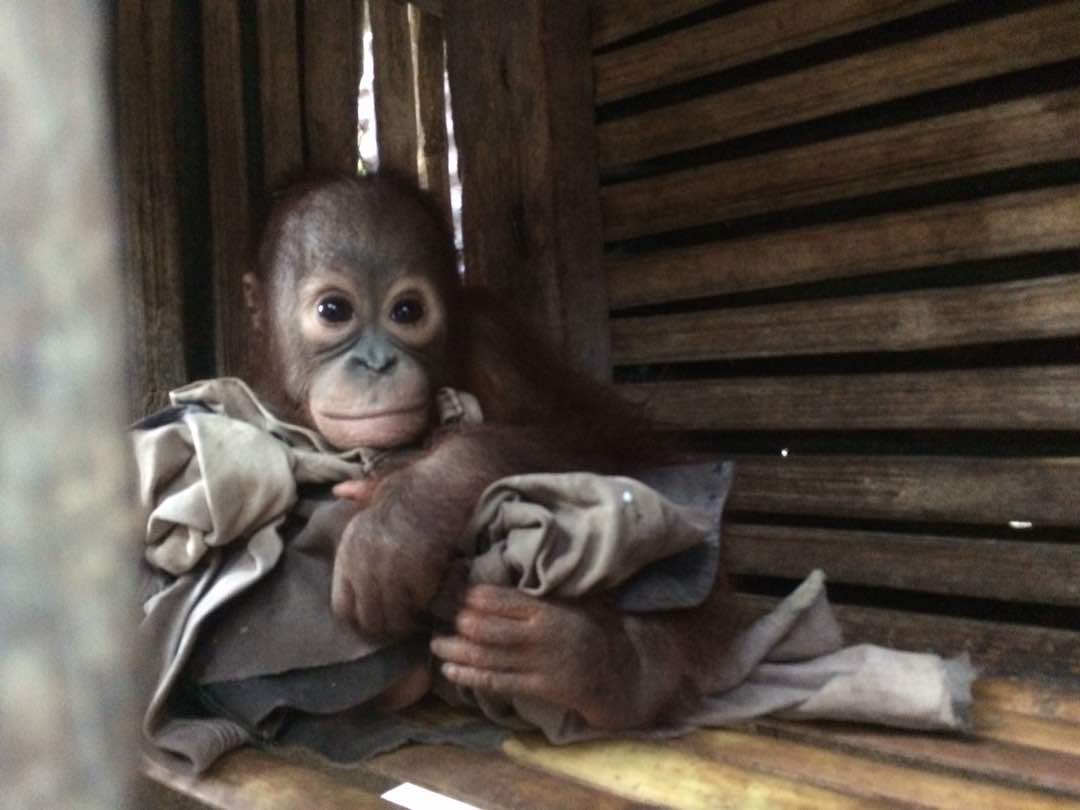 On 19th June 2017, BKSDA informed our field staff that they had just confiscated an orangutan from people who had been keeping it as a pet in a nearby village. This orangutan was entrusted into the care of the Orangutan Foundation.
On 19th June 2017, BKSDA informed our field staff that they had just confiscated an orangutan from people who had been keeping it as a pet in a nearby village. This orangutan was entrusted into the care of the Orangutan Foundation.
The male orangutan was named Bumi (which means Earth in English) and was estimated to be about 3 and a half years old.

Our vet checked Bumi’s health and overall condition, which proved quite difficult as he wouldn’t stay still! He was anesthetized as it was vital that he was looked over thoroughly for any injuries or illness.
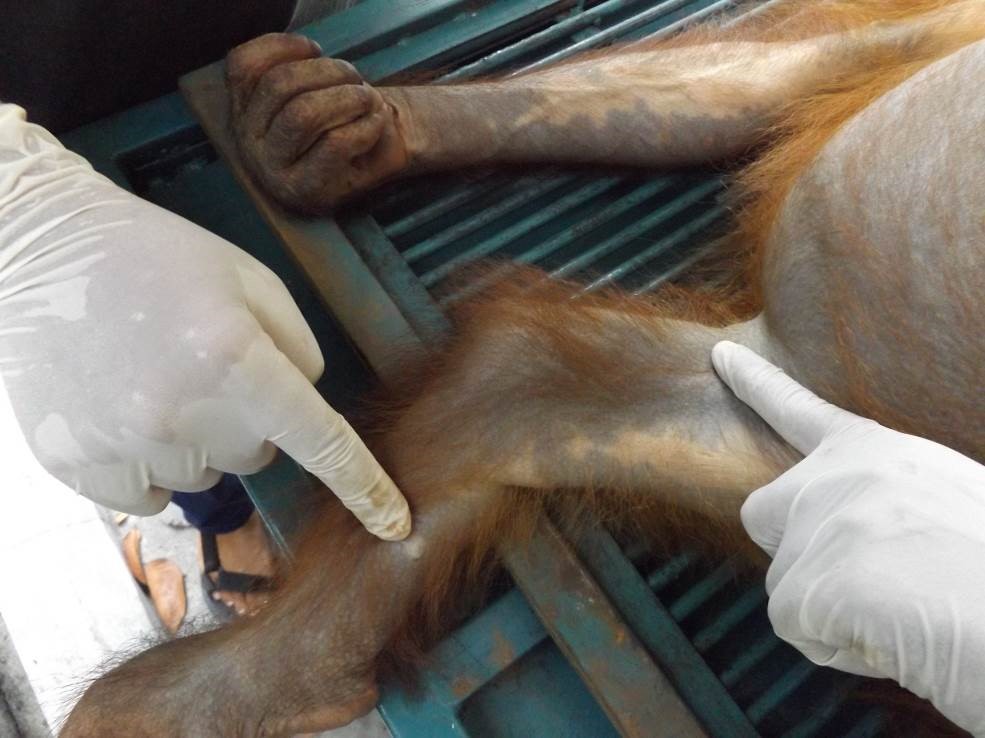
During the assessment, bullets were discovered in Bumi’s body. We are uncertain of the origin of the bullets, but it is likely a result of people attempting to shoot the mother to obtain the infant.
This, tragically, is how most orangutans enter our Soft-Release Programme.

In total, 7 bullets were removed from Bumi’s body. Bumi was given health supplements, and once he’d recovered from the operation, he was ready to join our Soft-Release Programme.
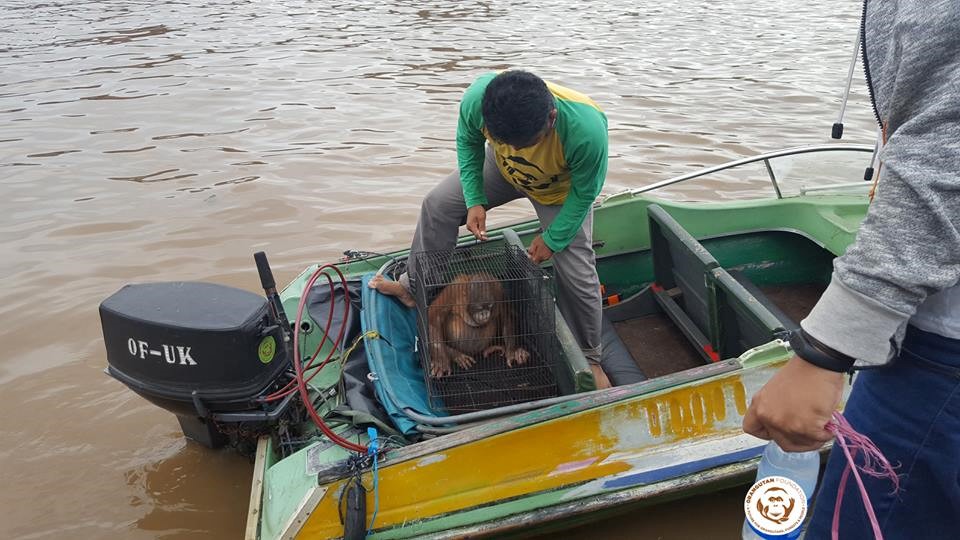
Bumi was taken to Camp Rasak in the Lamandau Wildlife Reserve, Indonesian Borneo. Here he will be cared for alongside Endut, an orangutan of a similar age also rescued from being kept as a pet last March.
Staff report that since settling in Bumi appears to have a good appetite and has already displayed nest-making skills.

Watch this clip to see Bumi showing off his skills:
Please DONATE today to support the progress of Bumi and the other orangutans currently in our Soft-Release Programme.



